FALUDI BLOGGING Chasing Territorialism
short essays by
 Andreas Faludi
Andreas Faludi
 Edited by Andreas Faludi & Roberto Rocco
Edited by Andreas Faludi & Roberto Rocco

 Andreas Faludi
Andreas Faludi
 Edited by Andreas Faludi & Roberto Rocco
Edited by Andreas Faludi & Roberto Rocco
THIS BOOK GATHERS SHORT ESSAYS (BLOGS) WRITTEN BY EMERITUS PROFESSOR ANDREAS FALUDI, FROM 2018 TO 2021 FOR THE WEBSITE HTTP://WWW.SPATIALPLAN NINGTUDELFT.ORG OF THE SPATIAL PLANNING AND STRATEGY GROUP OF THE DEPART MENT OF URBANISM, TU DELFT.
KEYWORDS: EUROPEAN SPATIAL PLANNING, TERRITORIALISM, NEOMEDIEVALISM, COVID CLOSURES, WESTERNS BALKANS
EDITED BY ANDREAS FALUDI & ROBERTO ROCCO
PUBLISHED BY TU DELFT OPEN PUBLISHING | DELFT UNIVERSITY OF TECHNOLOGY, THE NETHERLANDS
ISBN/EAN: 978-94-6366-577-3 DOI: HTTPS://DOI.ORG/10.34641/MG.41
THIS WORK IS LICENSED UNDER A CREATIVE COMMONS ATTRIBUTION 4.0 INTERNATIONAL (CC BY 4.0) LICENCE © 2022 PUBLISHED BY TU DELFT OPEN ON BEHALF OF THE AUTHORS
THE ELECTRONIC VERSION OF THIS BOOK IS AVAILABLE AT HTTPS://BOOKS.OPEN.TUDELFT.NL/HOME/CATALOG/BOOK/41
DESIGNED BY ROBERTO ROCCO
COPYRIGHT CLEARANCE MADE BY THE TU DELFT LIBRARY COPYRIGHT TEAM
EVERY ATTEMPT HAS BEEN MADE TO ENSURE THE CORRECT SOURCE OF IMAGES AND OTHER POTENTIALLY COPYRIGHTED MATERIAL WAS ASCERTAINED, AND THAT ALL MA TERIALS INCLUDED IN THIS BOOK HAVE BEEN ATTRIBUTED AND USED ACCORDING TO THEIR LICENSE. IF YOU BELIEVE THAT A PORTION OF THE MATERIAL INFRINGES SOME ONE ELSE’S COPYRIGHT, PLEASE CONTACT ROBERTO ROCCO AT R.C.ROCCO@TUDELFT.NL


On the face of it, coming from different parts of the world - Andreas from Central Europe and Roberto from South Americawe as the editors may seem unlikely bed fellows. However, we share our accultur ation to a welcoming Netherlands and the Delft University of Technology, where we are part of the same group called Spatial Planning and Strategy (SPS) at the Department of Urbanism. Roberto holds an associated professorship and Andreas, as the emeritus that he is, that of a guest researcher. Perhaps more importantly, we share a passion for understanding how States organise themselves and the lives of their citizens, in great part by way of managing the territory where they live and, in so doing, drawing the borders that separate them.
Above all, Andreas vouches for Roberto’s consistent encour agement ever since he set the first, tentative steps into the world of blogging, and Roberto to Andreas’ commitment to discuss ing territorialism, a topic that he, Roberto, found of the utmost actuality. Being a student of socio-technical systems, Roberto understood territorialism as one of the many technologies avail able to states in organising (and controlling) their citizen’s lives, this being precisely what Andreas problematises.
Moreover, for Roberto, territorialism is high on the agenda of sustainability studies. The reason is obvious: control over the world’s resources, to which all humans should have fair access, is still firmly – but arguably wrongly – subject to the sovereign control of nation-states and as such encased within their bor ders. So conceived, territorialism underscores the “tragedy of the commons” thesis as formulated by Garrett Hardin (1968). In short, this is illustrated by a thought experiment which conceives of available resources as a lifeboat in the middle of the ocean. This lifeboat accommodates only 10 people but is surrounded by 100 people who are drowning. According to rational choice theory, which dictates that individuals make choices based on their self-interest first, if left to their own devices people would try to get onto the lifeboat at all costs, inevitably sinking it.
Naturally, the “life-boat hypothesis” has direct bearing on resource management: If left unregulated, resources will be depleted by people mindlessly exploiting them for their own ben efit. From Hardin's perspective, this analogy underscores the role of the State (and of private property) in preventing the overuse and depletion of resources. The State, according to Hardin, is there to protect "our" resources from being pillaged by others .
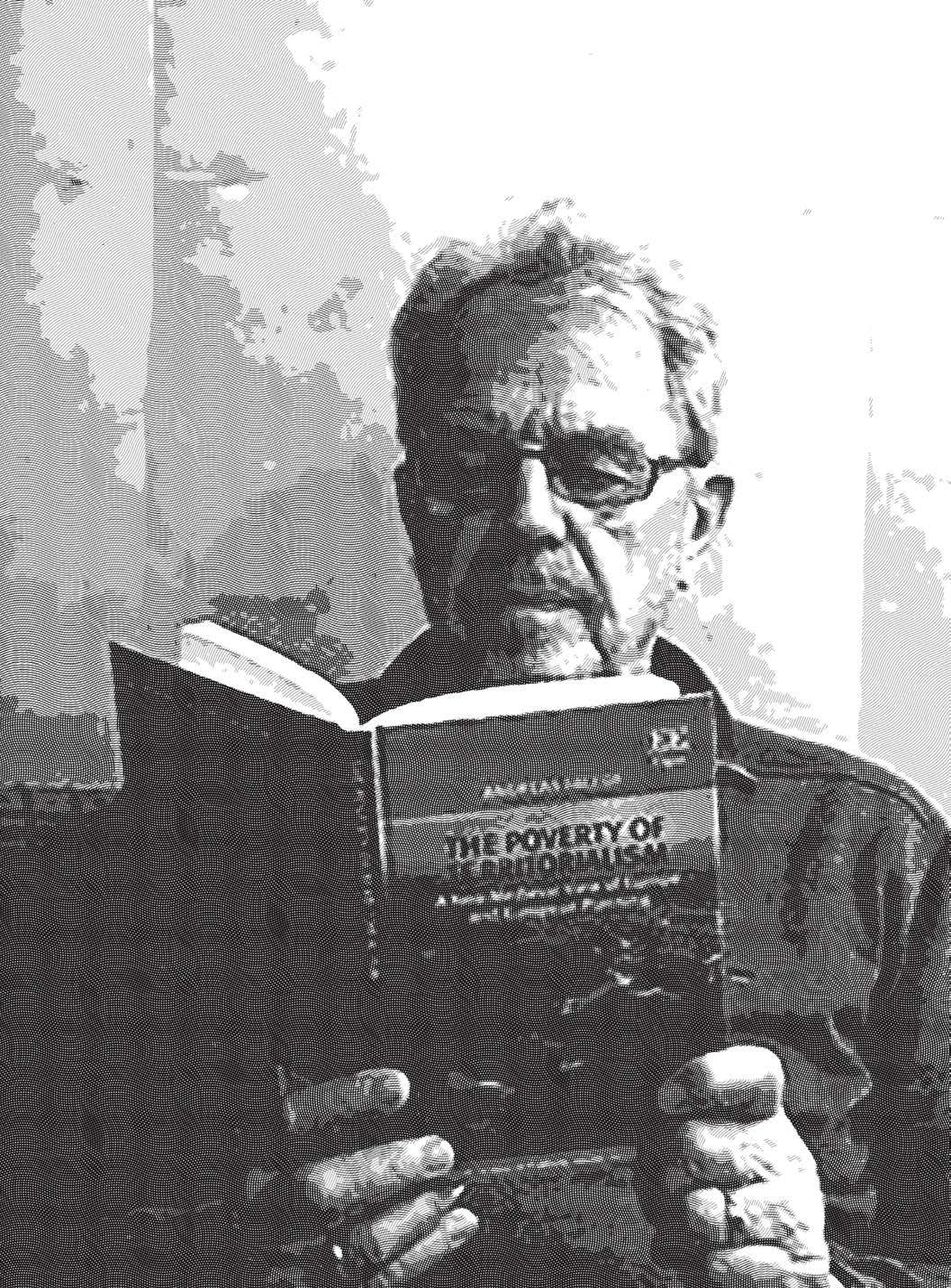
Fortunately, Elinor Ostrom and others have demonstrated that rational choice theory is not the only logic that guides human behaviour. Cooperation, solidarity, and mutual care can also guide behaviour and help with regulating the use of resources. There is no lifeboat lost at sea, surrounded by 100 desperate human beings in danger of losing their lives. We are all in the same boat, planet Earth, with increasingly depleted resources and a climate crisis reaching a tipping point. It makes no sense to look at resources only from a national (territorial) point of view, as we live in one planet with limited resources.
Which is why re-visiting territorialism and border manage ment seems of the utmost importance, also for long-term sustain ability and a just distribution of our world’s resources, with the hope for planetary stewardship of our most precious resources and natural landscapes glowing in the background.
As indicated, with their different backgrounds, Andreas and Roberto became partners in blogging, with Roberto encourag ing Andreas to publish more and more, certain that the sum of the texts published sometimes weekly would amount to an agile and dynamic discussion on territorialism. Indeed, to Andreas blogging became a habit, nay an obsession, driven by the grow ing conviction that territorialism in all its manifestations – next to the depletion of planetary resources in particular the rise of populism – was a ‘clear and present danger’. Signs are plentiful, with many more potential entries featuring in Andreas’ notes than could and would eventually become the topics of blogs. He simply had to be economical about which leads to pursue and which to set aside. Doing blogs was, after all labour intensive, the more so since Andreas was trying to give a balanced view –and where possible strike a light note to boot.
In the first instance, the idea to collect the blogs appear ing on the SPS website (http://www.spatialplanningtudelft.org/ category/Andreas-faludi/) - and coincidentally also on Andreas’ page on ResearchGate (https://www.researchgate.net/profile/ Andreas-Faludi) - was Roberto’s, pointing out that the Library of Delft University of Technology offered great help in produc ing electronic publications.
So, after Andreas’ several rounds of editing and after he sorted the blogs into sections with a short introduction each, Roberto got into his own with the book design and image research.
If the truth be told, we were toying with “Book of Blogs” as the – snappy – title and, just so as to indicate what it was about with some reference to territorialism in the subtitle. However, besides being snappy, main titles should also and in particu lar be informative. So, we decided on 'Book of Blogs: Chasing Territorialism’.
We hope that the ambiguity in talking about chasing it will
not escape the reader. One chases something that is intriguing, but one can also chase away what is annoying, dangerous even. It may not be immediately obvious, but so much of what we see and experience around us, not only in planning but also and in particular in politics high and low, is after all shaped by one basic, but erroneous assumption: that we live in – and act in – closed, and thus easily identifiable territories. And that, furthermore, nothing can be done about it. So: “Chasing Territorialism” seemed to fit the bill but, just to remind the reader of the origin of this collection of, hopefully poignant observations, “Book of Blogs” has become the subtitle
Andreas Faludi Roberto RoccoDelft University of Technology February, 2022
Hardin, G. (1968). The Tragedy of the Commons. Science, 162 (3859), 1243-1248. Ostrom, E. (2010) Working Together: Collective Action, the Commons, and Multiple Methods in Practice, published by the Princeton University Press. Ostrom, E. (1990). Governing the Commons: The Evolution of Institutions for Collective Action. Cambridge University Press.
Coming from studying Dutch planning, more in par ticular the remarkable success of Dutch national planning in the 20th century, my research over the past quarter-of-a-century or so has been on European spatial planning. It did not take long to realise that, even if there were such a thing, it would be unlike the rare example of Dutch national spatial planning nor any conventional local and/ or regional planning, thus, unlike the ordering of spatial develop ment in a given territory. Whether the EU has a territory to look after is, after all, an open question. This recognition has taken to exploring a wide range of issue related to the nature of the EU. This in turn took me into exploring the concept of a state as having a territory with well-defined borders which it is sup posed to administer on behalf of its people. It is this very con cept that ‘The Poverty of Territorialism’ (Faludi 2018) questions.
The blogging started during my last stint as a visiting pro fessor at Vienna University of Technology, my alma mater in the 1950s and 1960s. First, I simply wanted to inform colleagues about the stages of publishing the book, and this the more so when I actually held the first copy in my hands and was eagerly waiting for reviews. (For the reviews see the Appendix)
The issues that I had been trying to problematise did not go away. In fact I received news and information enforcing ideas as articulated in my book. Encouraged by Roberto Rocco adminis tering the blogs of the Department of Urbanism where – being an emeritus now – I am still allowed to continue as a guest researcher, I started reporting and commenting on events, publi cations and other sources relating to territorialism. In fact, given the massive investment in it, territorialism represents a danger. The first section below, ‘The Future of European Spatial Planning’, contains blogs gravitating around this issue.
The next section, ‘Borders’, is about them as the main instru ments of territorialism. To give a more immediate flavour to the issue of borders, there is a special section on ‘COVID-19 Closures’. It illustrates how and where the pandemic touches upon European integration in a situation where its member states rather than the EU take pride of place.
The section on ‘Territorialism’ gives illustrations of this core concept and where and how member states stick to it. Because this is so, if only to various degrees, member states are prone to accede to populism. The next one on ‘Sovereignism’ looks at the ideas behind territorialism. They lead member states of the EU insisting on remaining more or less independent. That this
does not meet the exigencies of our times seems plain. This is followed by a section singing the praise of the alternative which, drawing on Zielonka (2014) amongst others, I describe as ‘neomedievalism’.
The last section takes me to where I started considering what to do after having published ‘The Poverty of Territorialism’. A chance invitation to speak at Tirana made me reconnect with this fateful part of Europe. The ambitions and perspectives of the six remaining Western Balkan states not yet members of the EU is to join. The process is, and will continue to be long and messy, with interim arrangements, derogations, partial agree ments and so forth. Why not make do with – perhaps we had better say: continue to do with – provisional arrangements? In other words, why not embrace neomedievalism? That this is not meant to be derogatory, as if the Western Balkans were still in the middle-ages, whereas ‘we’ had reached an elevated stage of enlightenment should be clear from my recommendation to embrace neomedievalism for the future of the whole of Europe.
The Appendix concerns the reviews of ‘The Poverty of Territorialism’ published so far and there is of course a compila tion of the sources on which I draw.
As far as the future of ‘Europe’ – the EU – is concerned, European spatial planning is of little consequence. But if you wish to learn why European integration is a conundrum, it is decidedly helpful to look at its past and present state. At least this is how it has worked for me, innocent as I had been about European integration when I started. One of our earliest projects we dubbed something like – the work was in Dutch – ‘Sights Set on Brussels’ (De blik gericht op Brussel, Zonneveld, Faludi 1998). Which was presumably – I have no recollection of what we thought – based on the strength of the argument that European integration was a good thing now and in the future.
I was to be disappointed. (Faludi 2020, 2021) Not that I had been totally naïve. With a study of what we called 'Dutch planning doctrine' (Faludi, Van der Valk 1994) under my belt, I divined already at a time of the Europe of 12 and soon 15 that to expect a European planning doctrine like the Dutch would be ‘a bridge too far’. (Faludi 1996) But I felt that mutual learning and networking would spell a brighter future. My paper ‘A rov ing band of planners’ (Faludi 1997) gained some notoriety for putting this positive spin on it, but almost two decades on in 'EUropeanisation or Europeanisation of spatial planning?’ (Faludi 2014) I mooted that learning was perhaps all we should expect.
In all this, the Union construct, and the role of member states in it became my focus of attention. Relations have become ever more conflictual. Even in the guise of promoting what is called territorial cohesion, European spatial planning is anything but a going concern. Gaining an idea of where spatial development is heading – let alone of steering it – has become illusionary. You only have to look at areas of much greater import, like dealing with COVID-19, migration and defence to realise why: Relations of the EU and its members – and of members states amongst each other – are non-conducive to pursuing common policies.
In ‘The Poverty of Territorialism’ (Faludi 2018) I have tried to explain why, claiming that, out of necessity, states were fix ated on their territories. So, as presently constituted, they are ill-suited for dealing with an interconnected world.
Which does not mean to say that there is nothing happen ing in terms of European planning. In fact, players are plentiful, not the least one amongst them the European Spatial Planning Observation Network (ESPON), itself the result of initiatives taken by those involved in preparing the European Spatial Development Perspective (ESDP; see Faludi, Waterhout 2002) ‘European Week of Cities and Regions’ below reports on a meeting discussing an
ESPON project intending to stimulate thinking, amongst oth ers about the next ‘Territorial Agenda 2030’2 , successor to the Territorial Agenda of 2007 and its first update, the Territorial Agenda 2020, with once again – they had already taken the lead at the first occasion – planners from the Federal Republic holding the baby.
The briefest of explanations for this, not exactly brilliant state of affairs must suffice: The aspirations in the 1990s of the European Commission for the ESDP had been for this document to become a strategic framework for administering, above all its regional, or what is now known as Cohesion policy. Conflating this with spatial planning, the Germans had pointed out how ever that this was not within the Community’s gift. There was no, what is called a Community competence: an article in the European Treaty allowing the Commission to take relevant ini tiatives. Member states followed the German reading and kept the ESDP for themselves. But they did not have the resources to pull this through. Instead, for logistic support they had to rely on the very Commission they had shunned.
Disillusioned, the Commission introduced the notion of territorial cohesion into the, as it would turn out moribund Constitutional Treaty. This was in the mid-2000s. By the time territorial cohesion did get on the statute book – December 2009 – the EU agenda had changed, with increasing Europe’s competitiveness taking centre stage. Territorial cohesion had become – and continues to be – next to irrelevant.
Other than the title suggests, the next blog (‘I May Have Betted on the Wrong Horse’) does not strike a pessimistic note. It intimates that, rather than following the making of the ESDP and its various follow-ups, I should have focused on the less spectacular, but more insistent efforts at promoting cross-border cooperation. The Handbook on Cross-border Cooperation dis cussed in this next blog documents the rich experiences gained by practitioners and academics alike. These are bottom-up ini tiatives and as such safe from the vicissitudes of European inte gration. Such cross-border cooperation is a worthy task for plan ners with a practical bend.
‘Europe Day: Myth and Reality’ casts light on what really happened on 9 May 1950, celebrated as it is as the starting point of European integration. Yes, but what kind of integration? Not a federal Europe, the nightmare, it seems, of many. In fact, other than its enthusiasts make us believe, the idea was, not to inte grate the future members of what became the Coal and Steel Community. It was merely to promote functional integration and to let experts in the matters get on with the job. Not at all taken by politicians – but in his memoirs he gives evidence of
understanding their predicament which is having to answer to local constituencies – its spiritual father was Jean Monnet who had never held elected office himself. Anyhow, rather than let ting the experts get on with it, within no time the governments of the future members of the Coal and Steel Community insisted on having the ultimate say. Which is how the present dual struc ture of the EU, with an expert Commission and a Council of Ministers was born.
The Coal and Steel Community started working on 1 January 1952, with Jean Monnet the President. Eventually, he would leave his post and set up the Action Committee for the United States of Europe, obviously something else than functional integration.
The blog ‘An Alternative Path to European planning?’ dis cusses the role of Dutch planners. Post-war, their ambition had been to make good on their promise of developing national plan ning. But they were met with scepticism. So, when the European Economic Community came in view, the planners put their hope on it taking on planning. The Treaty of Rome, however, goes no further than paying lip service to the harmonious development of the Community territory. So, Dutch planners were seeking to demonstrate the virtues of joint planning in the densely popu lated area of North West Europe. The organisation presided over by the Dutch planning director lasted for longer than could have been expected. Eventually, it was overtaken by other initiatives more directly related to the budding European Community.
As the title suggests, ‘Europe Day Revisited’ returns to the Union’s foundational myth, reiterating that the Schuman Declaration was anything but the signal for creating a super state. Rather, it was crafted based on pre-war and wartime ideas close to corporatism and as such opposed to democratic gov ernance as we know it. Which does not mean to say that we should dismiss them out of hand. As suggested in ‘The Poverty of Territorialism’ and in many of my blogs, we need to cast a critical eye on conventional ideas about what I like to call the ‘production of democratic legitimacy’. As all human constructs, this one, too, has its shortcomings, and we should be open to discussing alternatives. This the more so since it is plain that, adapting to a complex and evolving situation, we need complex answers. Everybody to himself and for himself, as under a crude form of nationalism is not the way.
Talking about nationalism, this was condoned and even promoted by President Wilson announcing the principles on which to base the settlement after the Great War: to release subject peoples from the ‘Prison of Nations’ formed by defunct empires. (‘A “Prison of Nations”?’) Point is, the nations were in fact mixed to a degree that made disentangling them next to impossible. Ironically, the only new states that emerged which were more or less homogeneous where the two successors to
the Austrian-Hungarian Monarchy and to the Second German Empire. Not that any one of them liked the outcome: Austria in fact wished to join the new German Republic under its socialist chancellor. Losing more than half of the territory over which the Hungarian part of the monarch had wielded power, Hungary, too, emerged homogeneous alright, but there were large Hungarian minorities – in fact millions – left in the states surrounding it.
BORDER AGREED BETWEEN THE HABSBURG EMPIRE AND THE DUTCH REPUBLIC AT THE END OF THE WAR OF THE SPANISH SUCCESSION. THIS PHOTO OF MOVABLE HERITAGE HAS BEEN TAKEN IN THE BRUSSELS CAPITAL REGION, BY HISPALOIS, CC BY-SA 4.0. SOURCE: HTTPS://COMMONS.WIKIMEDIA.ORG/W/INDEX. PHP?CURID=111048059

As usual, the 2019 European Week of Regions and Cities had thousands of visitors. On and off, I used to have an input. On this occasion, I merely attended one event: a workshop on 'A new territorial narrative for the future of Europe'. It concerned an ESPON flagship project on a European Territorial Reference Framework (ETRF) identifying challenges and trends and build ing scenarios for the future development of Europe.
I had been a member of the Strategic Advisory Forum. The work was impressive, but I had been sceptical about it fulfilling its stated purpose of informing the update of the Territorial Agenda, a task which the German presidency of 2020 had taken upon itself. As an observer of the making of the Territorial Agenda and its successor, the Territorial Agenda 2020 (much as of their predecessor, the European Spatial Development Perspective) I doubted whether the owners of the Territorial Agenda – EU member states – would have the capacity, let alone the willing ness to take on the messages of the ESPON report.
Whether my pessimism is to the point is for the future to decide. The point man of the team for the German Presidency preparing the Territorial Agenda 2030, himself new to the job after his predecessor seasoned in matters European had joined the German Permanent Representation in Brussels put a brave face to it. Undoubtedly, drawing on the expertise of the Federal Institute for Research on Building, Urban Affairs and Spatial Development, Germany will make a good job of it, but who is going to pick up from there?
Before returning to my doubts, at the event too much time was devoted to speeches from representatives of stakeholders, the likes of the Vice-President of the Committee of the Regions, the Chair of the REGI Committee of the European Parliament, dealing with EU regional policy and the Deputy-director General of Regional and Urban Policy. None of them could realistically have been expected to have studied the ESPON report as we on the Strategic Advisory Forum had. To present its content was left to the representative of the lead partner, Andreu Ulied, Director-general of Mcrit, a consultancy based in Barcelona, and to the chair of the Strategic Advisory Forum, Professor Jacek Szlachta from Poland. Remaining time for discussion was very limited, however.
Now, I feel free to say something that I had already said
during meetings of the Strategic Advisory Forum: there has been insufficient regard to the context in which the outcome of the thorough analyses and future scenarios might – or might not – be applied. In fact, there does not seem to have been much awareness of the fragile inter-governmental context of preparing yet another Territorial Agenda. To put a positive spin on it, the broad, searching and innovative ESPON report might be put to better use if the European Commission were to take heed of it.
In this one respect, the workshop was hopeful, with Normunds Popens from the European Commission seeing pos sibilities in relation to proposed new Objectives 4 and 5 of Cohesion Policy: a more Social Europe, delivering on the European Pillar of Social Rights and supporting quality employment, educa tion, skills, social inclusion and equal access to healthcare, and a Europe closer to citizens, by supporting locally-led development strategies and sustainable urban development across the EU. This against the backdrop of a recognition, also and in particular in the ESPON report on a European Territorial Reference Framework, of certain areas experiencing much social exclusion as an issue.
In fact, the – fragile – planning establishments of mem ber states (forming a Network of Territorial Cohesion Contact Points, the (at the time of writing) latest meeting having been held in Helsinki on 11/12 September 2019) may not be the most obvious target group. This is simply so because, much as its pre decessors, a new Territorial Agenda, if indeed one such comes about, seems an unlikely candidate to shape European policy.
Even at Brussels, the effect of the Reference Framework will be diffuse at best. The most obvious candidate for taking it further, the Directorate-general for Regional and Urban Policy, is but one out of 33 such units. If truth be told, Europe's terri tory is an unlikely object of their common concern. And even DG Regional and Urban Policy often has other issues to worry about, like the size of the future Cohesion policy budget. So, why should its major concern be the EU territory overall?
So, is territory a meaningful object of analysis and action? And, if so, why? A good reason might be because the EU has overall responsibility: The EU treaty after all commits it to safe guarding the consistency of its policies. Which is why, to make sure that various policies with spatial impact do not interfere with each other could be a reason. But is it not more realistic to see the EU (indeed any government, but this is not the issue here) not as a coherent body pursuing consistent policies but rather as a conglomerate of policy areas, thus as a body with no defi nite shape to it? I find the latter view more plausible.
Which is not to say that the cloud of – overlapping – ter ritories in and around the EU – each on its own and in their mutual interactions – should not be scrutinised. This may in fact be all that could realistically be expected from an EU which will
never be the super-state which its detractors paint on the wall. Nor is the reason that member states are all that counts. No, the reason is that we can no longer carve up the world into neatly defined territories, not on the national nor on the regional or local level. Which makes it even less likely that anything like a coherent supra-national government might emerge. In fact, even thinking in such terms seems counter-productive.
My infatuation with planning at EU level may have been at the expense of due attention to cross-border cooperation. It could have gone the other way. One of my first interviews has been with Viktor Freiherr von Malchus, the German pioneer of cross-border coopera tion largely through the Council of Europe. But instead of following up this lead, I grasped the opportunity of tagging on to a former stu dent and dear friend of mine, Derek Martin, from his vantage point at the Dutch National Spatial Planning Agency taking a hand in ‘The Making of the European Spatial Development Perspective’ (Faludi, Waterhout 2002). The focus was on the European Community, soon to become the European Union. Taking me to the lofty heights of integration theory has eventually made me question the role of the state and its ‘territorialism’ (Faludi 2018). In the course of which Jean Peyrony of DATAR (Délégation à l'aménagement du territoire et à l'action régionale) and now of MOT (Mission Opérationnelle Transfrontalière / Transfrontier Operational Mission) encouraged me to read more French and eventually to refocus on cross-bor der cooperation.
From her vantage point as the ideal-typical nation state, France makes a self-conscious effort to conceptualise and prac tice cross-border cooperation, in particular – though of course not exclusively – with Germany. This in the same spirit – witness the Elysée Treaty and the Treaty of Aix-la-Chapelle (Aachen) – in which she has worked for reconciliation by means of the ‘deconstruction of the Rhineland Frontier’. (Loriaux 2008) No wonder that there is much relevant action – including research – along this axis accom panied by the emergence of cross-border identities. German-French Birte Wassenberg, Professor at the Université de Strasbourg offers many examples. (For her personal story see: Wassenberg, 2020) With Bernard Reitel in collaboration with Jean Peyrony and Jean Rubio she has edited a vast collection documenting relevant expe riences. (Wassenberg, Reitel 2020) Extensive introductions and an afterword on COVID-19 spearheaded by Reitel, Professor at Artois University, a network devoted to cross-border cooperation spread over several medium-size towns of the Nord-Pas-de-Calais Region and the Walloon Region of Belgium apart, the volume comprises often multiple entries by 124 authors. They include a modest one by myself on ‘Spatial Planning’.
To even attempt to review 859 pages of material would seem pretentious. I merely draw attention to this invaluable source. 3 FIRST PUBLISHED 5 JANUARY 2021.
Europe Day is little known. I have been invited to speak at the occasion in would-be EU candidate member state Albania. (See ‘Europe Day in Tirana’ in the Section 7 ‘The Western Balkans’) On advice of Jean Monnet, ‘First Statesman of Interdependence’ (Duchêne, 1994) on that day – 9 May 1950 – French foreign minister Robert Schuman proposed the joint management of French and German steel and coal production. (Cohen 2012) No sooner the word was out, and governments demanded to be put in charge of overseeing the work of the experts involved. What were Monnet and his French advisers with pre-war and war-time experiences thinking? The fact that France had been riddled with political rivalry had contributed to her defeat in 1940. Unsung, the Third Republic had made room for an authoritarian regime bearing the name of Vichy, after the spa town where it established itself in the – just about because it, too, was occupied in 1942 – ‘free’ French zone. The regime was supported by factions rejecting la République, even a centuryand-a-half after its creation. There was also the pre-war intellec tual fervour – by no means only in France – of Christian think ing about a third way between capitalism and communism. In addition to which, generally speaking, experts were frustrated with pre-war politics. This feeling was shared by the multitudes supporting Marshall Philippe Pétain heading the new regime. Eventually victorious – albeit with American and British assis tance – De Gaulle’s puny ‘Free French’ forces had been a fringe phenomenon at the time. (Gallo 1998)
Cohen discusses an elite training centre called Uriage with links to the Dominican order meant to train functionaries for the new regime. With links to the fledgling Résistance, it came to an early end, but relevant discussions continued. Ravaged once more by party-politics, the post-war Fourth Republic contin ued to provide a fertile ground for dreaming about alternatives. Aloof from party politics as he was, Jean Monnet in charge of the Commissariat Général du Plan pursued one such alternative. He drew on actors in the field, including company bosses and the unions – Jacques Delors would later speak about the forces vives – advising on industrial recovery. But France depended on German coal delivered under an occupation regime. Now, when the Federal Republic was readmitted to the community of (Western) nations, this arrangement had become unsustainable. 4 FIRST PUBLISHED 5 JUNE 2021.
This formed the backdrop to the Schuman Plan foreseeing in mutual cooperation.
Monnet’s advisors in formulating the plan came from prewar and war-time movements propagating a guided economy. This chimed well with German pre-war, and even more so war time thinking in terms of Großraumwirtschaft (Scheuplein 2009) – an economy unshackled from borders. That none of the spiritual fathers of the Schuman Plan savoured government involvement explains their – vain – resistance to what happened during the negotiations that followed. They had reason to complain: ‘What remains means nothing less than that the declaration of May 9, 1950 has for all intents and purposes disappeared’5. So much for celebrating Europe Day! In assuming responsibility, governments of course needed to do no more than invoke their democratic mandates. ‘The issue of democracy is thus at the heart of the European construct’, Cohen concludes6. Yes, but does this always and necessarily mean elected governments being supreme?
5 IL N’EN RESTE PAS MOINS QUE LA DÉCLARATION DU 9 MAI 1950 A BEL ET BIEN DISPARU. (COHEN 2012, 420).

6 LA QUESTION DÉMOCRATIQUE EST DONC BIEN AU COEUR DE LA CONSTRUCTION EURO PÉENNE. (COHEN 2012, 421).
THE FUTURE OF EUROPEAN PLANNING
At an International Planning History Conference at Delft, Wil Zonneveld and I heard Andrew Sorensen on historical institutionalism. Soon, we had papers in his special issue of ‘Planning Perspectives’. The one by Zonneveld (2018) was on the Conference of Spatial Planning in North-Western Europe (CRONWE) expanding on, amongst others, Dühr and Zonneveld (2012) on the imagery of a North West Europe metropolis. But national policy makers are wedded to thinking of nation-states as being bordered, so this was without much effect.
One-time Dutch national planning director Jasper Vink had an abiding interest in North West Europe, identifying Dutch ports as continental gateways together with an emergent mega-struc ture comprising of the Rhine-Ruhr Area, the Randstad Holland and the urban agglomerations of Belgium and the North of France. (Vink 1966, 1219) Upon retiring, he presided over CRONWE. His predecessor Frits Bakker Schutt’s idea, enjoying a ground swell of support had been rather to annex German territory –perhaps up to and including Cologne – by way of war reparation. But Germany had seemed more important as a future trading partner, so eventually the government ditched the idea.
There were more reasons for cooperating, like German coal. Prodded by the US, the French held their noses and acceded to integrating Western European coal and steel production. The development of a transnational industrial basin seemed to require coordinated planning. But the Dutch planners’ idea about planning at the European level failed to resonate, even with the Dutch government, let alone other signatories of the Treaty of Rome. To sustain their lobbying efforts, CRONWE was set up with its seat at Liège in Wallonia. Participants were national planning agencies and their counterpart in the Land of North Rhine Westphalia.
Zonneveld describes CRONWE’s development and even tual demise. He pays attention – his forte – to the role of images in conceptualising planning challenges. In so doing, CRONWE could draw on István Kormoss from the College of Europe. By that time, Jean Gottman had already coined the term megalop olis for the urban development from Boston to Washington. The Dutch were keen on a Northwest European equivalent making, so they thought, the need for, not only international, but also
Dutch national planning more evident. Which is why the first Dutch national planning memorandum features a map of pop ulation distribution in Europe. When yet again making the case for European planning, the argument would re-emerge. (Witsen 1991) Soon, I myself would turn my gaze on Dutch planners and their colleagues from other member states preparing the European Spatial Development Perspective.
Once more though, member states insisted on retaining control, and this continues to this day. Meanwhile, there are networks galore, like CRONWE has been, with METREX8 , the Delta Metropolis with its Dutch base9 and the STRING Network10 stretching from Hamburg to Oslo, all presented at last year’s European Week of Regions and Cities11. Are networks bypass ing ever so reluctant member states? 8
The announcement of Europe Day 2021 reminded me of my visit to Tirana. Polis University there had wanted to celebrate the then French Minister of Foreign Affairs, Robert Schuman invit ing Germany alongside with other countries to join what would become the European Coal and Steel Community. Presently, the day he announced this intention at a press conference – 9 May 1950 – is considered to be the birthday of the European Union. Luxembourg-born, Schuman had studied at various German uni versities including Strasbourg when it was, indeed, still German. Upon the Alsace returning to France, Schuman was elected to the Assembleé Nationale. When the Alsace was under German rule again, in 1940-1945, he was in prison, only to be re-elected thereafter. He was Prime Minister and as such present at the 1948 Amsterdam Conference leading to the Council of Europe. Also present was Konrad Adenauer on his way to become the leader of West Germany. Foreign Minister in one of the numer ous French governments thereafter, one thing Robert Schuman was not was the author of the Schuman Declaration.
That role fell to a ‘gang of four’: Jean Monnet (1976) and two experts with a past in the collaborationist Vichy regime: Pierre Uri – being Jewish, he had been in hiding for a while – and Étienne Hirsch. Paul Reuter joined as the legal expert he was. They between them drafted the proposal in a little more than a fortnight for the good reason of Schuman being scheduled to meet the foreign ministers of the senior World War Two allies, Great Britain and the United States in London on 10 May, 1950!
There is much to be said about this. Cohen (2012) gives a detailed account. Suffice it to say, in charge of French recon struction, Monnet was only too aware of the French economy being drip-fed by the Americans and relying on German coal to boot. For this very purpose, France had occupied the Saarland and was sharing in the exploitation of the German Ruhr. Wellconnected to the American Foreign Policy Establishment, Monnet knew that, with West Germany becoming a partner, this arrange ment had become unsustainable. The idea of this ‘Statesman of Interdependence‘ (Duchêne, 1994) was to administer coal and steel production jointly, in so doing preventing Germany from rearming unilaterally. Others were to be invited to join the duo.
But join what? Not a union of states but a functional organi sation! Monnet held elected politicians, if not in low esteem, then at least beholden to their constituencies. So that’s why he went for functional integration. Step by step, other functions might be added later: the Monnet Method. But, by the time the govern ments of the original six had heeded the invitation to join this
venture, they had made sure that they, and not the Commission of what was called the High Authority retained control. Which is where the paradox of a Union of states, each claiming sover eignty in its own right started.
Exploring what the ‘gang of four’ – Monnet and his collab orators – had really been up to takes you over the treacherous ground of the 1930s. Dismayed by the spectacle of parliamentary politics, several thinkers – not all of them Fascists – were looking for alternatives. Amongst those was corporatism, preached by the Vatican and practiced by some less-than-savoury Catholic regimes. Cohen (2012) parades a number of those thinkers. It is clear that they continued to have an influence: Nobody less than Jacques Delors, a Catholic socialist and representative of ‘personalism’ with roots in that period bears witness to this. Now that the European Union is in an impasse, there is a world to be won by exploring its origins.
DUTCH LAW APPROVING THE FOUNDING TREATY OF THE EUROPEAN COAL AND STEEL COM MUNITY NATIONAL ARCHIVES, THE HAGUE, QUEEN'S OFFICE [PERIOD 1946-1975], ACCESS NUMBER 2.02.20, INVENTORY NUMBER 10123 . PUBLIC DOMAIN. SOURCE: HTTPS:// WWW.NATIONAALARCHIEF.NL/ONDERZOEKEN/ARCHIEF/2.02.20/INVENTARIS?
THE FUTURE OF EUROPEAN PLANNING
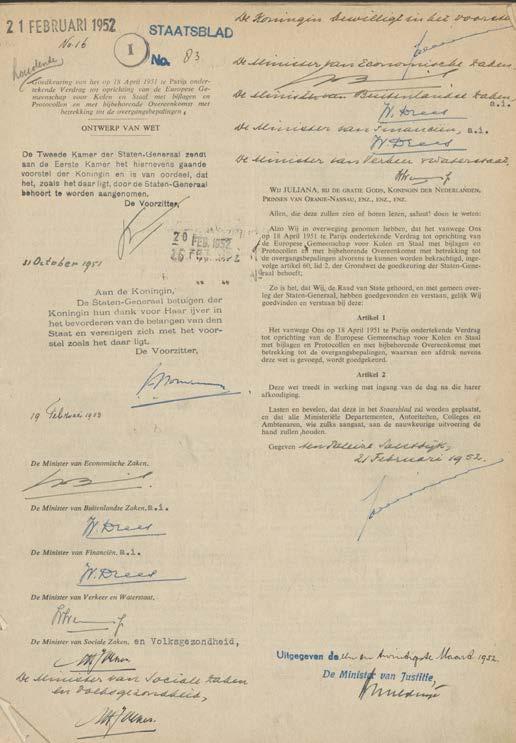
Hungarian Minister of Justice, Judit Varga (2021), was not amused by the Rule of Law Report (European Commission 2021) challenging her country. She defended her country’s unwilling ness ‘…to allow the LGBT+ lobby into our schools and kindergar tens….’ With the European Parliament having won its battle for a bigger voice at the Conference on the Future of Europe (Sánchez Nicolás 2021), she expected the people to insist on the Union respecting ‘…the division of competences and national identity.’
She hoped — here it comes — that the people would express their views as to whether ‘…they want to be the subjects of an empire that advances its own political agenda in the name of artificially created groups.’ For added emphasis, she said: ‘We opt for smart integration — not forced integration — and reject every effort that brings about an empire driven by Brussels bureaucrats.’
There may come an occasion for discussing the pursuit for LGBT+ rights in the context of human rights campaigns worldwide. But this blog is about the figure of speech ‘Europe as Empire’, evoking memories of empires being denigrated as ‘prisons of nations’. Minister Varga may not in fact be aware, but this same figure of speech has played a role in the BREXIT debate. Then, the Conservative member of the House of Lords of Downton Abbey fame, Julian Fellowes invoked it. He ‘…called for Britain to leave the “autocratic” and “anti-democratic” European Union’, compar ing it with ‘…the Austro-Hungarian empire, the collapse of which plunged the continent into the First World War.‘ (Hastings 2016)
For the record, it was not its collapse that plunged the conti nent into the First World War, but the other way round: The First World War caused the collapse of the, admittedly already totter ing Austrian-Hungarian Empire. But that’s just an aside. Rather, it is as regards its dismissal as oppressive that I beg to differ. Sure, it was complex. But above all, it favoured the Hungarians. Short of having gained full independence in a constitutional compromise reached in 1867, the newly minted Kingdom of Hungary got lee way to pursue the dream of a unified state. So, for all intents and purposes, their part of the Austrian-Hungarian empire became a nation-state and as such allowed to be, if you want oppressive of the more than half of its inhabitants that were not Magyars.
Not so with the Austrian parts. They continued to be a mul ti-national empire. So, the numerous nationalities other than the German speakers — much as the Hungarians in their part, a
minority — received consideration in matters of language rights and national culture.
Point is, in pursuing such liberal policies, the rulers of the Austrian part were often hindered by the Hungarians who, under the joint constitution had say in the matter, at least of structural reforms, and this also in the Austrian lands. So, there was no question of the Austrians being able to grant similar rights to the Czech people as had previously been accorded to the Hungarians. Not wishing for their own ethnicities other than the Magyars to ask for similar treatment, the Hungarians systematically opposed further devolution in Austria such as the heir apparent Franz Ferdinand — not exactly a friend of Hungary — was advocating.
So, the Austrian-Hungarian Empire as such, nor its Austrian half were oppressive; the Magyars in their virtual nation-state Hungary were. And, if the European Union bears comparison with the Austrian-Hungarian Empire, then on account of its looseness, not of its oppressiveness. For the sake of unity, it tolerated an irredentist, vigorously nationalistic Hungary. “Plus ça change, plus c’est la même chose”?
ETHNO-LINGUISTIC MAP OF AUSTRIA–HUNGARY, 1910, MAP BY ANDREIN, THE ETHNIC GROUPS OF AUSTRIA-HUNGARY IN 1910. BASED ON "DISTRIBUTION OF RACES IN AUSTRIA-HUNGARY" FROM THE HISTORICAL ATLAS BY WILLIAM R. SHEPHERD, 1911. THE CITY NAMES WERE CHANGED TO THOSE IN USE SINCE 1945. PUBLIC DOMAIN. SOURCE: HTTPS://COMMONS.WIKIMEDIA.ORG/WIKI/FILE:AUSTRIA_HUNGARY_ETHNIC.SVG
The ethnic groups of Austria-Hungary in 1910 according to Distribution of Races in Austria-Hungary by William R. Shepherd, 1911.
MAP OF THE EUROPEAN UNION NUTS 3 REGIONS, 2007. MAP BY EUROSTAT, CC BY-SA 2.5. NO CHANGES WERE MADE TO THE ORIGINAL FILE. SOURCE: HTTP://EPP.EUROS TAT.EC.EUROPA.EU/PORTAL/PAGE/PORTAL/GISCO/MAPS_POSTERS/MAPS
ELECTORAL DISTRICTS OF AUSTRIA AND HUNGARY IN THE 1880S. ON THE MAP OPPOSITION DISTRICTS ARE MARKED IN DIFFERENT SHADES OF RED, RULING PARTY DISTRICTS ARE IN DIFFERENT SHADES OF GREEN, INDEPENDENT DISTRICTS ARE IN WHITE. BY COUNT BÉLA KREITH AND GUSTAV FREYTAG, PUBLIC DOMAIN. SOURCE: HTTPS://M. BLOG.HU/PA/PANGEA/IMAGE/MONARCHIA.JPG, PUBLIC DOMAIN, HTTPS://COMMONS.WIKIMEDIA.ORG/W/INDEX. PHP?CURID=79650069

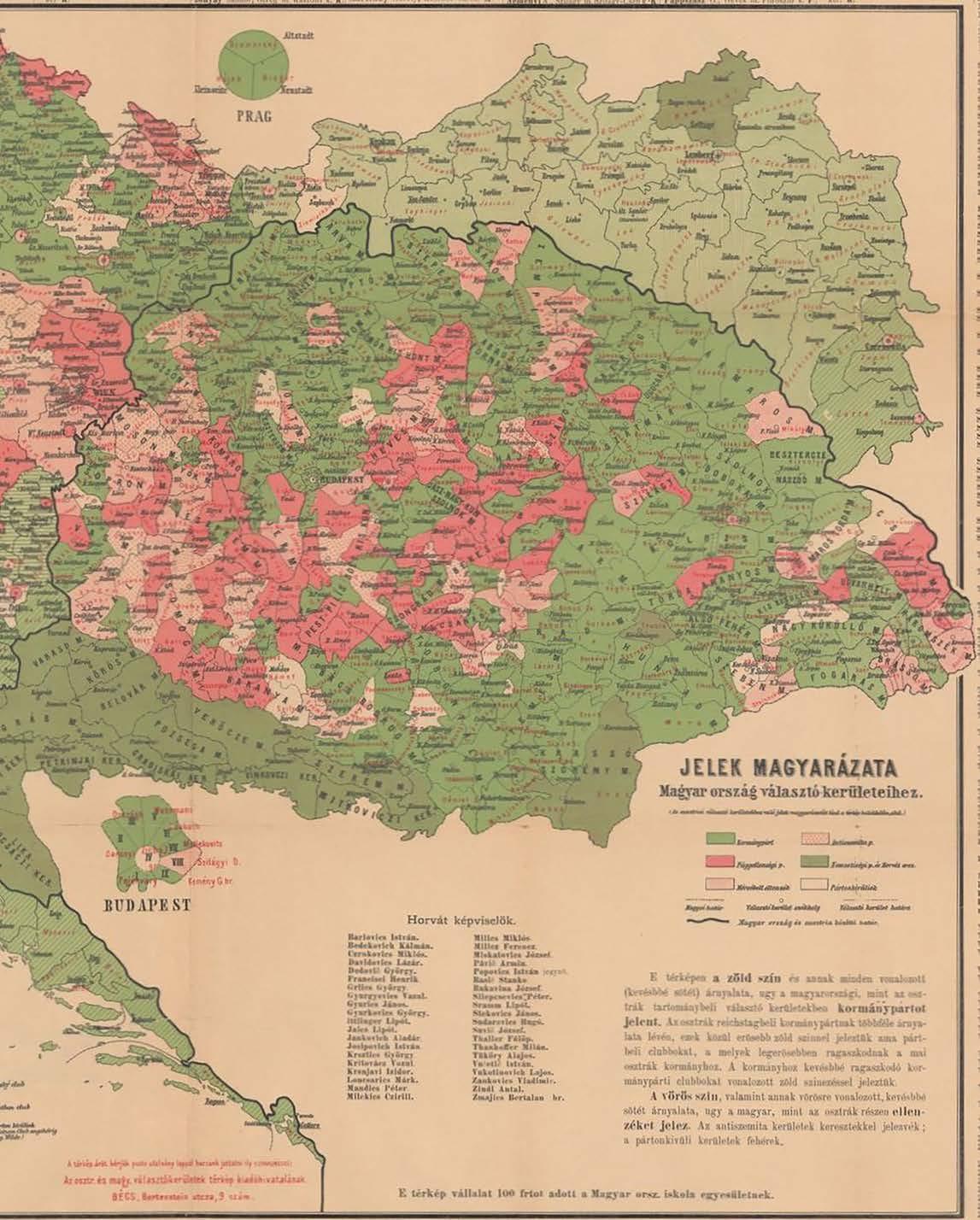
Iam not in principle against borders. What I am against is to always draw them at the edges of territories, defining the states they enclose as distinct, inviolable, organic, God-given if you wish and as such worth defending as we defend our own. Truth is, borders rather come in all forms and shapes. They are what the German author Mau (2021) calls Sortiermachinen (sorting machines). As such, they control flows, some good, essential even, and others not. Controls should take place where they are most effective. Which is why Mau concludes that the ‘…border of the 21st century moves away from the borderline and spatially speaking extends far beyond the national container1.’
Which is also why state borders are not what nationalists like to present them as: wrapped around our body as if they were our skin. Presenting borders as such, they commit a cat egory error: The state is not something organic, natural. It is a historic construct reflecting the circumstances of the times. If it ever has been to the point, the idea that borders should never be detached from the territories they envelope has become out dated, dis-functional even. Not that the protection they afford is no longer needed, but borders should be differentiated accord ing to what they are supposed to protect us from. As with war fare which used to be a matter of invading or defending terri tory but is now hybrid, so with borders: They, too, need to be hybrid: adapted to diffuse threats difficult to pin down, coming from unexpected corners, from the ether even and, who knows, from outer space.
Hybridisation of borders is the reason why France has troops in Mali, Germany is trying to temper the flow of migrants on their way north in Niger, why Morocco does this work around Ceuta and Melilla, two Spanish enclaves on African soil and Turkey earns good money buffering the EU against migrants from Syria and, who knows, in dues course from Afghanistan.
Imagining the EU guarding its external border comes from seeing it as if it were a classic federal, or at least a conglomer ate state with a territory with sharp edges defining the area over which it exercises sovereignty. In reality, as with states, the EU projects sovereignty outside. In so doing, it makes, not only borders hybrid but turns itself into a hybrid construct: ‘neo-medievalism’.
As the first blog in this section ‘Territoriality without
Territorialism’ shows, border controls, too, can and should be selective, functional if you wish. Rather than isolating one’s ter ritory, the purpose can be a specific one like – topical at the time of writing with Corona on the rampage – keeping out deceases.
The notion above of hybrid borders could have come straight out of a book discussed in ’Reflections on Gabriel Popescu’ and in ‘Considering Border Issues’. It’s just that the author has not articulated his findings in exactly the same terms as I do here. Nonetheless, in 'Bordering and Ordering in the Twenty-first Century’, Popescu (2012), he discusses precisely this hybridi zation of borders and the manifold technological innovations facilitating it: Seeking to avoid having to take back unwelcome passengers – and paying fines – airlines for instance perform quasi border controls at check-in.
Reimagining territories and their borders should have impli cations, much talked about these days, for the right to asylum. Conceived in terms of classic territorialism, it means that the right is triggered by setting foot on the state territory. Which in turn leads to frantic efforts to prevent precisely that by means of push backs, extra-territorial detention centres, deals with dubious regimes to do the dirty work in exchange for cash and/ or delivery of materiel, including military equipment. To break with the spell of territorialism, Shachar (2020) suggests to require every diplomat, every consular service and agent of the state wherever he or she is to acknowledge claims for asylum as if the applicant were touching ground in the desired land: the ulti mate of hybrid borders.
A new ‘Turkish Wall’ on the eastern border of Turkey may serve the same purpose as regards refugees from Afghanistan. Which amounts to the same thing: Its external border being not the only place where the EU exercises its territoriality. Thus, in an effort to deal with Lukashenko from Belarus weaponizing ref ugees, the EU Commissioner responsible for dealing with migra tion travels to Baghdad to turn off the flow at source.
In ‘Theorising Borders and Identity’, Weichhart gives depth to the consideration of borders by pointing out the subjective element in assessing the threats and opportunities they pose. Borders are as much part of our selves as features of the real ity they shape.
There is hardly a notion that has created more furore recently than that of ‘Geographies of Discontent’ discussed in the next blog. It comes from research into Brexit finding that the one overwhelming explanation for it is the voting behaviour of people in areas ‘left behind’. Populists seized on this, translating it into vigorous nationalist feelings making it plausible, nay ines capable to ‘pull op the draw bridges’. In the case of the United Kingdom, separated from the European Continent by much more water than fills a moat, this seemed easy. We have learned since
that people smugglers can overcome this obstacle, too, with rel ative ease, but sometimes with heavy costs in terms of human lives. We are learning also that the one and only land border between the EU and the UK in Northern Ireland represents a conundrum. It seems next to impossible to close the approxi mately 200 places where people travel routinely to the Republic of Ireland and vice versa. Even during the ‘troubles’ when the British Army patrolled that border and restricted transit to a handful of official crossings, locals reopened others overnight using whatever means at their disposal. A border in the Irish Sea seems the only solution. Even if the UK were to be administer it in good faith, this would represent one more example of the differentiation and hybridisation of borders.
The counter argument is borders being essential for maintaining nations as distinct and protecting them against ‘Contemporary Universalism’, a point made by Frank Furedi in the next blog in this section. It is like an article of faith to him –and many others – that borders are needed to protect and nur ture identity. I beg to differ, but the reader should make his or her own judgement.
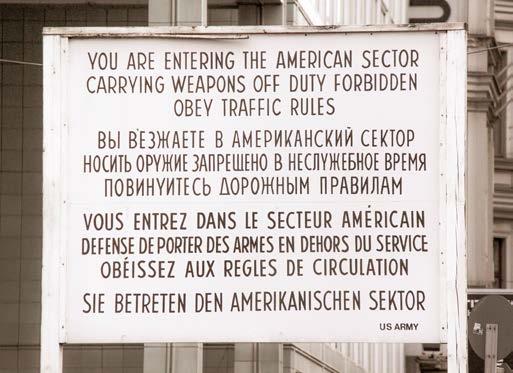
The last-but-one blog ‘The Good Government’ claims that, whilst acknowledging all the benefits of reading Rosanvallon, borders seem his blind spot. He is concerned with France, but is France a law to itself?
Finally, in ‘Europe’s Concentric Rings and Tentacles’, Hilpert (2020) points out that the hybridisation of borders works, not only outside, but also inside the EU where it sorts member states into front-line states and an inner core protected by them, mak ing it into a complex whole.
My teacher in Vienna had been an elderly lady. Otherwise excellent, her stories of saints had inspired me less than her tell ing about the blood-curling cries of the Janissaries: Christian boys taken from their parents in the Balkans converted to Islam and forming the elite corps of the Ottoman army besieging Vienna in 1683. There are sites commemorating this – second and decisive – siege: a church in the hills above Vienna from where a coalition under the Polish King Sobiesky III broke the siege, removing a menace to Christian Europe; a public park where the Ottomans had their fortified camp; an observation post in the cathedral spire from where the commander of Vienna oversaw the battles; cannon balls protruding from church towers where the Ottomans had been on their way to Vienna; a head with a turban sticking out of a chimney depicting a soldier left behind. He had hidden in the oven, the story goes, only to settle peacefully in the vil lage, a point to which I shall return.
Within a bare 16 years, the menace that had lasted a cou ple of centuries during which Hungary was under the Ottomans had receded. A border was drawn between Habsburg lands and the Ottoman Empire.
I heard about this from Jovan Peŝalj (2019), a Serbian his torian giving a lecture about his Ph.D. defended earlier that year at the University of Leiden. He added to my understanding of the history of borders. In the Middle Ages they were not linear which I knew, but the new border was. Still, its purpose was dif ferent from that of modern borders: It was to encourage trade and, yes, immigration. Not only did the Habsburgs thus wish to benefit from Levant trade otherwise dominated by the likes of Venice, in conformance with mercantilistic, or physiocratic the ories, they wanted their population (which, on the Hungarian Plains had diminished) to grow.
However, in parts of the Ottoman Empire and beyond the plague was still endemic. Another epidemic ravaging Habsburg lands needed to be avoided. (To this day, one of the glorious baroque churches built in Vienna marks the end of an outbreak shortly after the peace treaty with the Ottomans had been signed.)
Port authorities were no strangers to decease control: They operated quarantine stations. The Habsburgs decided to have 2 FIRST PUBLISHED 26 OCTOBER 2019.
them all along their new land border and to police the gaps in between, employing peasant-soldiers that had been settled in the area previously to man the border defences. This way, the Habsburgs sought to manage the new influx of merchants and, yes, immigrants who were both welcome.
Nationality did not matter. The Habsburg lands were what one would nowadays call multi-national. However, vagrants and Muslims were unwelcome. (It is said that the soldier who had been left hiding in the oven had converted, not uncommon in those days for Muslims who came to settle.) For the rest, all reli gions were welcome. The Habsburgs soon officially recognised the Greek-Orthodox church. Islam was only officially recognised in the late-nineteenth century when the Habsburgs ruled over Bosnia (with Bosniak regiments instilling great fear in the enemies of the Austrian-Hungarian army). Under a 19th-century law, Islam is still recognised as an official religion in present-day Austria. Were the arrangements along the southern border of the Habsburgs evidence of territorialism as defined – and criticised – by myself? (Faludi 2018) It is surely evidence of the Habsburgs practicing territoriality, in the words of Sack (1985, 19) '...the attempt '...to affect, influence, or control people, phenomena, and relationships, by delimiting and asserting control over a geo graphical area…’ However, do these arrangements amount to the same as modern-day territorialism?
The Habsburg Empire was the antithesis of a nation-state. Later, it would be branded, alongside with other empires, as the 'prison of nations'. Which really means that I have to differentiate my notion of territorialism. Following Scholte it stands for organ ising macro social space into districts, towns, provinces, countries and regions stacked into each other. Importantly, in times of what he calls 'statist territorialism', countries '...have held pride of place above the other kinds of territorial realms.' (Scholte 2000, 47)
It is this statist territorialism which is the target of my criti cisms. Nation-states in particular put a high price on the inviola bility of their borders, as if their territory were the sacred body of its people. It is thus not the exercise of territoriality as such that distinguishes nation-state territorialism; it is the unwillingness to compromise on the matter. This the more so where democracies are concerned. As Balibar (2009, 193) says: 'The absolutization and sacralization of borders is perhaps even greater in a dem ocratic state ... precisely because it expresses the fact that the state is ideally the people's property...' So this makes the defence of borders, as if they were the outer skin of the people, a sacred duty of nation-states.
Not so Habsburg territoriality in the 18th century. To repeat, as Peŝalj tells us, the new border served to facilitate flows across, not to stifle migration. Something to think about when contem plating the management of EU borders.
The benefit of revisiting your archives can be to discover hidden gems, like Popescu (2008) on the Romanian – Moldavian – Ukrainian borderlands. I have never come anywhere closer than L'viv in Ukraine. What awareness I have I owe to a Moldavian speaker at a conference in Poland. Partly educated in Russian, she spoke perfect English. And she was carrying – as apparently many Moldavians do – a Romanian passport. Until having been transferred to the USSR in the wake of its infamous pre-war arrangements with Nazi Germany, some of those lands had of course been Romanian.
Those who know me will appreciate that reconnecting with Popescu gave me cause to search for more, only to dis cover Popescu (2012) 'Bordering and Ordering in the Twentyfirst Century'. With its focus on borders relating to my concern with 'The Poverty of Territorialism' (Faludi 2018) I was richly rewarded. Suffice it to say that Popescu concludes by drawing attention to what he calls a '…major twenty-first century paradox that found expression in the desire to cross all borders while at the same time desiring to erect borders of all kinds and shapes. This paradox has invited considerable border-making tensions between simultaneous demands for unimpeded cross-border mobility on the one hand and for reliable territorial security on the other.' (Page 153)
The upshot is that borders have had to be redefined, lead ing to their differentiation according to function: 'While some border lines in some places are dismantled or have their barrier functions significantly diminished, other borders in other places are erected. These new borders often do not maintain a linear appearance and are not located at the edges of a state's terri tory.' (ibid) Which is of course grist to my mill where I cast doubt on the continuing validity of modernist ideas about the nationstate and its control of territory: As Popescu says, since borders are constitutive for territories, their configurations, too, have to be adapted: de- and re-territotialisation. The outcome cannot fail to be close to the neo-medievalism which, taking a leaf out of the book by Jan Zielonka (2014) I invoke.
3 FIRST PUBLISHED 25 NOVEMBER 2019.
The situation at the EU’s external border is going viral, and the Corona virus raises concerns. The former has prompted me in 'Geographies of Discontent' below to clarify that I am not against borders as such. Invoking a metaphor, I have added here that managing flows, we need thresholds and floodgates to be operated according to the situation at hand. I added that what I was against was rather what, fol lowing Balibar (2009) I called the sacralisation of borders, ’…as if they were the outer skin of an organic body called the people, or nation’.
Re-reading Popescu (2012) I find confirmation, much as of the rejection of their sacralisation, of the need to differ entiate between borders according to function. The Peace of Westphalia formalising territorial sovereignty gave impe tus, first of all for imagining territorially sharp border lines. And ’…the French Revolution… made a key contribution to the modern bundling of state, territorial sovereignty, group identity, and borders. (…) The territorialization of identity materialized the nation. The institution of the state has the nation as its political expression. Boundaries served to bind it all together. They helped maintain domestic coherence (…) and regulate interactions with other nations.’ (Popescu 2012, 35) To this present day, societies thus continue to be thought of ‘…as contained by territorially linear state bor ders, and political independence cannot be imagined without state border lines…. What is absent … is the will to search for answers beyond borders and bordering, and perhaps to transcend borders and bordering altogether.‘ (op.cit, 45)
But if the ‘…idea that socially constructed border lines can contain the impact of human activity on the natural envi ronment appears absurd’ (op.cit, 53) then the reverse is also true: such borderlines offer little to no protection against external threats, environmental or otherwise. This should be obvious now that the world experiences yet another health crisis, the consequences of which are still very much – not only metaphorically speaking – ‘in the air’. Indeed, borders ‘… do not provide a sufficiently effective framework for address ing some of the major issues affecting twenty-first-century societies. The territorial scope of these issues requires that they be regulated by different types of borders.’ (op.cit, 65)
4 FIRST PUBLISHED 8 MARCH 2020.
At which point I return to what I have said above about look ing at borders as floodgates to be opened and closed as needed. Expert on neither flood defences nor on migration, I leave it at this: As the annual floods of the Nile are, some skilled migrants are highly sought after. Even countries having experienced a large influx recently, like Austria, Germany and the UK, oper ate schemes to attract more. Some migrants – genuine asylum seekers – simply need to be absorbed, as has been the case with those fleeing from the Yugoslav wars. (The Austrian minister of justice from the Greens, a lady, is of Bosnian origin5. Surely, this is a sign of successful integration). And some – so-called eco nomic migrants, a large proportion as it seems – may be in the ory, if not always in practice, contained. Even there, the extent to which – and the modalities of – containing economic migrants should be carefully considered. There is after all already talk about the UK post-Brexit being likely to suffer from labour shortages. Anyhow, in no event is the linear border, not even the external border of the EU, the most obvious place to manage flows. I do not think it beyond the pale to sort these various streams out in their countries of origin, or off-shore for that matter. That this requires a huge effort seems clear. Above all it requires accept ance that we live in an interconnected world where thinking of societies as being – see above – contained by territorially linear state borders – must cease.
Anyhow, whether you even wish to manage flows and in which way depends on how the border is being perceived. In ‘Theorising Borders and Identity’, Weichhart is quoted as showing that the opening of Austria’s border has been perceived differ ently, with that with Germany having been welcomed and that with the Czech Republic causing much trepidation.
5 HTTPS://EN.M.WIKIPEDIA.ORG/WIKI/ALMA_ZADI%C4%87 (LAST ACCESSED 17 DECEMBER 2021)

6
I remember the Berlin Wall from listening to German radio – west and east – reporting its being built to keep citizens of the German Democratic Republic away from West German flesh pots. Like with the ‘Turkish Wall’ (Sayarer 2021) and like edifices around Ceuta and Melilla, Spanish enclaves on the Moroccan coast, the point of building walls is now, not to keep citizens in but to keep refugees out.
I am not categorically against borders. The Refugee Convention implies distinguishing between those who do and those do not qualify. Giving the latter access is discretionary. No, the issue is where the borders and where the entry points should be and — no wall is after all ever tall enough — how to deal with those who scale them. However, that whatever wall is needed should be at the state border and that checking those who enter is for its agents are no longer self-evident truths. International agencies, including NGOs, private security firms and, yes, other states to whom the thankless task of holding the multitudes is being outsourced come into play. Push backs at the border between Croatia and Bosnia thus prevent Austria from having to close its border — and seeing its own border with Germany being closed again, as in 2015. The Hungarian border fence of old has faded out of the news. So with Austria’s assistance sending 21 police and two dogs to help7. The same with Turkey being paid to host — perhaps a euphemism — Syrian refugees in exchange for cash and lifting visa requirements (the latter an unfulfilled promise).
Afghans crossing Turkey’s eastern border have already been on TV, so she is building her own wall, so far without the EU chip ping in. Maybe it soon will. After all, Turkey holds the keys to the EU and houses 3.7 million Syrians already, with so far no less than 300.000 Afghans thrown into the bargain! Which is why politicians from the EU are scrambling to mobilise other coun tries for dealing with the expected Afghan exodus8. It is really ‘All Hands on Deck’ to prevent a repeat of 2015!
Meanwhile, ‘…the EU has come under a serious security threat and is a witness of state-sponsored weaponisation of ille gal migration in Belarus,’ a spokesman for the Slovenian EU pres idency referring to Belorussia has said9. Also, front-line states
FIRST PUBLISHED 1 SEPTEMBER 2021.
7
9
HTTPS://HUNGARYTODAY.HU/AUSTRIA-POLICEMEN-HUNGARY-SERBIA-BORDER/ ( ACCESSED 19 DECEMBER 2021)
8 HTTPS://WWW.EURACTIV.COM/SECTION/EU-COUNCIL-PRESIDENCY/NEWS/EU-MULLS-AID-FOR -AFGHANISTANS-NEIGHBOURS-DETERMINED-TO-PREVENT-NEW-MIGRATION-CRISIS/ (ACCESSED 19 DECEMBER 2021)
HTTPS://WWW.EURACTIV.COM/SECTION/EUROPE-S-EAST/NEWS/EU-CALLS-MEETING-ON-BELA RUS-BORDER-CRISIS/ (LAST ACCESSED 19 DECEMBER 2021)
meet their nemesis, the smugglers, as well as international NGOs insisting on the Law of the Sea and international conventions being observed on the high seas, much as in the camps holding those who have succeeded in reaching European soil. Once more it seems that, employing their classic weaponry of controlling national borders, territorial states are loosing control.
SOURCE: HTTPS:// EN.WIKIPEDIA.ORG/WIKI/REFUGEES_OF_THE_SYRIAN_CIVIL_WAR_IN_TURKEY#/ MEDIA/FILE:USAID_ASSISTANT_ADMINISTRATOR_LINDBORG_INTERACTS_WITH_ SYRIAN_REFUGEES_(8411500481).JPG

At Radboud University Nijmegen, I met Peter Weichhart giving a paper. The published version refers to my joint article with Earnest Alexander on planning doctrine. (Alexander, Faludi 1996) In Faludi (2018, 49) I distance myself somewhat from planning doctrine. Its strength has been in explaining the unique success of Dutch national planning in the past by focussing, as it has done, on the territory of the Netherlands, an object lesson, therefore, of ‘territorialism’. Proposing a new planning doctrine for a Euroregio straddling the Austrian/German border, Weichhart (2005, 10-13) goes further, exploring the potential of doctrine in combating, rather than enforc ing territorialism. A start should be made by giving the region a new name, in this way establishing it in common discourse. Maybe my concluding that a European planning doctrine was ‘a bridge too far’ (Faludi 1996) had been premature. Maybe proposing one such could rather set us on a course of seeing European space in a new light. Be that as it may, it had been my vain search for European spatial plan ning to speak of that had led to my crusading against territorialism.
During visits to Vienna University to where Weichhart had moved to teach human geography, we had some good talks about the follies of – without calling it that – territorialism. We have kept up the habit since. Recently, my interlocutor shared with me his chapter in a German reader on borders. (Weichhart 2018) There he points out that, as against the English language distinguishing between various meanings of ‘border’, the German ‘Grenze’ is ambig uous. I would like to explore the potential of Weichhart’s invoking fuzzy set theory, not only for the German but also for the English discourse. Borders define what is in and out, often with positive as well as negative connotations. But things are not always blackand-white: Depending on subjective preference, the same bath water can thus be labelled as hot, warm or cool. ‘Discriminating –and drawing boundaries, too – are matters, neither of discovering what is in the nature of the object of comparison, nor its attributes. It is rather an act at the discretion of the distinguishing subject.’ (Translation of this and all other passages from its German original are my own.) It follows that each and every border can have positive, as well as negative connotations. Austrian attitudes to Schengen varied for instance from heartfelt relief when it came to the open ing of the German border to trepidation concerning opening up to the Czech Republic.
Weichhart makes clear that neither states nor their territories
are God-given or in the nature of things. Rather, they are special instances of socially constructed and constituted spaces. Which is grist to my mill. Also, rather than immanent, state territories, ‘…have sometime been brought into the world by means of making a delib erate distinction’. In my terms, they are thus political constructs, but once established borders of course become part of people’s every day experience, making them feel as if they, and the states which they define were in the nature of things. That this is not so, is of course my message in ‘The Poverty of Territorialism’. (Faludi 2018)
Which leads Weichhart to discuss how one constructs the self-invoking constellations of everyday life such as birthplace, residence and other spatial foci of social interaction. Attachments to such significant places contribute to generating locality. Which I have experienced, not so much in the sense of attachment to my place of birth, Budapest, next to insignificant for my construction of my own self, but to other spaces of my upbringing and socialisa tion until settling in a welcoming Netherlands – but without ever forgetting all that has gone on before.
After these self-reflections in light of Weichhart’s theorising, I return to his summarising his paper. There he says of course that borders are constructs: ‘So they must not be seen as intrinsic attrib utes or as entities “to be discovered”. They always and necessarily emerge when people in their thinking and acting and in their cog nitive interpretation of the world postulate the existence of certain objects and their attributes. This pragmatic interpretation implies furthermore that each more concrete rendering of certain ideas of a border depends on the actors that are the “discriminators”. It is necessary also to recognise that border-making distinctions can lead to sharp as well as to fuzzy borders.’
‘The Economics of Inequality’ by Thomas Piketty has just come out in Dutch. Jonathan Metzger (2019; see the section on reviews of my book) might wish I should read it. What it reminded me of straight away was sharing a platform with Andrés Rodríguez-Pose at the ESPON seminar during the Austrian Presidency in December 2018 where I presented my ‘The Poverty of Territorialism’. Andrés was showing that the reason for voting
LEAVE in the Brexit Referendum was the feeling of areas hav ing been left to their own devices (Andrés Rodriguez-Pose: The Geographies of EU Discontent and the Revenge of Places that Don't Matter.) Subsequently, he has helped shaping ’A Territorial Reference Framework for Europe’ (ESPON 2019) much as the European Commission’s proposal for Cohesion Policy 2021202712. In addition, Andrés has now published a paper with, amongst others, a Commission Official from the Netherlands, Lewis Dijkstra. It concludes that such areas ‘…provide fertile breeding grounds for the brewing of anti-system and anti-Eu ropean integration sentiments.‘ (Dijkstra, Poelman, RodríguezPose, 2019, 14) Counteracting anti-EU voting by ‘…fixing the so-called places that don’t matter is possibly one of the best ways to start.‘ (op cit, 15).
Indeed, ’…the fear of being left behind (…) is leading to a reaction which is starting to have serious political, social, and economic consequences. (…) Populism (…) has taken hold in many of these so-called spaces that don’t matter, in numbers that are creating a systemic risk…’ (Rodríguez-Pose 2018, http://eprints. lse.ac.uk/85888/, p.16) And: the ‘…challenge has come from an obvious, but at the same time completely unexpected source: the ballot box.’ (ibid, p. 20) But we have been ‘totally unprepared’ for political entrepreneurs exploiting the (my term) production of democratic legitimacy – say: voting – being by territories, in the UK, where Brexit has triggered much of this awareness, even exclusively so. The ‘first past the post’ system features after all the most extreme form of the production of democratic legiti macy territory-by-territory. How to deal with this in a world as interdependent as ours – one that eludes the basic assumption underlying territorialism that the world can be tucked away in
11 FIRST PUBLISHED 19 JUNE 2020.
12 HTTPS://EC.EUROPA.EU/REGIONAL_POLICY/EN/2021_2027/, LAST ACCESSED 17 DECEMBER 2021.
boxes – seems a key problem. Perhaps, the purported advan tages that they provide, not only security but also a sense of iden tity are illusionary. Let’s assume they themselves believe them to be real, but even if true, the propagandists of territorialism sell us an ideology: to invoke Karl Marx, opiate of the masses. Territorialism cannot, after all, address growing inequality. Nor can it provide real help for the areas now in a rebellious mood. Least of all, can it help facing the anonymous ‘Empire’ Hard and Negri (2000) see operating behind the scenes. Rather, territo rialism might take us back to the aggressive nationalism of the late-nineteenth and early-twentieth century, when the Great War tragically ended the first phase of globalisation, leading almost seamlessly into the Second World War thereafter.
With a view to the situation developing at the time of writ ing at the external borders of the EU on the Balkans13, I hasten to add that I am not against borders as such, nor do I have an immediate answer. Suffice it to say, therefore: managing flows requires thresholds and floodgates. As the Dutch have known for ages, those gates need to be closed – and opened! – accord ing to need. No, what I am against is what the French philoso pher Eduard Balibar (2009) calls the sacralisation of borders, as if they were the outer skin of an organic body called the peo ple, or nation.

14
My encounter with Frank Furedi (2018) came rather late in writing ‘The Poverty of Territorialism’ (Faludi 2018) when I noticed his defence of the position of what have once been ‘new mem ber states’ and now a thorn in the flesh of such enthusiasts of European integration as still exist. New members have no wish to give up nationhood on the altar of a (West-)European liberal consensus insisting that ‘everything goes,’ hence ‘Culture Wars’ in the title of Furedi’s book.
A prolific author, well read, articulate and — unlike me — obviously still mastering Hungarian, he keeps abreast of the most articulate defences of the Hungarian positions. Anyway, in 'The Poverty' I merely recount his identifying borders as ‘… so far the only foundation that humanity has discovered for the institutionalization of democratic accountability … Without bor ders a citizen becomes a subject of power that cannot be held to account: and this is why — from a democratic perspective — it is important to counter the anti-populist crusade against national sovereignty.’ (Furedi 2018, 128) What I could – maybe should — have said is that to say that borders ensure accounta bility is an utter illusion. Instead, I jumped ahead to challenging the production of democratic legitimacy territory-by-territory.
Nobody’s fool, Furedi is widely published15, but let the reader be his or her own judge. Anyhow, recently I came across another of his books: ‘Why Borders Matter’. (Furedi 2021) On the verge of reading it, I found a review by Teodor Gyelnik in the ‘Cross-Border Review‘ of the (Hungarian) Central European Service for Cross-Border Initiatives (CESCI). Having attended some of their meetings, I know and respect the people involved. To boot, in an erudite essay in the penultimate Cross-Border Review, Gyelnik (2019) has reviewed my own book giving me much pause for thought.
Reviewing Furedi, Gyelnik keeps more closely than in my case to Furedi’s text. He points out what is already evident from any perusal of the earlier publications of this author, which is that Furedi picks many fights with mainstream liberals and their believes. The target of his criticisms in this, as in other publication 14 FIRST PUBLISHED 11 AUGUST 2021. 15 SEE: HTTPS://EN.WIKIPEDIA.ORG/WIKI/FRANK_FUREDI (LAST ACCESSED 21 DECEMBER 2021)
is what, to distinguish it from traditional cosmopolitanism with its universal and moral outlook, he calls ‘contemporary universal ism’. Gyelnik (2020, 147) summarises it as being ‘…characterized by anti-community dogmatic character with aggressive rejection of nation, national borders, the relating institutions and politi cal categories, like sovereignty, citizenship and even democracy itself. Simply, it [contemporary universalism - AF) has turned itself into a negative and destructive ideology. Instead of controllable national democratic frames and sovereignty, the ideology calls for global sovereignty with global demos.’ Gyelnik notes Furedi invoking the moral authority of no less than Hannah Arendt warning against the establishment of an unbounded world gov ernment being ‘…the literal end of world politics itself.’

Should I rush to check up on Arendt’s, no doubt deep thoughts on the matter? Maybe, but I plead not guilty of wish ing for world government. My point in ‘The Poverty’ has been — and I stick to it — that (if they ever have been) ‘…controlla ble national democratic frames and sovereignty’ can no longer be sustained. In a networked world, they can no longer ensure accountability.
Gyelnik does not engage Furedi on this, nor on any other point. He merely points out that he breaks ‘…from the academic mainstream…’ and that his book ‘…represents and articulates a rather rare conservative approach…’ (2020, 148) He recom mends the book to an academic readership interested in such topics. Am I going to learn more than what I know already from Furedi’s previous book which I quoted?
Rosanvallon (2015) on ‘Le bon gouvernement’ is the last one of a series of works on the problems, not to say the malaise of contemporary democracy. Paul ‘t Hart on Researchgate17 has done a better job of reviewing this work than I could ever have. Suffice it to say that the book bears an, albeit indirect relation ship with my problematising the production of democratic legit imacy by way of elections, territory by territory.
The point is, Rosanvallon nowhere questions this. His focus is rather on the development of democracy being shod through with choices made under the pressure of circumstances. Such choices may – or may not – have missed the mark. By way of illustration, developing democratic procedures, choices only too familiar to us have been made which departed from the origi nal ideas. For instance, originally, candidates for the Assemblée générale were not supposed to declare themselves, let alone campaign for being elected. As against then, presently cam paigns are celebrated for helping people make their choices at the ballot box. But, then, the ballot box was not the first thing the founding fathers considered either. (Male) universal suffrage was in fact not practiced until more than 50 years later, in 1848, and with much trepidation. With it, slowly, history has witnessed the emergence of all the paraphernalia of democracy familiar to us, like the formation of parties and parliamentary factions. Whereas much of Rosanvallon’s thinking, including his ear lier reflections about democracy are on such matters, in the pres ent volume he turns his gaze on the executive, hence the title of his book. What the government does and how has immediate bearing on citizens, respectively on their experience of democ racy. Elections are intermittent moments of ‘doing democracy’, no more, and no less. The day-to-day experience of citizens as against this is primarily shaped by the way they are being gov erned. Much of this book is about how to democratise govern ment with, for instance, citizen panels and so forth, but also, much as in one of his earlier books (Rosanvallon 2008) encour agement for the executive to become better at listening, and doing so with empathy. The very last sentence summarises this,
Rosanvallon’s point: ’Much as the spirit of 1789 has allowed to preserve the social world after the institutionalisation of a system of representative elections, the redefinition of the rap port between governors and governed could pave the way for a clearer appreciation of the preconditions of realising a society of equals.’ (Translation AF)
But what is it about the governed and their government, framed as they are by, more or less accidentally drawn borders that qualifies them as a ‘society’, let alone a ‘society of equals’?
More in particular, is there no society beyond, and should those outside not be treated as equals? The only way of denying that this is so is by making, necessarily arbitrary distinctions, not only between territories, but also between peoples, nations, cultures and histories, all of them constructs and not eternal givens. From all I know about Rosanvallon, though by no means limiting him self to French history and political thought, with his focus being on France, he nowhere seems to raise this issue.

Once, German legal theory held that only member states could be said to have a territory. (Gatawis 2000) It was only when territorial cohesion came on the books that German experts con ceded that the EU had a territory. (Ritter 2009) Isabel Hilpert (2020) might say: EU territory is ‘double-coded’: national and communitarian. At least she says so regarding the EU‘s external borders since Schengen. Recently, the Commission has tabled proposals, with Emanuel Macron now throwing his weight behind them, for reforming the system.
Discussing relevant arrangements known as ‘Dublin’ and ’FRONTEX’, the latter assisting front-line states, Hilpert points out the need for concluding agreements which by necessity cur tail the sovereignty of the states. Classically, they control entry and exit. But external borders protect, not only the border states, but also the core. Being of mutual benefit, border management needs to be negotiated between them. And so with the sover eignty of border states: it is no longer their exclusive concern. As with the EU territory – see above – but only more insistently, sovereignty is ‘double-coded’.
Then Hilpert documents how the agencies on the ground in Italy deal with this complexity with immediate relevance for the present. She also expands on the EU territory as having a core and a periphery. With an author who in one of his early pub lications (Vobruba 2005) mentions the good old Blue Banana standing for the core, she talks about the EU territory featuring concentric rings. For its own good the EU creates an additional outer ring, or cordon sanitaire.
But maybe this stretches the notion of a ring. Maybe one had better talk of tentacles stretching out in various directions, responding to perceived threats, like in Mali deep in Africa where the Dutch amongst others operate against perceived threats.


Some mornings I spend watching international news. ‘Stopping the Contagion’ reports on what German news had to say about an emergency measure of the government leading to the clo sure of an iconic border crossing: the bridge linking Strasbourg in France with its hinterland on the German side of the Rhine. I am critical of this crude measure leading to unnecessary hardships. But closing borders is one thing govern ments can do, and hence feel obliged to be doing.
Before continuing, let me say: I am sure there will be a deluge of publications – in fact it is already upon us – reflect ing critically upon the behaviour of governments. And not just learned publications! Criticising the handling of the Corona cri sis has become, not only a chief element of political discourse, it is also a topic of pretty much every casual conversation that is taking place now.
So be it! But the one-time planning theorist in me becomes restive. When entering into discussions, I always quote Pressman and Wildavsky (1984) showing that, given the many steps that policy takes on the way it takes from Washington to where it hits the ground, so to say – in their case in Oakland on the West Coast – there is endemic failure.
Closer to home – and closer to my past work – in another classic, `Local Government & Strategic Choice’, Friend and Jessop (1977; 1st edition 1969) have identified three types of uncer tainty decision-makers face. All three apply with full force to Corona management:
Uncertainty as regards the environment such as: what is the nature of this virus and what are its likely effects where?
Uncertainty as regards values: what should we prior itise: protecting the elderly – like myself – or keeping schools open?
Uncertainty as regards related fields of choice: what are other governments doing, and what are the likely effects on the epidemic here?
So, I have a measure of understanding for the predicament governments faced with electorates ignoring the uncertainties decision makers are under and making demands that cannot be met. Fencing off the borders is at least one measure that creates the impression of governments acting on behalf of their people. But in the first blog, ‘Stopping the Contagion’, I question whether, where a functional area like Strasbourg-Ortenau Eurodistrict is concerned it is it effective to close the international border.
‘Roma, Corona and Territorialism’ looks at the opposite: a
closure that could be said to follow functional, rather than terri torial logic. Given the persistent discrimination of Roma, closing off their quarters to contain Covid-19 may of course raise other questions. But in this particular case I hesitate to pass judge ment: What should the authorities really do?
‘The Mother of all Euroregions Under Pressure’ develops this theme of functional versus territorial closures further, taking a model cross-border region as its example. There, at the GermanDutch border, once again measures taken by state authorities – the Germans closing retail businesses while the Dutch keep ing them open – create a mismatch. So, what aggrieved German shopkeepers seem to ask for is for the entire EUREGIO on both sides of the Dutch-German border to be treated as if it were one – functional – unit.
‘A European Republic?’ discusses opinions of its outspoken advocate about border closures exactly at the time when the famous Schengen Agreement had been in operation for no less than thirty years. Whilst not questioning the need for controlling movement in the face of the epidemic, she outlines the dilem mas this poses and explains her own take – with which I do not necessarily agree in full – on European integration.
In ‘Triumphant Territorialism?’ I explain my own ideas as laid down in ‘The Poverty of Territorialism’ (Faludi 2018) in rela tion to the issues raised in this section. Functional, as against territorial governance represents an important element in my ‘neo-medieval’ perspective for the EU.
‘Functional closures’ develops this theme further. Such clo sures can serve sorting otherwise welcome immigrants by cate gories. Which amounts to exercising functional sovereignty, but without the pretence of creating or sustaining a homogeneous people. In the case discussed, the purpose was thus the opposite of what borders are usually thought to be about: to encourage, rather than stem the tide of immigrants.
The question mark behind the title of the next blog ‘Triumphant Territorialism?‘ should provoke the reader to be asking whether closing territories is really the ‘only game in town.’ Should we not rather look at closures as instruments to be invoked with circumspection, taking account of local circum stances? Accepting that controlling flows may be needed to man age the spread of disease is one thing, deciding where to do so is another. Obviously, the, in this case German-French border has been chosen because the border is where the state can be seen to be exercising its territoriality. However, if it were possible to check flows in an out of the entire cross-border agglomeration of Strasbourg-Ortenau, that might be more effective – and less disruptive – than closing the bridge that connects them.
It’s 7.30 in the morning on 16 March 2020. Yesterday, Sunday, the German government has announced that it will close its border, amongst others the one with France, with which it has concluded the Treaty of Aix-la-Chapelle, a far-reaching agree ment to enhance cooperation, including cross-border coopera tion. The closure will take effect at 8.00. ZDF reports from the Europabrücke between Strasbourg and Kehl. Federal officials descend from German police vehicles. Apparently, they are in the process of implementing the necessary measures. The report on TV points out that meanwhile the Eurodistrict StrasbourgOrtenau with close to one million inhabitants on both sides of the Rhine – the majority on the French side – has nestled itself in people’s minds. No less than 36,000 cars cross this road bridge on a daily basis, the figures being from 20142. Current numbers may be higher.
There is of course also a rail bridge. Apparently, from now on trains from France will have to stop at the station in Kehl to be checked. I am also thinking about the iconic tram line from Strasbourg to Kehl. What’s going to happen to that? Is the ser vice going to continue, and how and where are border controls going to taking place? On the bridge? At every stop?3
I am mentioning all this because I am reflecting on the wider implications. Are we witnessing the triumphal return of territo rialism? Maybe so! About the prospect, I am ambivalent. Being in the age bracket that seems to be most vulnerable, I listen to the recommendations to self-quarantine, and so forth. A lecture tour to Poland has been cancelled. So, with the one to Aix-laChapelle. Visiting Verdun with our youngest grandson is in the balance. At the same time, I see authorities of various stripes keen to improve their public image by taking whatever measures are at their disposal, thereby enforcing territorialism. The iconic Eurodistrict Strasbourg-Kehl and with it other cross-border areas may fall victim to this. Not that I am against restrictions as such. But would it not be more to the point to have them tailor made, depending on the situation on the ground?
1 FIRST PUBLISHED 16 MAY 2020.
2 HTTPS://WWW.EUROPARL.EUROPA.EU/NEWS/EN/HEADLINES/EU-AFFAIR S/20140207STO35327/FRONTIERS-OF-THE-EU-THE-BORDER-THAT-CEASED-TO-BE; LAST ACCESSED 30122021.
3 INFORMATION RECEIVED SINCE WAS THAT IT CEASES OPERATION, IF ONLY FOR A WHILE.
True, who would have authority to do so? And who would have the resources needed for taking compensatory measures? Finally, in implementing measures, who would exercise the nec essary discretion? So far what I see is that, in their attempts to prove their mettle, state authorities are competing with each other as to which one can assert its authority most convincingly. Dutch columnist Caroline Gruyters comments on Italy, where apparently an, until now nondescript prime minister has met amorphosed into the father of the nation4. Indeed, the meas ures governments propose are measures only governments can take: passing emergency legislation, mobilising forces, requisi tioning essential supplies. Giving all it takes, they justify their very existence.
Once again, I am the first to admit that I, too, wish to be protected. And, if giving me protection the government gains something that has been in short supply recently, legitimacy, so be it. But: are governments taking measures that, out of necessity, are broad and harsh the best guardians of our health and safety?
4 HTTPS://WWW.NRC.NL/NIEUWS/2020/03/14/HOE-DE-STAAT-ONVEILIGHEID-GE BRUIKT-A3993768 (LAST ACCESSED 30122021).


This is a difficult one: Roma neighbourhoods are subject to a regime enforcing restrictions on movement, reports Euractiv on March 20, 20206. That the measures have been asked for by a Bulgarian nationalist party does not help taking away the odium of discrimination. But a local mayor said on TV that Roma ‘… were moving around in large numbers … after the ban (on mass gatherings) within the city was introduced.’ Concerned about the return of many Roma from abroad carrying the COVID-19 virus, the national coordinator admitted that this might sound like dis crimination but, flanked by efforts to convey the seriousness of the situation, containment was necessary.
At a time when more parts of Europe are under lock-down - the Bavarian capital of Munich being the latest one, and well for similar reasons: failure to comply with restrictions on more than two people gathering - how could one object? But should large Roma neighbourhoods be put under curfew, whilst oth ers where it is reported that - like many of us - people stick to the rules are not?
My impression from - cursory - interrogations of knowl edgeable experts is that Roma culture is indeed an issue. I was particularly impressed by a Hungarian professor of sociology who during Communist times had left for the US. We heard him on housing in what were then called Socialist countries at Berkeley, only to meet him again at Harvard fifteen years later, in 2000. There he recounted his having adopted a small village on the Hungarian Plains: Hungarians were making room for Roma, with detrimental effects. I recall asking him about ‘solutions’. His exact words I don’t remember, but I recall the distinct feeling that there were things beyond the grasp of well-meaning liberals.
We in the Netherlands take measured steps to deal with what is now called the Corona pandemic. So far, the Dutch gov ernment has avoided following the lead of, at present count four teen other countries imposing a curfew on all but the most essen tial movements. The argument is to wait for ‘group immunity’: large groups unlikely to have severe symptoms being infected. Which should avoiding unmanageable peaks of vulnerable groups, myself included, falling seriously ill. The government has done so in the teeth of a heated campaign to the effect that it was
5 FIRST PUBLISHED 21 MAY 2020.
6 HTTPS://WWW.EURACTIV.COM/SECTION/LANGUAGES-CULTURE/NEWS/BULGARIAN -AUTHORITIES-STRUGGLE-TO-ENFORCE-CONTAINMENT-WITH-ROMA-POPULATION/ (LAST ACCESSED 230122021)
accepting, nay encouraging the lives of Dutch people - voters - being put in mortal danger. But this right-wing and nation alist oppositions negates evidence, for what it is worth, that in the short run COVID-19 can at best be contained, but not eradicated7 .
To return to Romania, constrained by our knowledge - fal lible though it may be - that the wisest course of action now is to manage COVID-19 using whatever means is at hand, should we not condone restrictions on the movement of Roma? And, if so, does this not mean a return to territorialism? But recall that I am not against any kind of border, only against treating borders as if they were the outer skins of those mythical beasts called nations. Functional borders are alright!

There are Euregios and there is EUREGIO. Consisting of 129 municipalities, homes to 3.4 million inhabitants, two thirds of whom in the Federal Republic and one third in The Netherlands, EUREGIO has been the first of its kind. It was a pioneer in Territorial Cooperation, better known as INTERREG. Testimony to its value, German fire engines came in droves to the assistance in the aftermath of an explosion of stored fire works at Enschede in the Netherlands. The event made it to my TV screen at Harvard where I happened to be spending three months in May 2000.
Now it is year zero of the Corona pandemic. At last count, fourteen states in the European Union (EU) are imposing near-complete lock-downs. Not so The Netherlands where many shops are still open, even, as is usual, in the weekend. German politicians in the region see this as more problematic than ever. Writing to no less than Chancellor Merkel (cc to one of her potential successors, the chief of the government of the most populous federal state North Rhine-Westphalia) they see the situation as unsustainable. It is not quite clear where the shoe pinches: shoppers importing COVID-19, or yet more business leaking away. The angry mention of an invitation on the web site - now rescinded – of Enschede to come shopping must have been at least one factor contributing to the feeling of malaise. So, Merkel was invited to intercede with Dutch Prime Minister Rutte, presumably to make him emulate the German example of adopting tough measures in the whole of the country.
The above is symptomatic for territorialism when faced with a virus disregarding borders. Nonetheless, under pressure to be seen to be acting, closing them is an options at the disposal of governments. Emulating the most stringent measures taken by any other government is another.
I am not saying that any such measures taken are useless. How could I? But they reflect as much the features of state ter ritorialism - governments being called upon to take measures with strict reference to their territory - as they do the nature of the present threat. If indeed closures are the right strategy, without territorialism, they could be targeted purposefully, for instance at agglomerations. In an earlier blog, I pointed out that the closure of the German-French border between Kehl and
Strasbourg cuts right through the highly integrated Eurodistrict Strasbourg-Ortenau. Would it not be more to the point to isolate that agglomeration rather than cutting right through it?
Another effect of state territorialism is that governments are driven by other governments to take measures that in their situations and/or at that moment in time may not be the most suitable. Being held accountable by their voters - and only to them - governments can be at the mercy also of complicated party political games. So, rather than handling uncertainties as best as they can, they may be forced to go for taking single-minded actions taking account neither of uncertainties nor cross-border effects. The most well-meaning may of course opt for taking such measures together: close the whole of EU space, guard its exter nal borders! Maybe so, but is this not territorialism writ large?
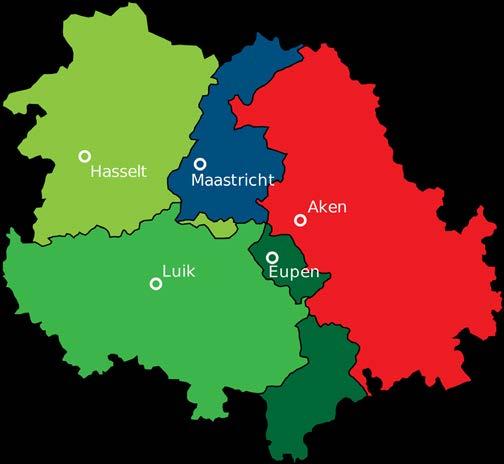
Austrian radio is my antidote to BBC World and the Dutch Evening News. On 27 May it featured Ulrike Guérot whose campaign for a European Republic I was familiar with, so I paid attention.
With German and French academic qualifications, she divorced her French husband - hence the name – has grown-up children in Paris and is living in Berlin where she founded the European Democracy Lab. She is also professor of European Studies at the Donau Universität at Krems some forty miles from Vienna. With books in various languages, she also speaks frequently at conferences and writes in quality papers, most lately with Lorenzo Marsali at the occasion of Europe Day in The Guardian10. The occasion for the broadcast has been the upcoming 35th anniversary of the Schengen Agreement which, in reaction to Corona, has all but been put on ice.
Guérot did not – nor would I – question restrictions on movement, but why at national borders? The answer is: because there states can show themselves to be doing what they have sworn to do: protect citizens. So, without much ado the Europa Brücke over the Rhine with its cross-border tram line has been closed. Why not ring-fence the Eurodistrict Strasbourg-Orthenau on both sides? Why close the border where it isolates Belgian residents from their bakery in the Netherlands as also reported in The Guardian? Likewise, why doing so where it cuts through a clothing store, causing for its Belgian section be closed, and the Dutch continuing to do business? At least Belgian health work ers are allowed into Maastricht, but only by taking detours and on the assumption that they would not do their shopping in the Netherlands, never mind that late shopping in Belgium is difficult.
Guérot concluded that nation-states manifesting them selves in this and other ways led them to suspend Schengen, even without giving due warning, as required, to the European Commission. And, while ordinary citizens were deprived of their rights, goods and seasonal workers were waived through to avoid the misery caused by consumers being deprived of seasonal asparagus. Concerned about Romanian health workers being able to continue providing round-the-clock home care, Austria even negotiated for them to come to Austria by the trainloads.
9 FIRST PUBLISHED 30 MARCH 2020.
10 ‘ELITES HAVE FAILED US. IT IS TIME TO CREATE A EUROPEAN REPUBLIC’, 10 MAY 2020.
Guérot does not dispute the right and the duty to deal with emergencies. And the sovereign state, she points out, is presently the only one that can, if need should be dispense with the law. It is just that in fact states are no longer sovereign. An advocate of a ’European Republic’, this is grist to her mill. But her republic is different from that other counter-factual, a European federation, which the EU has once been seen as. It is rather an umbrella for a ‘Europe of the Regions’ It would exercise functions normally vested in states, like managing the currency, health and unem ployment insurance and, yes, security. But there would be no pretence of a common identity. That would be a reserve of the, Guérot estimates fifty or so regions.
Which reflects her view of what a nation is: ‘…neither eth nicity nor language, neither culture nor identity. A nation is a law that establishes a group of equals boasting common rights’, she writes with Marsala in ’The Guardian’.
For those who know about my engagement with the EU and European spatial planning it may come as a surprise, but I am not in favour. True, stripping the nations of their pretence of ethnic homogeneity is sympathetic, but why should all the common rights be bundled in to the same territory? And, if so, would this not revive a feeling of ‘them and us’?
To explain, it suffices to return to Guérot‘s complaint about differentiating between freedom of movement of citizens, goods and essential workers. What’s the problem? They are differenti ated already. Thus, there are opt-outs form the Euro and, even without one, Sweden stubbornly keeps its Kroner. This while, without asking, Montenegro uses the Euro as the more palat able alternative to a kind of monetary union with Serbia from which the country has split only recently.
Something similar applies to Schengen: Four non-members of the EU are in, and members of the EU, some with opt-outs and others still in the waiting room are not, with Cyprus perhaps per manently excluded. At the same time, Cyprus is in the Eurozone!
And the much-vaunted Single Market? With notable exceptions it applies also to Iceland, Norway and Lichtenstein. Notorious is of course the case of Switzerland with arrangements with the EU too complicated to explain.
I can see nothing wrong with this. Which does not mean to say that the functions Guérot ascribed to her ‘European Republic’ should not be supra-national, only that they are not necessarily ‘one size fits all’. Which is like the new-medievalism which Jan Zielonka (2014) and I in his wake I (Faludi 2018) consider more realistic than a European Republic, with or without common ethnicity or language.
Should there not be an exclamation mark instead of the question mark? Is the air not filled with complaints about state governments not doing enough for their territories and citizens? But my argument is not against fiscal stimuli nor state invest ments and border controls. Elsewhere (see ’Considering Border Issues’) I compared them to flood gates to be opened and closed as and when needed. No, my complaint is against – quoting Balibar (2009) – the sacralisation of, in particular state borders, as if a state’s territory was an organic whole where in fact it is a – malleable – historic construct. Mind you, where borders have been closed recently in response to Corona, ‘green lanes’ have already been opened to let heavy goods vehicles through, and there is an outcry about the dependence of the agricultural sec tor on seasonal workers. Otherwise keen to be seen to control its borders, in Austria there is a realisation also that care for the elderly relies on health workers from Central and Eastern Europe. There is a well-established pattern of, mostly women taking turns in providing 24-hour care. Clamp-downs at the border threaten such symbiotic relationships.
But now more than ever, cross-border regions are under stress, as my blogs on the Eurodistrict Strasbourg-Ortenau and on the mother of all cross-border cooperation areas, the EUREGIO show. There I ask: would it not better to let them make their own tailor-made arrangements?
Consider two more examples: The clothing store straddling the Dutch-Belgian border in Baarle-Nassau, a unique formation featuring a jumble of jurisdictions. The Guardian reports on this store right on the border being open for business on the Dutch side whilst being obliged to close the part in Belgium where a curfew is in place. So, as the Dutch mayor, or burgomaster (a government appointee) says on radio: “The square metres in Belgium just follow the Belgian measures. The square metres in the Netherlands follow the Dutch measures.” The Dutch-Belgian border having a history of smuggling, it may be a question of time, though, before the clothes from the Belgian side become available for purchase. Which is already the case at Koewacht where the same border also cuts through the village: Belgian shops are closed, but the Dutch master baker just across the border delivers. Depending on how flexible the border guard 11 FIRST PUBLISHED 28 MARCH 2020.
is, Belgian shoppers cross through the newly erected barrier. If he is less flexible, helpful Dutch hands - sometimes the master baker himself - reach across the barrier.
But would it not have made sense to leave it to the locals to make their own arrangements, for instance posting the police at the entrance of the villages from the Belgian side?
Of course, this might produce national anger: The state giving away its precious sovereignty? No way!
This whereas sensible arrangements might help, also in the Eurodistrict Strasbourg-Ortenau: rather than yet again dividing an area that has learned to be together, why not leave the deci sion as to where to execute required measures to the locals (well, the administration of the Eurodistrict I suppose).
The same in the EUREGIO. Thus, if liberal shopping hours in Enschede give German shop owners across the border the itch, why not allow them to do the same: open their shops?
Part of the legislative package for Cohesion policy 20212017, a ’Mechanism to Resolve Legal and Administrative Obstacles in a Cross-border Context’ is on the table of the Council of Ministers representing EU member states. But already before the present crises, chances of their giving up, as this would have meant, specific of their sovereign powers in cross-border areas have always been slim. Now that we see the, apparently trium phant return of territorialism, they may be non-existent.
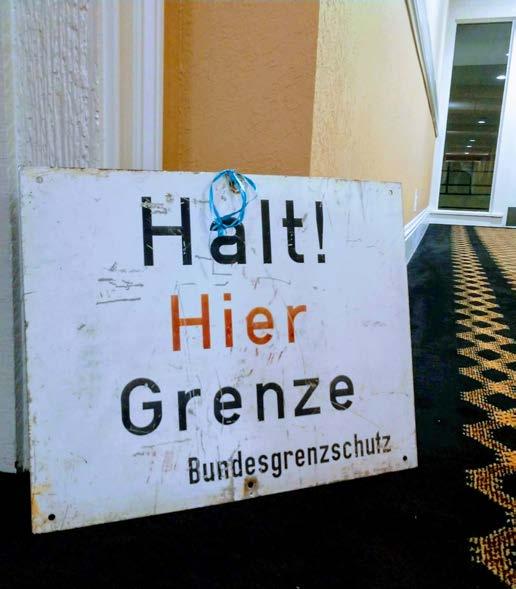
States closing borders may seem an obvious response to corona. But instead of states exercising their territoriality making them shine as champions of their people and in so doing enhance territorialism and, who knows, populism, why not have borders made-to-measure?
Witness the case of the Belgian-Dutch border cutting through the premises of an outlet straddling the border: Half of it was closed with the other keeping in business. The same border cuts Belgian inhabit ants of a cross-border village off from their bakery a few yards into the Netherlands. Witness also German federal officials without much notice closing the border in the iconic Eurodistrict Strasbourg-Ortenau. (See: ‘Triumphant Territorialism?’)
But in ‘Roma, Corona and Territorialism’ I give examples of, rather than whole jurisdictions, Roma districts of Bulgarian towns being sin gled out for closure, giving me pause for thought: functional or discrim inatory? I have learned now of a similar situation in Göttingen, an old university town. A dilapidated block of flats with the down-and-outs of otherwise well-to-do Germany being literally speaking caged in with, probably not unlike in Bulgaria, police fighting off those trying to break out. Difficult to deny the functional necessity in the hope that the dec ade-long neglect of social housing might be reversed.
Talking about lock-downs, I have learned why, when they closed other borders, German federal authorities kept the one with the Netherlands open: North Rhine-Westphalia, the largest of the sixteen Länder had objected. Its head of government – German Länder have constitutions, governments, cabinets, ministries, their own policy and so forth – Armin Laschet, is a CDU grandees and a candidate for Angela Merkel’s succession. From Aachen, it is said he appreciates open bor ders and may have thrown his weight around. There is after all already much integration ‘on the ground’, with countless Germans working in The Netherlands and Dutch having set up home in more spacious and affordable housing in Germany. To severe links would have caused much disruption, it is argued.
Another topical example of functional rather than territorial bound aries being drawn relates to a new corona outburst at Gütersloh, also in North Rhine-Westphalia. As the head of government, together with his minister of health, as I write the same Laschet takes a personal hand in managing the outbreak at a meat factory. Living in crowded condi tions, hundreds of workers from Central and Eastern Europe are so far the only ones affected. The plant has been closed, and so have schools in the district, but as of 21 June 2020 Laschet avoids a lock-down, with the authorities targeting the migrant workers in their residences, most of them in one district directly: a more tailor-made, admittedly resource-in tensive, but functional approach.
12 FIRST PUBLISHED 21 JUNE 2020.
In March, James Meek (2020) pointed out that the news was prioritising ‘our’ casualties and ‘our’ people stranded over seas and travellers ‘here’ being infected by a traveller from ‘there’. This encourages suspicion, hostility, racism, tighter borders, violence even. ‘Sometimes the coverage becomes the vehicle for a criticism, implicit or explicit, of something “their” society does that “our” society – we imagine – would not…’. True, but closing borders is in the nation state’s gift. As Murphy (2020, 29) says, it serves ‘…to strengthen the institutional relationship between state and society…’ The editor of the volume where Murphy and others write about territoriality defines the latter as ’…the actions or behaviours used to control or exert power over a geographically designated space.’ (Storey 2020, 1) Earlier, I have drawn attention to territoriality affecting cross-border cooperation. There would be more to tell, but here I draw atten tion to a French think tank already referred to when discussing David Djaïs (2019). Its new report (Coatleven, Hublet, Rospars 2020) proposes changes with potentially revolutionary effects on territorial governance – which is why I surmise it will not be followed. Before presenting their proposals, the authors praise German crisis management and relate it to federalism. I beg to differ: Vying for votes, much as national ones, Länder governors, too, invoke territoriality.
You might say: So what? Three cheers for democracy! Yes, but how we practice democracy – territory by territory – makes for the very territorialism I criticise. Federalism does not change one iota of this.
The French report’s other proposal goes at the heart of the matter. It argues for tailor-made arrangements following func tional rather than territorialist logic. The point is: in highly inte grated areas such as the ‘Grand Region’ around Luxembourg and the ‘Grand Genève’ it is reasonable to assume that the incidences of COVID-19 will be the same throughout. Pointing to arrange ments already in place under the Water Framework Directive 2000/60/EC, the report proposes for border communities making joint contingency plans for tackling common threats. For which purpose EU law should make European Groupings of Territorial Cooperation (EGTCs) mandatory. Whatever its effectiveness in dealing with COVID-19, this could prove unacceptable to EU member states. They have always been suspicious, accepting EGTCs only on condition of their being voluntary and restricted
to matters not reserved for sovereign states. Closing borders –exercising territorialism – clearly is.
Of course, if this were to be accepted, the Commission would be elated. If ever it did, it no longer entertains the idea of a European federal, let alone a super-state. At the same time, being against states holding a monopoly on the exercise of terri toriality is in its genes. By the same token, insisting on this, their prerogative is in the member states’ genes. Territoriality remains a bone of contention. (Faludi 2016)

PHP?CURID=88496032

Promoting cross-border cooperation, in the pro cess gathering support for integration in general and for Commission initiatives more in particular has begun with assisting bottom-up initiatives. Cross-border cooperation can soften up bor ders, in so doing weakening the states’ hold on their territories, reason enough for governments in turn to be sceptical. When it comes to approving the EU budget, the European Parliament on the other hand is supportive.
Territorialism becomes manifest at or near borders where distant capitals may cause resentment anyhow. Having an axe to grind with them, the European Commission forges coalitions with those areas. (See: ‘Territorialism in the Cross Hairs’)
Surely, one of the reasons for the grievances of border areas is their being disadvantaged. I am not expert on social justice but when the occasion presented itself at the ‘Warsaw Regional Forum 2019’, I was seeking to relate the issue to the prevail ing territorialism. The gist of my argument was that, instead of articulating spatial justice in terms of territories – the ‘areas left behind’ discourse – our world of overlapping spaces invites thinking about spatial justice in other terms.
After World War One Germany had to acquiesce to the border with Denmark – itself the outcome of the war of 1864 discussed further below – being redrawn. Depending on the preferences of the owners of individual properties at the time, it now zigzags through built-up areas. (‘Territorialism Follies’)
In many a blog, my interest in the French Revolution becomes evident, but before the French there has been the American Revolution. In ‘Philadelphia Revisited’ I discuss the ‘Declaration of Independence’ adopted there. Remarkably, it foresaw in the possibility of change. Presently, circumstances do change, warranting a ‘Declaration of Interdependence’, being the title also of a recent paper of mine. (Faludi, 2021)
Next to having a people and a territory, the state must have sovereignty. The belief in what I call ‘Sovereignism’ is the topic of a separate section below. Here I discuss the urgent need for sovereignty in the EU to be shared, which is at the same time controversial. I draw on the historic example of the American Civil War not having been fought as commonly thought over slavery. Its abolition has been a consequence rather than a cause of what is also called the ‘War Between States’ fought over the nature of the Union and where it left the sovereignty of the ‘Rebel States’. (McPherson 1988) ‘No European War of Secession’ assumes that
the EU and the US have formed a transatlantic union called ‘Free World’ just as Timothy Gordon Ash (2004) has proposed. The plot is that France under a newly elected far-right President decides to secede, evoking strong reactions leading to her impeachment, and France rejoins the Free World.
The next blog I wrote upon our return from five weeks in Vienna. With Austria’s presidential elections having been won by a hair’s breadth by the liberal candidate against his challenger from the populist Austrian Freedom Party, the country had made news already. Meanwhile, the leader of the Freedom Party – not the same as the presidential contender – had disgraced himself. The leader of its senior coalition partner, Sebastian Kurz of the Austrian People’s Party had formed a coalition with the Greens instead. But meanwhile, Kurz himself is accused of corruption, the topic of the next blog ‘Banana Republics?’
Note the plural pointing to more governments having prob lems with the – my favourite term – ‘production of democratic legitimacy’. Indeed, territorialism may – and often does – beget populism, the focus of the remaining blogs in this part.
‘Nordregio a Model?’ presents an unlikely candidate for dis cussing it, but in appears that even ‘up there’ border closures due to Covid-19 have accentuated differences between coun tries much as the preference of one’s own.
Anyhow, my readings since ‘The Poverty of Territorialism’ have made me think that there is this organic link with populism. A recent work by Pierre Rosanvallon (2020) has strengthened the idea, with Jan Werner Müller (2017) adding to my understand ing of the phenomenon. But in either case the link with territo rialism is implied rather than explicit, resting on the unspoken assumption that the people whose articulation of their political rights these authors discuss inhabit one and the same territory.
But who is ‘the people’? A hint as to uncertainty in the matter can be found in an earlier work of Rosanvallon (1998) where he describes the people as elusive (introuvable). But he does so in the sense of it being difficult to identify the people as a political subject without questioning its meaning simply as the inhabitants of a well-defined territory. But would it not be in the true spirit of democracy to take into account all those con cerned, wherever they live?
Having voiced this, my mild concern about Rosanvallon, ‘My French Connection’ is about my appreciation for his having given me an understanding of the impact of the French Revolution. Showing that the same revolution has made the people the sub ject of politics, Sherif Zakhour (2020) discussed in ‘Stockholm Calling’ has added to this. ‘I Could Have Done Better’ takes this one step further. Yet there has been no clear idea at the time as to how to — the term underscoring that it is not a given — ‘pro duce’ democratic legitimacy.
In this respect, that the people is the sovereign already carried within it the germs of populism. Which became evident when, after a coup and a stage-managed referendum, the newly elected President of the short-lived Second Republic – a nephew of Emperor Napoleon – became Napoleon III. One can see the logic behind a referendum making good, as it does, on the fiction of ‘the people’ being a unified body. After the French Revolution, Napoleon himself had assumed the role of First Consul — and subsequently of Emperor — in the name, and with the formal approval of the people; see Roberts (2014). Indeed, Müller (2017) tells us that referenda are always the favourite means identify ing the people with their leader.
By now, readers will appreciate that I have this, albeit ama teurish appreciation of history. My quest started with learning about World War Two. Now, neither territorialism nor populism as concepts seem to have been invoked to cast light on the development of Hitler’s Third Reich. But its legal theorist Carl Schmitt (see: ‘Territorialism, Populism and the Third Reich’) could very well be read to have presaged both. German planners ren dered his ideas — for which he has never been taken to account — more concrete and prepared the ‘Generalplan Ost’ cleansing a vast area in favour of German colonists with murderous con sequences for the locals.
The same blog seeks to make yet more evident the link between territorialism and populism. World War Two and its aftermath have given me an abiding interest also of Nazism. Amongst the first books in the library of my stepfather were Eugen Kogon (1946) and Carl J. Friedrichs (1957). Later, I gained a better overview from reading Shirer (1960) a second hand copy of which I had purchased at a bookstore in Tel-Aviv where I had spent two months of practice as the architecture student I was at the time. What followed were many more readings ever since. Falling prey to the follies of nationalism-cum-territorialism has not been a privilege of large states. The effects in the Western Balkans are discussed in another section, but one need not look that far. Take Denmark risking war with Prussia over turning its German possession Schleswig into a Danish province proper. I discuss this based on a TV series ‘The Year of 1864’. Cooper (2021) points out the reverberations right up to the present.
Territorialism invites populism, and populism would be nowhere without territorialism defining who is qualified to vote. Politicians need to win the people’s support at the ballot box. In so doing, there is just unrestricted competition up to the moment of vote counting (which, as we know, candidates may also seek to manipulate).
Watching the storming of the Capitol in Washington DC in January 2021 on TV, I discerned evidence, not so much of ter ritorialism, but surely of populism. The adulation of – and the
identification with – the great leader are textbook examples, much as the disregard for evidence and the hatred of experts. ‘No Fraud’ homes in on one aspect, and one aspect only: Amongst the storm troopers rushing up the stairs I discerned a banner reading ‘AmericanPopulistParty.com’. Other than the historic party under this name which Rosanvallon (2020) discusses, no such party seems to exist, but this gave me another opportunity for reflecting on the meaning of populism.
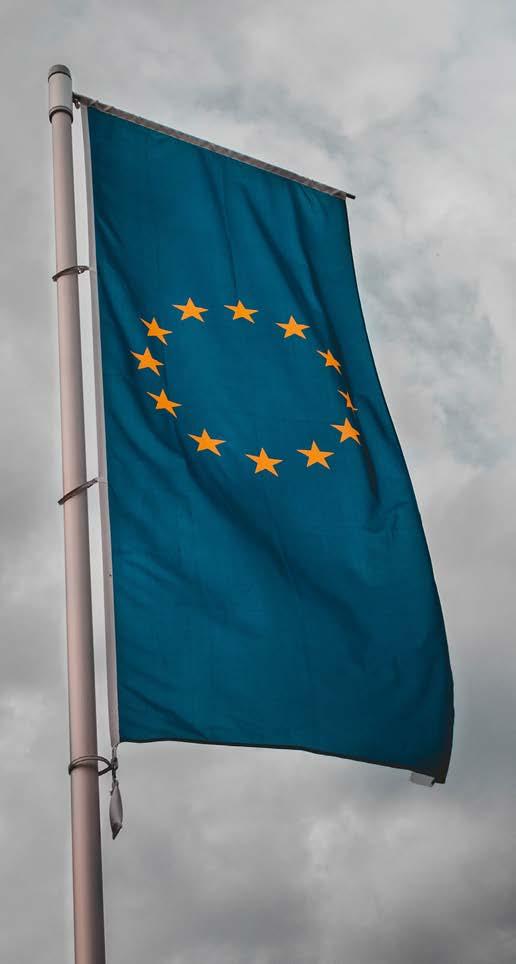
Contending with state borders and their divisive effects, those in cross-border cooperation are with me in having ter ritorialism in the cross hairs. They are the ones with first-hand experience of the divisive effects of borders and the advantages of working with their neighbours in overcoming them. The EU helps, not only financially but also with creating the necessary instruments. Recipients are appreciative, member state less so: Cross-border cycling routes and exchanges of folk dance groups are innocent enough, but where does their being managed using instruments under EU legislation leave the states? Albeit reluc tantly, the latter have allowed European Groupings of Territorial Cooperation (EGTC) to be set up to facilitate the joint manage ment, not only of cross-border programmes, but others as well. (The European Spatial Planning Observation Network ESPON is for instance an EGTC.) But there can be no transfer of regal powers and EGTCs are purely voluntary. Some member states are dragging their feet. They will do only more so as regards a proposed European Cross Border Mechanism (ECBM) allowing border authorities to apply regulations of their neighbours. Taking the state’s legislative monopoly literally, for member states this is a non-starter.
Be the future of the ECBM what it may, 2020 has seen 15 years of working with EGTCs. The French Mission Opérationelle Transfrontalière (MOT) has invited to a – virtual – what else? – conference on 9 and 10 November of that year. The focus was on France’s borders, including her one and only land bor der with the Netherlands (Saint Martin - Sint-Maarten in the Caribbean). But the main emphasis was of course on France’s continental borders. I single out two examples of sovereignty being asserted, with adverse effects on border regions: reactions to COVID and Brexit.
The deep meaning of sovereignty, the German legal the orist Carl Schmitt of doubtful credentials (see ‘Territorialism, Populism and the Third Reich’) is to be able to institute states of exception. Faced with COVID, declaring states of exception leading to abrupt border closures makes otherwise loyal local officials cringe from their disruptive effects. But to governments, borders are where their responsibilities – that for the health of their subjects included – end. To mayors and regional officials concerned, the many functional relations – including mutually
1 FIRST PUBLISHED 18 NOVEMBER 2020.


beneficial health services – being disrupted by border closures concern the lifeblood of their regions. So, when sometimes brand new cross-border infrastructure was abruptly closed – the Léman Express connecting Annimasse in France with Geneva (paid for by local taxes) much as the new cross-border tramline from Strasbourg to Kehl (see ‘Triumphant Territorialism?’) such examples not only hurt, they are evidence of distant capitals invoking their regal powers no matter what.
Talking about distant: take Brest, 600km from Paris and a bare 150km from England fearing for its future post-Brexit (the latter being the ultimate of territorialism at work). There seems no future for INTERREG involving the UK. Otherwise, too, the effects could be devastating for the Finistère in the extreme west of Brittany dependent on UK trade and tourists (and hav ing affinity with the Cornish people and language).

On 17 October I was invited to speak at the Warsaw Regional Forum 2019 'Towards Spatial Justice - Territorial Development and Marginalization'. Reacquainting myself with Warsaw and meeting Polish colleagues – my last visit dated from 2013 – was a pleasant experience, in particular since my host from the visit to Sopot only weeks before, Jacek Zaucha, as well as the chair of the Strategic Advisory Group of the ESPON project (of which I had been a member) deliberating on a 'European Territorial Reference Framework', Jacek Slachta also spoke.
I come of course from studying European spatial planning and in its wake EU territorial cohesion policy. The link with spa tial justice is obvious: With territorial cohesion an objective and a shared competence, the EU conceives of spatial justice as a matter for the Union as a whole. Which implies that it conceives of its territory as an envelope to the territories of its members. But in 'The Poverty of Territorialism' I criticise territorialism based on the assumption of the world being divided into boxes, some of which could and should be combined and stored away in a larger boxes like the EU. This neat division into unique spa tial entities ignores criss-cross relations and their implications for governance. But when considering spatial justice, is it not the case that one necessarily relies on the presence of identifi able territories, each the home to a people with whom one can associate? In other words, is territorialism not a precondition for the pursuit of spatial justice? My answer has been that on the contrary we must differentiate notions of spatial justice to suit a world of overlapping spaces.
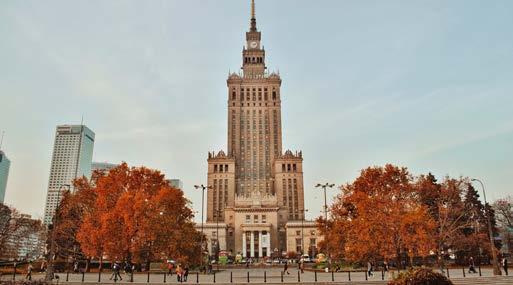
In ‘The Poverty of Territorialism’ (Faludi 2018), I profess to my infatuation with borders. So, when learning that on 15 June, 2020 it has been 100 years since, undoing some of the losses of the Second Schleswig War of 1864, Nordschlesien rejoined Denmark, I pricked my ears. I remember the latter war from school in Austria: ‘We’ sent steam frigates named after Field Marshall Radezky of Radezky March fame and one named Admiral Tegetthoff (no Vienna waltz as far as I know). Those were the days when an Austrian navy assisted the Prussians against the Danes! (Only 3 years later, in yet another war, this time against their former brethren-in-arms, the Prussians had the better of us, accelerating the decline of our Austrian – soon Austrian-Hungarian – Empire.)
Although aware of, currently strong German-Danish cross-border cooperation, I admit that I have never before turned my gaze on that region, maybe because of my recollection of Lord Palmerston, the then British prime minister saying: “The Schleswig-Holstein question is so complicated, only three men in Europe have ever understood it. One was Prince Albert, who is dead. The second was a German professor who became mad. I am the third and I have forgotten all about it.”
But there is good information to be had from the Nordschleswigsche Zeitung serving the German minority, descendants of those who after 15 May, 1920 – the date when it had been drawn – were north of the new border. This Germanlanguage paper has published the full text of the speech held by Danish Prime Minister Mette Frederiksen at the occasion of the centenary (in Danish). That was also when she made an oblique reference to the notorious inconvenience suffered by residents along the border due to different Corona restrictions (as I write still not yet having been mutually adjusted let alone revoked). I have reported on this website on similar cases along the BelgianDutch border dividing not only settlements, but also premises into two. (‘Triumphant Territorialism’)
So with the German village of Rosenkranz and its Danish counterpart Ruttebüll/Rudbøl. The paper reports a local resident recounting that border having been redefined in 1920 zig-zag ging between individual properties depending on whether their owners wished to belong to Denmark or remain in Germany. Not only are the inhabitants now suffering from that division, 3 FIRST PUBLISHED 27 JANUARY 2020.
the border was delicate after World War II. Suffering one of the least vicious German occupations, Danish sentiment after war’s end was bitter, nonetheless. So, after 5 May, 1945 inhabitants on either side were forbidden even to talk to each other, the Nordschleswigsche Zeitung reports, and as late as 17 August of the same year its own premises were blown up, perpetrators unknown, with the Danish authorities letting the matter rest. But I am sure, with minorities on either side, and the hopefully shortlived inconvenience of different Corona-regimes notwithstand ing, the nationalistic fervour caused by 19th century teachers and preachers constructing national languages and songs and histories leading, in this as in other situations to much bloodshed will settle down for good. There are other parts of the world I would be less sanguine about.

No, this is not about renewing my all-too-brief acquaintance with Philadelphia at the occasion of some event at the univer sity in the mid-2000s. At that occasion, naturally, I could not fail to visit Independence Hall, the site commemorating the famous Declaration of Independence and the American Constitution at what then was the Pennsylvania State House, now a museum managed by the U.S. National Park Service.
I had become aware of the American Revolution at the age of ten when reading a book for youthful readers like myself. The plot was set at around the time of the Boston Tea Party and recounted the adventures of an apprentice to a silver smith by the name of Johnny. After an accident at work, he could no longer pursue his trade, making himself useful instead as a mes senger boy working for various conspirators against the English oppressor. It was a good way of raising my interest, conveying the message also that the American Revolution was one of decent burgers – local artisans and merchants – against their distant colonial masters. Having made some decisive contribution con veying messages between the conspirators, a local doctor prom ised to operate Johnny to enable him to eventually become an accomplished silver smith.
The Tea Party was one thing, the Philadelphia Convention declaring independence considered to be one the milestones on the way to develop democracy was quite another. However, in ‘Declaration of Interdependence’ (Faludi 2021) I argue that, presently, the freedom and welfare of the people require forms of democracy fit for an interdependent world.
In this I have been fortified by reading the Declaration of Independence itself where it says that, if a form of government becomes problematic, it is the right of the people to alter or to abolish it. It is this right that I want to trigger, criticising the pre vailing territorialism which treats states as the privileged units of analysis and action, in so doing negating interdependences between them. In so doing, in that paper I refer also to other authors who, each in their own way argue the same: Seeing more sense than is commonly the case in the advisory role to the Committee of Regions as complexifying EU decision-mak ing in ways that match the interdependence between states and regions, Piattoni and Schönlau (2005) are a good example.
4 FIRST PUBLISHED 9 OCTOBER 2021.
Another is Blatter (2019) proposing Associative Parliaments for dealing with matters common to two or more states. Lastly, Eichenberger and Frey (1999) separate decision-making on ter ritorial and functional matters, making concrete suggestions also for EU governance (which could come in good stead now that EU enlargement seems to be grinding to a halt).
What I did not say in that paper is that all this would be grist to my mill, bringing EU governance closer to the ‘neo-me dievalism’ which I advocate in ‘The Poverty of Territorialism’ (Faludi 2018).

After deliberating about the Future of Europe, a new Community dealing with the Single Market remained open to all European states. Many a former member remained. Members of the one-time European Free Trade Area, including a chastened UK also joined, but Switzerland took longer. Eurozone members entered a Federal Union with a parliament, government, presi dent and court, its Constitution guaranteeing their sovereignty in all matters that were not its exclusive competence: ‘dual sov ereignty’.7 But joining, members forfeited the right of seces sion. The Federal Union then entered a ‘Free World Compact’ just like Timothy Garton Ash (2004) had proposed. Henceforth, any attack on the freedoms under the Constitution of one con cerned all. The partner was a US under President Joe Biden soon to hand over to Kamala Harris.
All would have been well, had it not been the case that, having garnered a puny 51.2% of the vote only after her leftwing populist competitor had backed her, an extreme right-wing French President gave notice of seceding and withdrew the French nuclear force de frappe from under the joint command.
For the first time since 9/11, President Harris invoked ‘Article 5’ of the NATO Treaty and similar articles in the Free Word Compact. Threatening to form, together with like-minded other member states the Confederate States of Europe, France had become a clear and present danger. To avert a European Civil War, a hastily formed cross-party majority of French parliamen tarians declared the President to be in breach of la Constitution française. The Article of Accession had after all made the Free World Compact its integral part.
With angry masses roaming the streets, the paramili tary Compagnies Républicaines de Sécurité (CRS) of ill-repute amongst citizens — some of them in any case — were stood down. Unarmed executives from the Federal Union — no Germans
5 FIRST PUBLISHED 4 OCTOBER 2020.
6 LIKE CRICHTON (2004) I DECLARE THIS TO BE A WORK OF FICTION. BUT FOOTNOTES ARE REAL.
7 NOW HALF-FORGOTTEN BUT MEANT TO BE ON ITS WAY AND TO CONCLUDE UNDER FORMER BELGIAN PRIME MINISTER AND LIBERAL MEP GUY VERHOFSTADT IN THE FIRST HALF OF 2022, AT THE TIME OF WRITING THE CONFERENCE ON THE FUTURE OF EUROPE HAS BEEN DELAYED.
included — were observing the French military nipping a poten tial Second French Revolution in the bud. A hastily convened Constitutional Convention inaugurated the Sixth Republic. It cur tailed the powers of the executive presidency, already the butt of criticism of French political philosopher Rosanvallon (2018). France would never again put herself above the Constitution of the Federal Union nor the Free World Compact. The ex-Presi dent was banned to the Île d'Yeu off the Atlantic coast8.
8 HAVING RECEIVED THE DEATH PENALTY FOR COLLABORATION WHICH (HAVING ENTERED SERVICE BEFORE THE GREAT WAR IN A REGIMENT UNDER HIS COMMAND) DE GAULLE COMMUTED, MARSHALL PÉTAIN SPENT THE REST OF HIS LIFE A PRISONER THERE.
THE EU SINGLE MARKET. DARK BLUE ARE EU MEMBER STATES. LIGHT BLUE ARE NON-EU COUNTRIES PARTICIPATING IN THE SINGLE MARKET THROUGH THE EEA OR OTHER AGREEMENTS. MAP BY ROB984, PUBLIC DOMAIN. SOURCE: HTTPS://COMMONS.WIKIMEDIA.ORG/W/INDEX.PHP?CURID=41032947
In post-war Vienna we used to listed to a satirical broad cast from the US occupiers waiting eagerly to hear: ‘When Harun al-Rashid roamed the streets of Baghdad in private…’, followed by something that had transpired during the week. Asking bystand ers about the why and how, the Caliph always received the same reply: ‘Stranger, you should know you are in Baghdad!’
Likewise, foreign observers wondering about why former federal chancellor Sebastian Kurz facing criminal charges has taken so long handing in his resignation – he has left politics alto gether since, awaiting his trial on corruption charges – might hear: Stranger, you should know you are in Austria! Dutch columnist Caroline de Gruyter (2021) with insider knowledge invokes the early-19th century Austrian Foreign Minister Count Metternich claiming that the Balkans started right outside his palace on a road in south-easterly direction from Vienna.
But behold! Heading for Vienna, we left a Netherlands embroiled in crisis, crossed a Federal Republic soon to enter one10 and, while we are at it, there is the Czech Republic trying to make sense of the outcome of its elections with a defeated prime minister accused of all manner of things pinning his hopes on a maverick presidential incumbent in intensive care asking him to form the next government11 .
To understand each situation, one would need to know more. But they have in common that they show the produc tion of democratic legitimacy being problematic. Oh, yes, eli gible citizens enter voting booths or mail in their ballot papers, but how do politicians get them to give them their votes? What Kurz is accused of – whether or not wrongly is for the courts to decide – is having arranged for the boulevard press to publish fake opinion polls in exchange for advertisements paid for with public money. The reader is invited to add his or her own exam ple of engineering election results.
I came across this for the first time when reading about American political machines arranging for party bosses gaining – and holding on to – power. Writing on the allocation of pub lic housing in Chicago, Meyerson and Banfield (1955) have doc umented and discussed this in detail. It would take somebody
9 FIRST PUBLISHED 12 OCTOBER 2021.
10 SINCE WRITING THIS, THE FEDERAL REPUBLIC HAS OVERCOME THE PROBLEM FORMING A ‘TRAFFIC LIGHT COALITION’ OF (RED) SOCIAL DEMOCRATS, (YELLOW) FREE DEMO CRATS AND THE GREENS.
11 THE READER SHOULD KNOW THAT, SITTING BEHIND A PLASTIC SCREEN – HE HAD COVID – HE HAS BEEN REDUCED SINCE TO SWEARING IN ANOTHER CONTENDER, PRESU MABLY LESS TO HIS LIKING.
with more relevant knowledge than me to make the comparison with what in Austria is called the ‘System Kurz’, but his ruthlessly taking over a right-of-centre party conventionally in power with a team of stalwart supporters, changing its name and the colour under which it is known point in the same direction. And, not to forget, the real, or alleged pay-offs to supporters…
There are no easy answers. In the US the reaction to what was called ‘machine government’ was to remove certain issues – to remain with planning, for instance on zoning – from pol itics. This was called ‘clean government’, overlooking the fact that it favoured the middle class. Which might also be said of giving a greater role to experts. All of this only goes to show that, how to operationalise the democratic ideal – and, I would add, whether to do so territory by territory rather than issue by issue – needs rethinking.

In a film about neutral Sweden during World War II, the pro tagonist, a young woman hiking near her home sees an escapee from Norway fall dead into the brook marking the common bor der. The German officer of the occupying force calmly puts away his gun, saluting the Swedish border guard having rushed to the scene. Hesitantly, the latter returns the salute. Who recovers the body we don’t learn.
What is now Nordregio with the ambition of becoming the most sustainable and integrated region in the world by 2030 (Braun 2021) was split between neutral Sweden, Germanoccupied Denmark and Norway and the ally of the Wehrmacht fighting the USSR Finland.
A good Swedish friend told me once about a Norwegian recounting his own father having taken the same dangerous route as the dead man in the film. Having been apprehended by the Swedes, during his medical check-up, his father had asked for a cigarette. Having seen that it was his birthday, the doctor had given him the whole packet. The doctor having been my friend’s father, the story was part of the family lore. Having found each other much later, my Swedish friend and the Norwegian took advantage of the chance discovery of their mutual bond and shared a good bottle of cognac.
I was reminded of both border episodes when reading a Nordregio Report on the effects of Covid-19. (Giacometti, Meijer 2021) Now part of Schengen, the Nordic Passport Union has enabled citizens to travel and reside in any Nordic country since 1954. On frequent visits, Copenhagen‘s Kastrup airport rather than Arlanda at Stockholm was more convenient for reaching Karlskrona, a three hour plus journey through the undulating South of Sweden with a Danish rail company. Until Sweden’s uni lateral border closure to stem the flow of refugees coming to the same airport at Kastrup, this was more convenient but became less so when passports were checked at the first Swedish sta tion at Malmö. The very platform from where I used to departand where friendly locals gave refugees food and advise - now features in the report on Covid-19: If only for different reasons, passengers coming from Sweden are now being checked upon entry to Denmark. Consider that, thanks to the Øresund Bridge, Copenhagen and Malmö are closely integrated to the extent of their having a joint Øresund University13
Yes, like in the rest of the Schengen Zone where freedom of travel had reigned, border fences have reappeared as ‘… a strong reminder that we are still living in the age of the nationstate’, as Giacometti and Meijer (2021, 15) say, quoting Hwang and Höllerer (2020). This even where, as in this part of Europe, people are generally able to communicate in their own language and where English is very common anyhow. (As the film I have seen shows, this was not yet the cases during World War II!) So, as the Nordregio report once again states, closures inflict sig nificant costs, separating families and friends, disrupting access to work, education and basic services, give communities that have not seen anything like this since World War II a shock. Worse still, there was a surge of nationalism ‘…driven by the frustration of conflicting approaches in neighbouring countries ... often fuelled by sensationalistic and one-sided media cover age14.’ Sounds familiar?

‘The French Connection I & II’ featured a star at the time, Gene Hackman, chasing international drugs traffickers to their base in Marseille. I have a, perhaps morbid interest in the mili tary craft, so I once saw a film about the training of US Marines. A former marine himself, Hackman had narrated it, so this was maybe why he seemed to know perfectly well how to take out the boss of the traffickers from where he was: on the quay while the latter on a yacht leaving the harbour was a moving target.
My own French connection comes from a wanton idea of resuscitating my French from under my working languages English and Dutch by reading dirt-cheap pockets. There have been other occasions for practicing it since, for instance Max Gallo of the Académie Française, a grand narrator of French history, writing about the French Revolution as if he had been there. More the oretical, Pierre Rosanvallon taught me the signal importance of that same event for the development of democracy. Professor at the venerable Collège de France, he is my source on its his tory, being the author of a series of books which in the mean time he has capped with one on populism. (Rosanvallon 2020)
In ‘The Poverty of Territorialism’ I avoid making this connec tion. The only covert reference is where I suggest that, like reli gion of which Karl Marx has said that it was opiate for the people, so with territorialism. (Faludi 2018: 49) But there is a stronger link, in particular where the production of democratic legitimacy by way of elections territory by territory is so to say territorial ism's last line of defence. In this way, the territory concerned, or better to say the people of that territory become the centre of attention. Broad-minded politicians may of course propose policies catering to more than the immediate interests of their electorate, but doing so makes their political future uncertain. The people’s immediate concerns getting preferential treatment seems more the rule than the exception.
So, when hearing about this new book I pricked my ears. It makes clear that territorialism — not a concept Rosanvallon uses — is popularism’s twin. Which becomes evident where Rosanvallon discusses populism, and well under five headings: A view of the people in terms of them and us; a theory of democ racy amounting to the ‘cult of the referendum’; a modality of representation aiming at identifying a ‘natural leader’ who per sonifies the people; a politics and philosophy of the economy
of national protectionism; a regime of passions and emotions. It is clear that ‘them and us’, ‘personifying the people’; and above all ‘national protectionism’ all implying bordering the people’s common property justifies my saying that territorialism is pop ulism’s twin.
Knowledgeable about developments worldwide, Rosavallon's book includes essays on populism in Russia and the US (where a Populist Party mounted a presidential candidate — not the one you think about — at around 1900). There is a whole part also on populism in South America, but Rosanvallon’s focus remains – honit soit qui mal y pense — French democracy. Which is why he is less focused on France’s borders, indeed national borders generally defining the scope of democratic governance as they do. Trying to cull inspiration from his works for making recom mendations for democratic representation beyond territorialism, you have your work cut out for you.

14 September 2020 saw Sherif Zakhour successfully defend his PhD (Zakhour 2020a) at the Royal Institute of Technology. Comparing planning theorists as to where they stand on democ racy, he makes meticulously fair comments also on my ‘A Decision Centred View of Environmental Planning’. (Faludi 1987) Gratefully, he also intimates that there have been sometimes ill-conceived comments on my earlier ‘Planning Theory’. (Faludi 1978 [1973], see also Zakhour 2020b; for my own, more or less final reflec tions on my planning theory see Faludi 1998).
Zakhour must be praised, not only for his fairness, but also for taking account of Pierre Rosanvallon’s works available in English. Reading it mostly in French may have made me focus too much on the language. Which maybe why I seem to have failed to appreciate Rosanvallon, like his teacher Claude Lefort identifying what Zakhour calls the ‘democratic void’ left by the monarch’s meeting his end under the guillotine. As Hardt and Negri (2000, 102) say, henceforth, like the monarch, the people had to be conceived as forming an organic whole, the nation. Which in turn leads to asking who belongs and who does not, with in its wake questions concerning the territory the peo ple may call its own. In this way, taking possession of – and sub sequently defending – its territories when challenged became a necessity. It was not simply one of enlarging or maintaining the property of the monarch, but a question of the people’s very identity which in turn makes what Balibar (2009, 193) calls the sacralisation of borders necessary.
To the best of my knowledge, Rosanvallon himself has never asked what territory the people should call their own. He is deal ing with democracy within one state: the French. Bear with me –I have not kept up with the planning theoretical literature – but I suspect positioning himself in the triangle formed by ‘liberalism’, ‘voluntarism’ and ‘rationalism’ enclosing the ‘democratic void’, as a planning theorist Zakhour aims to emulate Rosanvallon and Lefort in problematising democracy within one state. In so doing, they are losing sight of the state and the people being encased within fixed borders. It is this, the confinement of the people which makes the production of democratic legitimacy problem atic, because limited to those inside and excluding those outside.
In ‘Stockholm Calling’ – see above - I admitted to my incom plete understand of Pierre Rosanvallon. Sherif Zakhour (2020) has helped me by identifying Rosanvallon’s concern, like that of his teacher’s Claude Lefort to be the void left by the French king ending under the guillotine. Reading Rosanvallon mostly in French, I overlooked this. Meanwhile, I have discovered Jainchill and Moyn (2004) writing in English.
Not exactly missing that the people stepping into the role of the king meant taking over his patrimony, I did not think of this as a central issue. Noting Rosanvallon discussing the develop ment of democratic procedures, whilst paying attention also to the courts and to councils of experts as countervailing forces to erratic electoral outcomes, I had taken notice of his saying that, whilst once carrying the torch of freedom and human rights, the revolutionary nation of 1789 has succumbed to national protec tionism. But I failed to appreciate the full meaning Rosanvallon attached to the term ‘generality’. It means the people forming an organic whole.
In ‘Danton’s Death’, Georg Büchner articulated the underly ing logic as far back as 1835. This logic required no less than the elimination of what under Communism was called left- or rightwing deviationism. The Revolution, like Saturn, was devouring its children, was the saying at the time.
Criticising, as he does, the people being seen as an organic whole, Rosanvallon could also have taken on territorialism: Much like the saying attributed to Louis XIV: ‘The State is me’, territo rialism implies the people being one with its territory. Its hav ing been mapped for the first time had made its shape visible which in turn made identifying with it easier. The revolutionar ies made also sure to homogenise the French territory by letting departments of roughly equal size replace historic provinces. And they quickly decided that the Rhine was France’s natural border. Maybe his problematising ‘generality’ could thus have led Rosanvallon (1998) to question, not only the concept of the people as ‘introuvable’ – nowhere to be found – but also to cas tigate territorialism’s original sin of making territory indivisible. 17 FIRST PUBLISHED 28 SEPTEMBER 2020.
Planning in the Third Reich would have been my pre ferred PhD topic. Presently, Germans, including the ‘Academy for Territorial Development’, make serious efforts to deal with their history19, but when I was considering doing my Ph.D. it was still too early. Here I discuss international literature on the ‘infamous crown jurist’ (Smeltzer, 2018, 591) of the Third Reich, Carl Schmitt, an apostle also of territorialism and populism. No sooner than Hitler had taken over, and he underscored ‘… the importance of unity for the national community…’ (Minca, Vaughan-Williams 2012, 758) not in a metaphorical, but in a concrete sense, by marking lines on the ground as ‘…a sort of material manifestation of how … the state … can identify itself…’ (Minca, Vaughan-Williams 2012, 759) A feature of what we now call modernity, at ‘…the heart of this new European spatial order was the concept of the border … which. … provided for politi cal unity, an end to civil wars, and clear demarcations between jurisdictions.’ (op cit., 763) Against this backdrop, Schmitt was looking for a new spatial order for the German people: theirextended - Lebensraum, eventually leading to the ‘Generalplan Ost’: planners, some retaining prominent positions after the war, foreseeing in the cleansing of vast areas to make room for the master race.
Schmitt eulogising the strong state went hand-in-hand with rejecting liberalism. The rule of law, freedom and equality were ‘…veiled liberal weapons used against the Prussian soldier-state, and by extension, against the essence of the German people.’ (Smeltzer 2018, 598) The state had to ‘…excise liberal elements and replace them with properly National Socialist conceptions of politics and law.’ (ibid) ‘[I]t was the “…people, who exist with out soil, without a state, without a church, only in the ‘law’ who would defend …. liberalism.‘ (op cit., 599) He aimed at the legal scholar Hans Kelsen as the ‘…Jewish jurist without a connection to the soil.’ (ibid). Chased from his university position, Kelsen would end up teaching in the US.
Barnes and Minca (2013, 671) see Nazi spatiality as
‘reactionary modernism’. Post-war, a somewhat chastened Schmitt talked in terms of spheres of influence, ‘...each associ ated with one of a select group of countries that include Germany. [Otherwise - AF] the worst fate that could befall the world would be the emergence of a political void, a “space less” global politics resulting from failing nation states.’ (ibid.) See here the resilience of territorialism. Witnessing its return to prominence now, unsur prisingly, we see its companion, populism, also rearing its head.
NAZI GERMANY IN 1940 (DARK GREY) AFTER THE CONQUEST OF POLAND TOGETHER WITH THE USSR, SHOWING POCKETS OF GERMAN COLONISTS RESETTLED INTO THE ANNEXED TERRITORIES OF POLAND FROM THE SOVI ET "SPHERE OF INFLUENCE" DURING THE HEIM INS REICH ACTION. A RED OUTLINE OF PRE-WAR POLAND IS SUPERIMPOSED HERE OVER THE ORIGINAL NAZI PROPAGANDA POSTER; THE ORIGINAL GERMAN PRINT MADE NO MENTION OF POLAND.[75]. BUNDESARCHIV, R 49 BILD-0705 / UNKNOWN AUTHOR / CCBY-SA 3.0.HTTPS://EN.WIKIPEDIA.ORG/WIKI/HEIM_INS_REICH#/MEDIA/ FILE:DIE_'GROSSZÜGIGSTE_UMSIEDLUNGSAKTION'_WITH_POLAND_SUPER IMPOSED,_1939.JPG.
FOR DOCUMENTARY PURPOSES THE GERMAN FEDERAL ARCHIVE OFTEN RE TAINED THE ORIGINAL IMAGE CAPTIONS, WHICH MAY BE ERRONEOUS, BIASED, OBSOLETE OR POLITICALLY EXTREME.
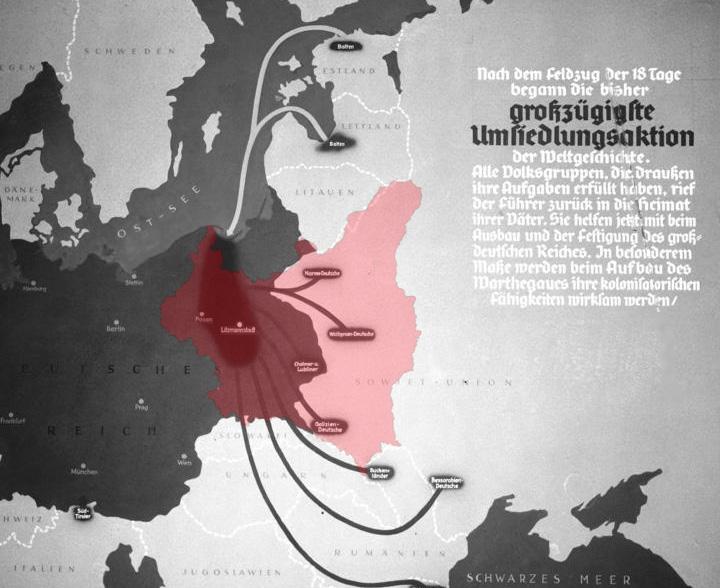
Assuming its audience to be in the know about the signifi cance of the date, the Danish TV series under this title seemed to vindicate Lord Palmerston‘s bon mot (referred to also in ‘Territorialism Follies’) that the issue was beyond comprehen sion. But Danish viewers must surely have understood the mes sage. Others at least learn about a nationalistic fervour making Denmark embark on absorbing Schleswig – of which the Danish king in his capacity as a German prince was the rightful sovereign – into a unitary Danish nation-state. Not only the Prussian King, other German princes too saw this as a casus belli, so Austria sent a navy squadron and Prussia its modern army, giving the Danes a devastating blow. (Within a couple of years, but this is a different story, Prussia would turn on her Austrian ally, mak ing her into the junior partner she remained until her empire dissipated in 1918.)
Discussing amongst others Danish history, Cooper (2021) helps in understanding, not only this episode, but also Danish exceptionalism ever since. So, since Brexit, Denmark is for instance the only country remaining with an opt-out from the Euro (while at the same time aligning the Kroner with the com mon currency, whereas Sweden without one refuses to honour its obligation to exchange her Kroner for the Euro). However, the other opt-out from EU citizenship is the most telling, gar nering, as it did, the largest majority in subsequent referenda against rescinding it. This until, emulating the Danish position of EU citizenship being merely an add-on to national citizenship (a matter discussed in 'The EU a Tangle') the Treaty of Amsterdam made this opt-out meaningless21
More relevant is the, exceedingly tough Danish position concerning refugees. Not even emulating Australia off-shoring asylum seekers is beyond the pale, nor taking their valuables to pay for their upkeep. The nationalists wanting an all-Danish homeland – Cooper’s explanation for the desire to incorporate Schleswig in the 19th century – still seems to hold.
It is a position that sells well, not only in Denmark. Which is why it is sobering to go deeper into Cooper’s take on the sit uation in 1864. The catastrophe, he notes, ’…came not from a miscalculation but from a failure to calculate at all. Denmark was swept along by a torrent of national feeling, and the belief that their cause was right and would therefore triumph.’ (2021, 20 FIRST PUBLISHED 2 SEPTEMBER 2021. 21 HTTPS://EN.WIKIPEDIA.ORG/WIKI/DANISH_OPT-OUTS_FROM_THE_EUROPEAN_ UNION, LAST ACCESSED 7 JANUARY 2022.
114) Only one player considered to be an outsider, the new king speaking Danish with a German accent had his misgivings. But ‘…Denmark was now a democracy and he had no power.‘ (Ibid) Which shows the problematics of the production of dem ocratic legitimacy. It’s not that the people have the ultimate say, rather that it’s the people of, more or less artificial territo ries rather than the people affected that have it. Cooper claims, Denmark’s one-time twentieth century foreign minister per ceived this clearly. He wrote about a common perception ‘…that Denmark’s foreign policy is determined by the Danish government and parliament. … In fact Danish foreign policy is determined by factors over which the Danish government and parliament can exert very little influence.’ (Ibid) Cooper praises this minister for having understood the lesson and steering his country rela tively unscathed through troubled waters. But this is a difficult sell in election campaigns, this whilst such awareness is badly needed, and not only in small countries for that. So, beware of what, with deliberate provocation, I call the democratic illusion of elections being the royal road to rendering self-determina tion operational. What is also badly needed is the willingness and ability to calculate the costs.
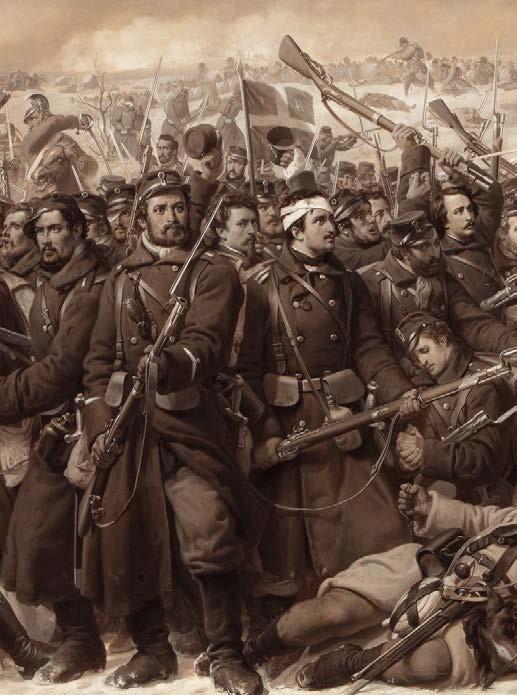
The night from 6 to 7 January, 2021 we saw over and over again the surge up the steps of the Capitol sweeping away security guards. Amongst the flags I spotted a banner: AMERICANPOPULISTPARTY.COM. I googled it and found a website in what seemed Polish with a link to a private domain. Not liking it, I tried American Populist Party instead. It turned out to be a concoction of what the platform of such a party might look like and not the real thing, so the banner before the Capitol remains a mystery. Anyhow, from watching a short video on this same website its, once more fictitious, message would go down well with real populists.
I also recall Donald Trump junior inciting the crowd by chal lenging the Republicans in Congress in the process of deserting his father. According to an excerpt on the internet he addressed the mob shouting: ”This is Donald Trump’s Republican Party!” This was to be expected. After all, according to both Müller (2017) and Rosanvallon (2020) identifying the leader with the masses characterises populism.
Another feature of populists is their disregard for evidence. Famously, faced with photographic evidence that the inaugura tion of President Obama had drawn larger crowds than President Trump’s, his spokesperson at the time had coined the term ‘alter native facts’. And, how many times have we not heard that there is no evidence to support President Trump’s claim that the elec tions had been stolen from him? But for a populist, evidence – or the lack thereof – counts for nothing. Again, Müller and Rosanvallon show why: evidence having no bearing on what populists believe to be the truth is yet another of the features separating them from their distractors seeing this as an episte mological issue. But for populists truth is what binds them and their leader together, what makes them one. To admit to anything else would mean questioning, not only the leader, but also their own self: a question of identity. Which is why populists must declare whoever does not share their and their leader’s believes irredeemably wrong. In other words, they must reject pluralism in an epistemological as well as a political sense. This is a con sequence of their claim to absolute truth, one that reveals itself without any of the filters imposed by the elites. The people nor their leader – being once again one – cannot be wrong. So, why listen to experts, why look for evidence? The issue is existential and as such not up for discussion.
Being softer on populism than Müller – he vouches to it
being a genuine political innovation – Rosanvallon agrees, too, that there is a danger of populism deteriorating into a ‘democra ture’: an authoritarian regime with only limited capacity for reform. Müller sees this more as an innate tendency. Anyhow, it seems we should not have been surprised about what we have seen on our screens.
TRUMP POPULARIZED THE SLOGAN "MAKE AMERICA GREAT AGAIN" BY STITCH ING IT ONTO HIS WIDELY DISTRIBUTED CAP. PHOTO BY GAGE SKIDMORE, PEORIA, AZ, UNITED STATES OF AMERICA - MAKE AMERICA GREAT AGAIN HAT, CC BY-SA 2.0. SOURCE: HTTPS://COMMONS.WIKIMEDIA.ORG/WIKI/FILE: MAKE_AMERICA_GREAT_AGAIN_HAT_(27149010964).JPG

Revisiting the texts in this section, as always considering which title to give it, I latched upon sovereignism, being the complement to terri torialism. The internet was not terribly helpful either, pointing me to a website singing the praise of Bitcoin1. ‘Sovereignist’ rather than ‘sovereignism’ took me to the advocates of the independence of Québec from the rest of Canada. Rather than continuing to search for a dictionary meaning, I decided to revisit Agnew. The first blog in this sec tion harks back to his original paper. (Agnew 1994) It equates sovereignty with the overly simplistic view of the world as neatly divided into self-contained territories, the meaning, of course, which I ascribe to territorialism (a term Agnew does not use). Rather than regurgitating Agnew, suffice it to say that it is illu sionary to think that we can control matters to the extent which sovereignism (and territorialism!) assume.
So, why this emphasis, in particular on the part of the coun tries of Central and Eastern Europe (CEE) on their being sover eign? To answer, consider their motivation in joining the EU. In contrast with the motivation of the ‘old’ member states where, initially in any case, the – perhaps unrealistic – hope has been to move towards some king of new formation – the famous, or infamous ‘ever closer Union’ in the preamble of the European treaties – CEE countries joined to preserve their recently won independence. Which was perfectly understandable in view of their trajectory in passing through the 20th into the 21st Century.
Which is somewhat ironic. A brief count shows that before the 20th century, only Bulgaria and Romania existed in some form or another. For obvious reasons excluding Turkey – nom inally still a candidate – but adding Serbia may bring the grand total to three! All others are recent creations and as such they may be forgiven for their reluctance to be absorbed into an entity _the EU_ which nobody less than Jacques Delors has once famously described as an ‘unidentified political object’2. But by the same token, the ‘old’ member states may also be forgiven for, as Maria Mälksoo points out in ‘Deal with the World as it is’, feeling uncomfortable about the new member states.
‘The Nation: Myth and Reality’ takes this further by pointing first to the turn of the 19th and 20th century, more in particular
1 HTTPS://BREEDLOVE22.MEDIUM.COM/SOVEREIGNISM-PART-I-DIGITAL-CREATIVE-DES TRUCTION-AD5E8EEEDBBF.
2 HTTPS://THECONVERSATION.COM/HOW-DOES-THE-UNIDENTIFIED-POLITICAL-OBJECT -THAT-IS-THE-EUROPEAN-UNION-REALLY-WORK-123425 .
the Austrian-Hungarian Monarchy as it then was, with many nationalities rubbing shoulders. A Socialist – presently we would say a Social Democrat – writing extensively on the matter, Karl Renner was seeking to come to terms with, in particular Czech nationalism. In a revision of his original text from the 1930s that has only been published posthumously, he adapted his views. Suffice it to say that, recognising the allure at the time of nation alism, he insisted on this to be a transitional phase, putting his, as it happens vain hopes in the League of Nations. What would Renner have thought about the VN, let alone the EU? We shall not know. He passed away in 1950.
‘The Construction of Poland’ and ‘The Deconstruction –and Reconstruction? – of Hungary’ both remain with the theme of problematising the grip of nationalism on EU members from Central and Eastern Europe – and not only those - while attempt ing to also cast light on their history. As far as Hungary is con cerned, I also point out the apparent paradox that, using all the instruments the, otherwise not exactly popular EU has on offer, this country is the keenest amongst EU members to engage in cross-border cooperation. But then, the Prime Minister openly pursues a policy of reuniting the Hungarians, if not in one state, then at least in the spirit. Cross-border cooperation, involving the multitude of Hungarians left stranded after the Treaty of Trianon – the Trianon Dictate, as Hungarians call it – in neigh bouring states is a means to this end.
It’s not just that Hungary under Orbán actively engages in cross-border cooperation, it also offers Hungarian citizenship to those with Hungarian roots (If I had the ambition and would re-acquire some basic knowledge of the language, surely I could surely obtain a passport.). His government also crosses swords with the European Court of Justice. ‘Uneasy Bedfellows?’ tells where she could get support from nobody less than the German Constitutional Court. Dutch legal expert Hoeksma dissects the argument and casts doubt on the sovereignism-cum-territori alism which this implies.
‘Nationalism Studies Rebooted’ visits the famous work of Benedict Anderson (1983) ‘Imagined Communities’. He points out the importance of standardising national languages. But do we not live now in a polyglot, multi-cultural world? What is the appropriate form of society and polity? Surely, no longer the unadulterated nation-state!
‘Softening up the Nation-state?’ returns to cross-border cooperation. The author, Estelle Evrard, discusses an instrument proposed by the European Commission allowing cross-border regions to invoke laws and regulations of their neighbours, the purpose being for the border to more and more fade into the background. Her learned argument notwithstanding, member states are not buying this. What I am calling here sovereignism
is in the way.
Lastly, in ‘The Civilisational State’ and ‘A New World Order’ I discuss matters that I am not at all expert in: the role and the ambitions of China. The one thing that seems certain from my very cursory reading is that, whatever else, China does not com bine what one might perhaps describe as sovereignism with the territorialism that, in the EU and, more generally speaking, in the West is its twin. The West has pursued both also in what is now described as the Global South. (For the effects see Badie 2018) China may wish to – in all likelihood wants to – have a dominant influence outside its borders, but it does not seem to want to emulate this example.
SOURCE: HTTPS://COMMONS.WIKIMEDIA.ORG/W/INDEX.PHP?CURID=337672

"THE RATIFICATION OF THE TREATY OF MÜNSTER", ONE OF THE TREATIES LEADING TO THE PEACE OF WESTPHALIA, WHERE THE CONCEPT OF THE "NATION STATE" WAS BORN. BY GERARD TER BORCH - GEHEUGEN VAN NEDERLAND, PUBLIC DOMAIN.
Whilst I write this, there is much to do about (British) sover eignty, and this also in planning. Already in the 1990s the Dutch national planning director for instance thought it unthinkable that ‘Brussels’ should have say over the extension of the Port of Rotterdam. But Agnew (2020, 44) of ‘territorial trap’ fame4 shows sovereignty to be an ambiguous concept. Thus, the ‘…world political map with its neatly coloured blocs of sovereign space is taken to define the world as it is’, but this ignores cross-cut ting functional regimes, like EMU and Schengen. The planning director for instance failed to say that the Dutch decision was impacting the relations of the Netherlands with its European hinterland – and vice versa!
So why this hype about sovereignty? Consider Agnew (2020, 46) pointing out that: ’[m]ost of the world’s self-declared states today have international legal sovereignty but cannot read ily resist the intervention of external powers or authorities, or exercise much by way of effective domestic sovereignty. In prac tice, deviations from the rules of absolute state sovereignty are almost the norm.‘ And: ‘…we are all increasingly aware of emer gent threats and challenges, from climate change to human rights, that cannot simply be addressed at the scale of the state.’ (Agnew 2020, 49) To which he adds: ’Regimes, both democratic and non-democratic, suffer from difficulties in dealing with such issues because of time horizons involving elections or dynastic succession, questions of responsibility (or not) to mass publics who may be massively ill-informed, and the low salience of many so-called global issues … Increasingly, the best approach may be to examine issues in terms of logics of spatial integration and disintegration rather than in terms of fixed territories … One size does not fit all… . The memory of ‘total control’ associated with contemporary sovereignism … is simply a false one…’.
Which is why, depending on what is within the state‘s gift to control, it is useful to think in terms of different ‘sovereignty regimes’. Agnew identifies four such, including an ‘integrative’ one like in the EU where (echoing Jacques Delors having described the EU as an ‘unidentified political object’) ‘… many of the found ing states … have thrown in their lot with one another to create
EUROPEAN REVOLUTIONS OF 1848. THE REVOLUTIONS OF 1848 WERE DEMOCRATIC AND LIBERAL IN NATURE, WITH THE AIM OF REMOVING THE OLD MONARCHICAL STRUCTURES AND CREATING INDEPENDENT NATION-STATES. MAP BY ALEXANDER ALTENHOF, CC BY-SA 4.0. SOURCE: HTTPS://COMMONS.WIKIMEDIA.ORG/W/INDEX.PHP?CU RID=50960616

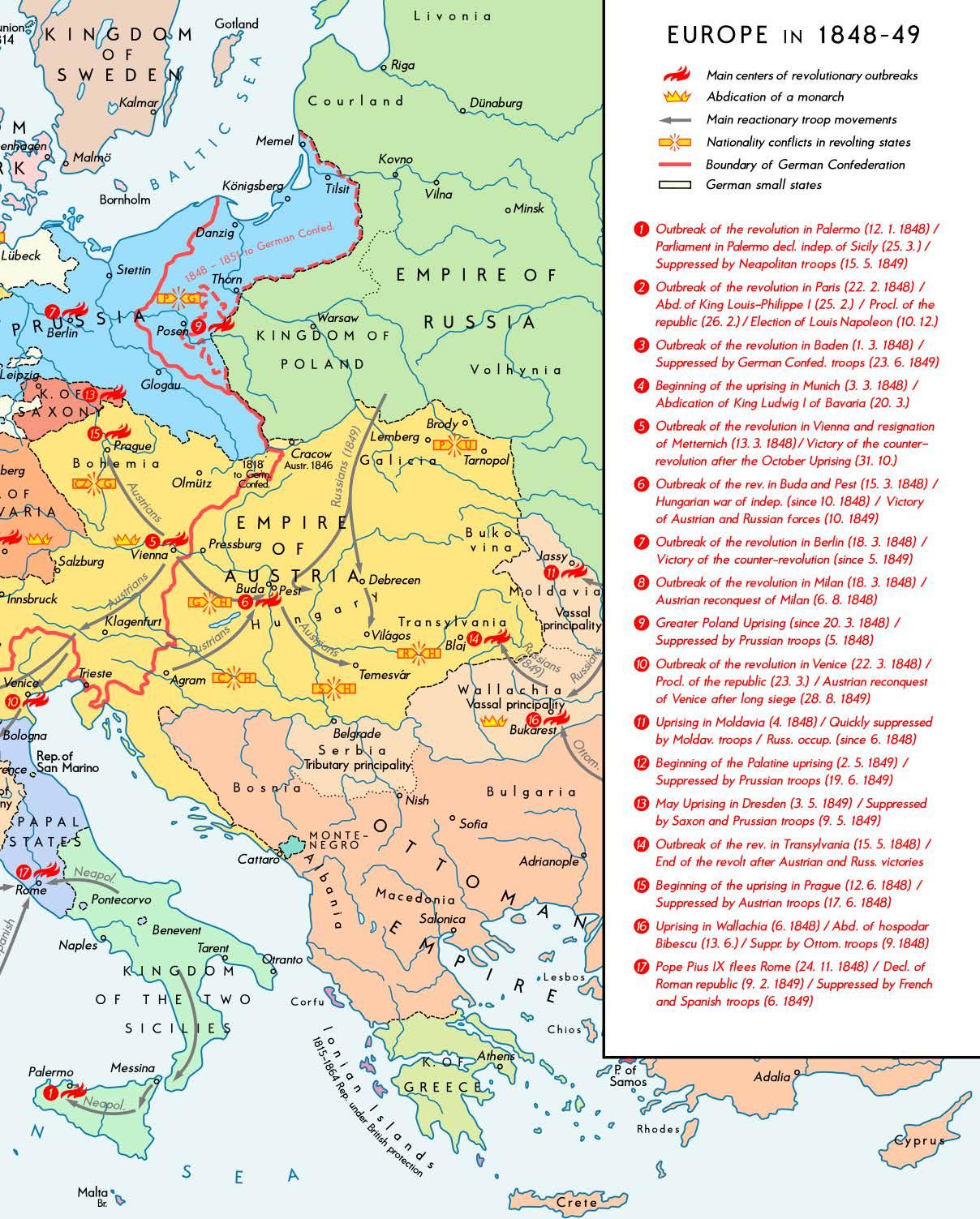
a larger and, as yet, politically unclassifiable entity that chal lenges existing state sovereignty in functionally complex and often non-territorial ways.’ (Agnew 2020, 51)
Why ignore all this? Why did the planning director not con sider the impact of the Port of Rotterdam on its European hin terland and, vice versa, its dependence on markets upstream? To this day, the connection in Germany of a dedicated freight line from the port remains poor and will remain so until at least 20265. The Federal Republic may after all have been more keen on promoting Hamburg rather than on improving the position of Rotterdam. The extension of its port was perhaps not, after all, a sovereign issue!
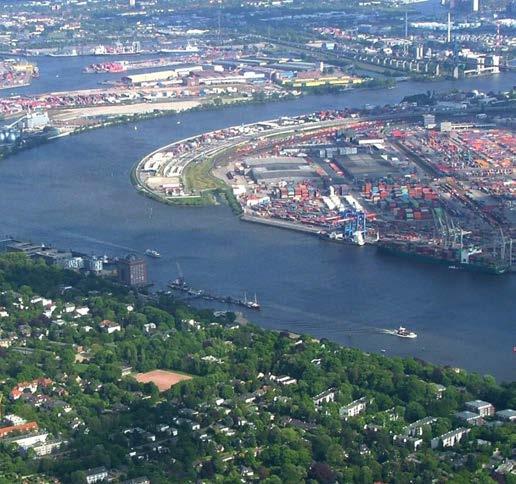
Be that as it may, Agnew (2020, 58) once again warns against falling into ‘…the “territorial trap” of thinking about the world entirely in terms of primordial territorial states without attending to the complexities of the regimes of sovereignty that prevail in given historical periods in different parts of the world.‘ But the blame is not only on the ‘sovereignists’ – French for defenders of national sovereignty. ‘Globalists’, too, come in for criticism for deriding ‘…the concerns of the discontented peasants … It is precisely this either/or view of sovereignty with a world once divided up into secure units … that I have challenged… Even as we … think beyond the state, we must also attend to the fact that states … are still with us for good or ill and whether we like it or not.’ (Agnew 2020, 59)
5 HTTPS://WWW.SPOORPRO.NL/GOEDERENVERVOER/2019/07/22/DUIT SE-DEEL-BETUWEROUTE-OP-ZN-VROEGST-IN-2026-KLAAR/?GDPR=ACCEPT (LAST ACCESSED 21 DECEMBER 2022. 1)
Referring to Afghanistan, EU foreign policy chief Josep Borrell (2021) argued for comprehending the situation on the ground. Incomprehension is a problem also when it comes to dealing with new member states.
Rest assured, this is no defence of ’Orbàn & co’. But, instead of casting them all-too-often as targets of our enlightened mes sages, we need to appreciate their specific experiences and outlooks. Beware, though! This is not the born Hungarian in me speaking. Totally immersed in what for brevity’s sake I call the West, my forays into Central and Eastern Europe stem from an interest in European planning coupled with my attempts to appreciate its history. Central and Eastern Europeans recon nect first and foremost with their struggles for independence before, during and after a World War one that, for them in any case, lasted from the Balkan Wars to the settlements of the early 1920s. (Borodziej and Górny, 2018) These settlements were, of course, soon to be replaced when many of the new countries were absorbed into the post-war Soviet sphere of influence.
No more history from this point onwards. According to Estonian expert Maria Mälksoo (2019) we see Central Europeans as cunning schemers and nationalists because they threaten our conception of self, cast doubt on our order and are imagined as ‘liminal’: coming in from a dark where we lose our bearings. But we need to understand that ’…apologists of illiberal democracy do not negate Europe, they much rather posit a distinct vision emphasising “organic” national communities, the Christian tra dition and national or popular sovereignty.’ (Ibid, 370) Furedi (2018) casts the issue in terms of ‘culture wars’ raging between the Brussels liberal empire and defenders of popular sovereignty, in his particular case Hungary.
Point is, ‘…transgression of well-articulated democratic norms and … standards of behaviour in the EU … has exposed an internal vulnerability...’ (Mälksoo 374) The reluctance of bur den sharing during the refugee crisis, for instance, has thus not been a ‘lack of solidarity’ but a clash of competing solidarities. Reluctant to face their own murderous past fuelled by national ism, Eastern Europeans persist in believing in a ‘…Europe of ter ritorially exclusive sovereign nation-states [endangering - AF] …the EU’s progressive self-narrative as an efficient democratic promoter and the main guarantor of peace and security on the
continent.’ (Ibid 375) Rather than ‘barbarians at the gate’, the trope is one of ‘barbarians within‘: ‘[T]he Eastern Europeans’ rejection of the Holocaust as the main negative foundational myth of the EU in the 2000s constituted a distinct defiance of Western-centric frames…’ (Ibid 377) Instead, the ‘…Eastern European states sought to foreground the criminal legacy of communism…’ (Ibid) Mälksoo points out that the challenge is about: a ‘…perpetual struggle over power to define what Europe is, and what it should be.’ (Ibid 378) Which is why ‘…attempting to make sense of the normative threats in questions is a more prudent and productive strategy than resorting to reflexive con demnation of the illiberal “other” ….’ (Ibid 379)
Writing, much like Mälksoo, in English and more often than not sharing our commitments, Central and Eastern Europeans can be of great assistance in giving us a better understanding of the situation, so, we had better listen.
First post-World War II Austrian President Karl Renner (I remember the stamps issued at the occasion of his passing away) has been a Social Democrat since the 1890s. With a view to the Austrian part of the then double monarchy catering up to a point to various national aspirations, in a pamphlet published anony mously, Renner proposed for each citizen to have residence rights and to be a member also of a cultural community. Kann (1951), Strong (1992) and Bauböck (2004) have taken note, but they are oblivious of a substantial update. This was written in 1937 when Renner was a leading Social Democrat in the rump state Austria that had fallen prey to a clerical fascist regime. Given what followed in terms of war, liberation and the occupation of Austria by the World War II allies – of which I have vivid mem ories – the update (Renner 1964) was published only long after the author had passed away. It had accompanied me – unread, I must confess – on my meanderings until I reconnected with it only recently.
In the update, separate identities and governance arrange ments feature less prominently than the history and theory of the state presented in ways that complement my present think ing. As a social formation, the nation, Renner says, is being held together by a mystical bond. Its institutional architecture is but of secondary importance. It was only during the 19th century, after all, that nations became all-pervasive. With a side-glance to rampant racism at the time, Renner pointed out, however, that from antiquity to the present mixing ethnicities had been the norm. Sorting them as per community was simply a corol lary to state formation. Presaging Anderson (2006) on the role of the printed word, Renner emphasised the role of communi cation until the French Revolution would eventually conceive of the people one and indivisible as the bearer of national sover eignty. ’The nation, and only it, has the right and the power to act in this world of its own volition.’ (Renner 1964, 29) Which has led to the quest for democracy, but the identity of the ‘peo ple’ still requires clarification. So, each nation needs to identify the lands over which the state as its instrument of power should hold sway: its territory defined as ‘…a part of the surface of the globe which an organised nation claims for its exclusive use with a view to its assuming public powers for exploiting the area for its own economic and cultural purposes.' (1964, 30)
Renner does not leave it at this. In view of the clouds of war gathering at the time – Italian aggression in Ethiopia and Japan invading China – Renner argues that ‘…the notion of nationstate sovereignty as the absolutely supreme, unconstrained and indivisible power has been nothing more than an auxiliary and transitional construct …. [P]ower must be shared between the alliance of nations as their common organisation and the indi vidual nation states.’ (1964, 44-5; translations AF) A desperate attempt, it seems, to boost the hapless League of Nations more or less in its death throes, this remains topical.
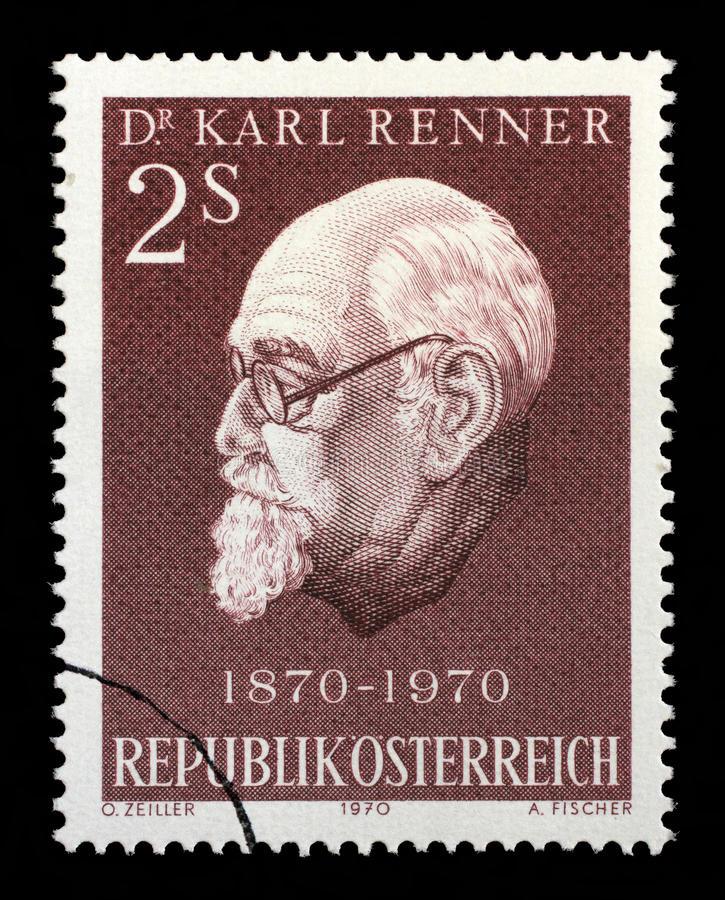
No, this is not directed against Poland. Norman Davies (2004) has shown me its heroism. Having said so, it is still true that, writing on the 1919 Paris Peace Conference ending the Great War, Margaret MacMillan (2001) vouches to Poland hav ing been the product of nationalism-cum-territorialism.
US President Woodrow Wilson’s ‘Fourteen Points’ were meant to guide the proceedings. Point 13 promised a Poland to be established on ‘…territories inhabited by indisputably Polish populations.’ But MacMillan’s wry comment on page 269 is that finding ‘… indisputable territory of any kind in Central Europe was never easy.’ Undaunted, Polish cartographer Eugene Romer provided what one would now call the evidence base reflecting the situation as of 1916. Morgane Labbé (2018) writes about the dire wartime circumstances under which this high-quality work has been performed. Indeed, the map shows a core area where Poles were dominant. When in Paris, Romer reworked the map to better suit the purposes of the Polish delegation. By then, Poland was already a – shifting – reality on the ground, shifting because the Great War in the east did not end before 1923, say Polish historians Wlodzimierz Borodziej and Maciej Górny (2018).
In the end, Poland was granted independence on the under standing that she would be the first-line of defence against the unknown quantity USSR, and well under the stipulation that she would respect the rights of millions of Germans, Lithuanians, Belarussians and Jews on its territory. So much for an ’indisput ably Polish population’. If the truth be told, soon Poland abro gated its obligations under the treaty.
Having disappeared briefly from the map, post-World War II Poland re-emerged as good as ethnically homogeneous, but not on territory ‘indisputably’ Polish. Instead, it comprised yet more German lands. But this time, the German inhabitants had to make room for Poles who had themselves been cleansed from territories acquired by the Soviet Union under the infamous Molotoff-Ribbentrop Pact. The Polish Jagellionian University of Lwów (Lemberg under Austrian rule ending, as it did, in 1918) went to Wroclaw: Breslau when still German.
In the Foreword to MacMillan’s book, Richard Holbrooke (later to become the broker of the Bosnian peace agreement) relates Wilson’s Secretary of State Robert Lansing having had misgivings with self-determination. It ‘…was the watchword, but

this was not a help in choosing among competing nationalisms.’ (MacMillan 2001, 25). See here the dilemma of constructing a state with a definite territory which an identifiable people can call its own.
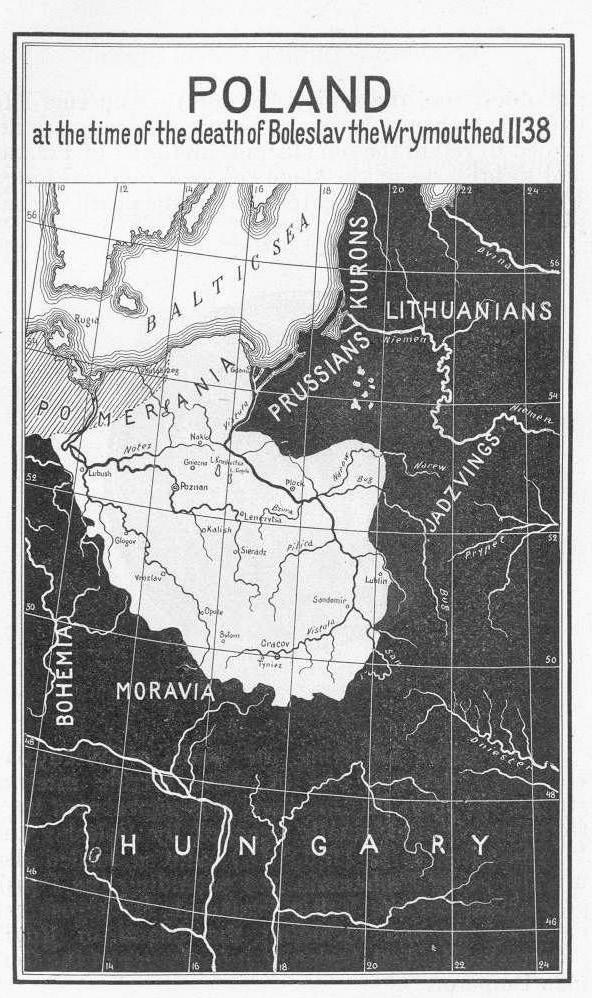
It’s not so much that I am a born Hungarian. My purpose is to fathom Hungary’s dealing with the 1920 Treaty of Trianon taking two-thirds of the ‘Lands of the Crown of Saint Stephen’ from it and leaving millions of compatriots in the diaspora. ’Nemnem-soha’ (no-no-never) will some Hungarians accept this!
Margaret MacMillan (2001) writes on the settling of accounts after the Great War. US President Wilson had called for self-determination. But rather than to its various nationali ties, Hungary wished to apply the principle to the country as a whole. On account of its semi-feudal structures coupled with its treatment of those that were not Magyar, unfortunately its rep utation was poor. Anyway, Trianon was an afterthought. Serbian, Czech and Romanian claims had to be dealt with first. Hungary flirting with Bolshevism did not help. Riding on a white horse, Admiral Horthy moved in, quelling the Communist rebellion with foreign support. He become regent without a king in the wait. Much territory was eventually regained due to an, ultimately fateful alliance with Hitler, with my father a victim. The country became, first a tragic and later an eccentric Soviet satellite until that empire, too, collapsed. Hungary – and young Viktor Orbàn – having given a helping hand, it was natural for her to be in the first wave of new EU members admitted.
The historic map of Hungary is widely on display, but Orbàn knows better than playing the irredentist card. His two-pronged policy is to re-unite Hungarians and not Hungarian territories, in this way grooming his country for a leading role in the Carpathian Basin. His slogan uttered in the run up to, and during commem orations of 100 years of the Treaty of Trianon is to end ‘One Hundred Years of Hungarian Solitude’.
Diaspora Hungarians can become Hungarian citizens with the right to vote. There are also personal benefits and there is support, cultural or otherwise for those living in neighbouring countries. Hungary is also the EU champion in cross-border cooperation, having set up – with government support – the largest number of European Groupings of Territorial Cooperation (EGTCs).
There is concern amongst neighbours, with Ukraine the lat est to allege interference, but Hungary also invests in relations
with them – including planning cooperation. (Dühr, Belof 2020) Is this nationalism without territorialism? And will a Hungary aim ing to become the regional hegemon run into opposition? There seems to be more to watch than the vilification of George Soros (I have seen the posters) and the closure of the Central European University (I have been to a conference held there before it left).
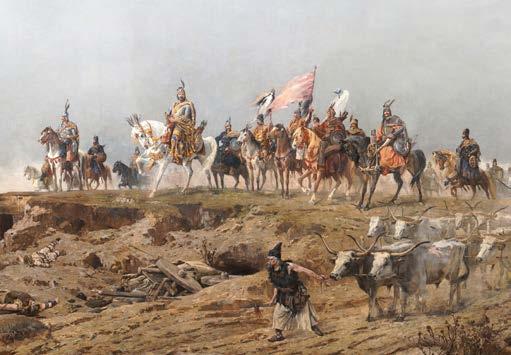
What does Viktor Orbán have in common with the German Constitutional Court? They both defend a 'Westphalian' sys tem under which sovereign states are seen as masters in their own house. Accordingly, the EU is no more than the sum of its parts. Attacking the European Parliament ever so critical of him, Orbán for instance wants it to be composed of national parlia mentarians11. So, no elections, no representation of the people of Europe. There ain’t such a thing, says Orban with an eye on the ongoing Conference on the Future of Europe12
There has been no reaction from the European Commission busy taking its largest member state, Germany, to the EU Court of Justice (ECJ) about the refusal of its highest court to recognise the supremacy of European law. The issue is in the (European) news. Much like before (see ‘The EU a Tangle’ on this blog) Jaap Hoeksma gives another of his learned commentaries13
The issue, he explains, is whether the EU is a ’compound state’ (Staatenverbund in German) or a novel construct which, although difficult to define (the term used is often ‘sui generis’) exercises powers of its own that the member states must respect.
Surely, Orbán‘s position verges towards the one taken by the German court that there is no European people in any real sense of the word. In this respect, note that Orbán's apologist Frank Furedi (2018, 128) talks about borders defining peoples each as ‘…the only foundation of the institutionalisation of dem ocratic accountability.’
In terms of the governance of space, much as Orbán does, without saying so, the German court preaches the ‘territorial ism’ which I belabour in these blogs. On the face of it, the ECJ might be doing the same. After all, does the primacy of European law imply that the EU is a (super-)state? And does this not imply territorialism, albeit at a larger scale, a ‘fortress Europe’? And don’t we wish for Europe being a ‘geopolitical player’, a ‘natural partner’ to the US and to be pulling its weight as a permanent member of the UN Security Council?
But perhaps we had better reflect on the EU construct as such. If neither a ‘compound state’ – the latter position once again shared by the German Court and Orbán – nor a ‘super state’, what then? In that previous blog, I suggested Hoeksma
10 FIRST PUBLISHED 23 JUNE 2021.
11HTTPS://WWW.EURACTIV.COM/SECTION/POLITICS/SHORT_NEWS/ORBANS-EUROPE
-VISION-DISMANTLE-EU-PARLIAMENT/ (LAST ACCESSED 21 DECEMBER 2021).
12 HTTPS://FUTUREU.EUROPA.EU/ (LAST ACCESSED 21 DECEMBER 2021).
13 HTTPS://EUOBSERVER.COM/OPINION/152160?UTM_SOURCE=EUOBS&UTM_ME
DIUM=EMAIL (LAST ACCESSED 21 DECEMBER 2021).
having given us the clue. Focussing on citizenship, he argues that EU citizenship is not grafted upon the citizenship of one of the member states. It is rather like – this being my own spin on the matter – membership in a club called EU, with rights and obli gations flowing from it. Which means that the EU exists in its own right. But I also point out there that we had better see same EU, not as one, but rather as a cluster of clubs. In Faludi (2018) I invoked the metaphor of the EU as a cloud of arrangements. In terms employed here, one would say: a cluster of clubs with different arrangements each, some of them even overlapping –think about Schengen – the EU's external borders.
Consider the arrangements, much hated in certain circles for the new border they create in the Irish Sea between Northern Ireland and the remainder of the UK. The Northern Irish are thus in a different club from citizens in the rest of the UK (but all of them, together with citizens of the Republic of Ireland are mem bers of yet another club, the Common Travel Area14). Also, under Irish law, much as descendants of Irish citizens worldwide, by virtue of being on the Isle of Ireland, the Northern Irish have the automatic right to an Irish passport15
Did I not say that ours is no longer the well-ordered Westphalian world, the latter being Orbán’s – and the German Constitutional Court’s for that matter – frame of reference?

14 HTTPS://EUOBSERVER.COM/OPINION/152160?UTM_SOURCE=EUOBS&UTM_ME
DIUM=EMAIL (LAST ACCESSED 21 DECEMBER 2021).
15 HTTP://BREXITLEGAL.IE/IRISH-CITIZENSHIP/ (LAST ACCESSED 21 DECEMBER 2021).
Printing made it possible for people who have never met to develop bonds, says Benedict Anderson (1983). For this to become possible, vernaculars needed to be clustered into stand ardised languages. Identities having thus been constructed sup ports my claim of the nation-state being a modernist construct.
In an idle moment, I considered revisiting Anderson but hit upon Jason Xidias (2017) discussing his work. First I suspected his aim had been to give undergraduates easy access to Anderson’s works but found him – you can’t read it all – useful. Anyway, an internet search revealed the series in which Xidias had come out to be from Taylor and Francis. They would not lend their name to something less than serious.
Xidias taught me about a branch of the social sciences called nationalism studies with distinct schools: the ‘modern ists’ with Anderson the most influential representative and ‘eth no-symbolists’ believing that nations and nationalism are rooted in pre-modern conditions, with Anthony Smith (2000) its most prominent proponent. Xidias (2017, 73-74) concludes: ‘One particularly promising area for future exploration is the rise of imagined communities through social media. The mobilization of different causes through platforms such as Facebook and Twitter will likely attract more and more scholarly interest in the coming years.’
What I have not found mentioned is multilingualism creat ing new, overlapping ‘imagined communities‘. Like so many oth ers in research, business and administration, the group at Delft University of Technology I am attached to is international, speak ing many languages but sharing a command of English. No big deal! They are of course nothing like Anderson’s imagined com munities. However, each one also has multiple – and multi-lin gual – networks, creating, I am sure, overlapping loyalties. They are part of communities formed, not only through the printing press, but through the ether. Not an original thought, but what does their prevalence mean for nationalism?
Reading Estelle Evrard (2021) about legal geography and spatial justice in borderlands evoked memories of Edward Soja speaking about the relation of society and space – also described as spatiality, or the relationship between people and things, including other people – at Radbout University Nijmegen maybe twenty years ago. Evrard is from the University of Luxembourg, the latter being the place to learn about cross-border coopera tion. She publishes in German and English, but I encountered her discussing the European Cross-Border Mechanism (ECBM) in French (Evrard 2020) and before that also with a colleague in English. (Engl, Evrard 2019)
It is no accident that the ECBM draws attention in Luxembourg. The topic had come up during its 2015 Presidency and is virulent along the whole length of the French-German bor der, with the so-called Aachen Treaty of 2019 including a chap ter on regional and transnational cooperation allowing regula tions of one country to be applied in the other. In so doing, the Aachen Treaty foreshadows the ECBM.
Casting light on the ECBM, Evrard’s French paper invokes legal geography. Their facing special challenges justifies spe cial attention for cross-border territories. So, the ECBM is to give such territories the means to improve the management of their development. Before, INTERREG has done so by means of financial, and the European Groupings of Territorial Cooperation (EGTC) of administrative arrangements. Beyond this, the ECBM is to engage national and subnational administrations in the ser vice of cross-border areas. The intention is to make their geo graphic imperatives the bases for adapting their administrations:
’The ECBM is thought to enable the de-facto appropriation of cross-border spaces. ECBM and EGTC do not institutional ise a new, exclusive territory under the law. Nor are they simply functional but have been created for the purpose of implement ing cross-border strategies. What is at stake is the introduction of transnational territoriality, one founded as much on suprana tional territoriality (for instance the objective of territorial cohe sion) as on the modernist territoriality of the member states and their territorial subdivisions.
The above is important, and well for two reasons. Firstly, it represents a means of allowing cross-border regions to implement
 JACOB JORDAENSL, NOW AT THE NASJONALMUSEET IN OSLO, PUBLIC DOMAIN, SOURCE: HTTPS:// COMMONS.WIKIMEDIA.ORG/W/INDEX.PHP?CU
JACOB JORDAENSL, NOW AT THE NASJONALMUSEET IN OSLO, PUBLIC DOMAIN, SOURCE: HTTPS:// COMMONS.WIKIMEDIA.ORG/W/INDEX.PHP?CU
their projects and to give in a material sense of the word mean ing to cross-border areas. Secondly, conceived as rendering territorial cohesion in border areas more concrete, smooth and continuous, the proposed regulation implies national legislation extending its spatial reach (extra-territoriality). One sees here the realisation of European territoriality in border areas contributing to increasing the porosity of the state territory.
This draft regulation requires all levels of administration to take a fresh look at border regions, to appreciate them in an eminently geographic sense so as to consider their dynamics and to think of them as linchpins in European integration. It is in this sense that European law proposes to move the borders.’ (Evrard 2020, 62; translation AF)
Evrard (2021) goes more into discussing legal geography in terms of two types of spatiality: that of the EU and that of borderlands which, so as to be able to function properly, require amongst others to adjust the law to space, of ‘folding’ it with space. More specifically, ‘…this mechanism would allow us to define a body of law applicable to a specific cross-border activ ity. Secondly, this instrument would allow the use of a single law in a cross-border area … (Which is why - AF) this element is crucial in the EU’s aspirational smooth space. It is in this sense also that this regulation can be analysed as closer to the Ethics of the EU.’ (p. 10)
Which is why in the present climate of more and more ‘pushbacks’ of claims arising from that same ethics I am not optimis tic about the ECBM gaining approval from EU Members ever more protective of their unadulterated territoriality as they are.
Knowing my predilections, Raya – my partner – pointed me to a Dutch article about the civilisational state, with China the paradigmatic example.
I am not really knowledgeable about China, but once there were plans for a session on what was then called OBOR: One Belt One Road. I was convinced that the EU would not be up to the challenge. At the time, the plan did not get much trac tion but, be it evidence or not of China‘s hegemonic ambitions, since then I read whatever is coming my way on this initiative.
When hearing about China as a civilisational state, I once again pricked my ears. One Haroon Sheikh of the Dutch ‘Scientific Council for Government Policy’ (known by its Dutch acronym as the WRR) is looking into the matter. An evening and early morn ing spent on the internet taught me also about a book with the civilisational state in its title by Zhang Weiwei (2012).
Before looking into the matter, I checked up on Sheikh’s Ph.D. defining a civilisational state as a country representing, not just a historic territory, people or government but a civilisation larger than a single nation. As such, it stands for historical con tinuity and cultural unity across a large geographic region, with China, but also Russia, India and Turkey as examples. Which was enough of an incentive to go back to Zhang Weiwei.
I started with China Daily Online19 reporting on his speak ing about the matter as early as 2007 at a forum in Germany. Western scholars attending had wanted to grill him on democ racy in China. With him being more widely travelled and knowl edgeable about the nexus between democracy and develop ment, for those who criticised him on the matter it had been a rout. From there I proceeded to a comprehensive summary of his 2012 book given in another lecture in Berlin. (Zhang 2017)
The reason why the civilisational state caught my eye should be obvious: In ‘The Poverty of Territorialism’ (Faludi 2018) I had voice reservations about what I call the ‘production of dem ocratic legitimacy‘ by way of elections territory-by-territory. According to Rosanvallon (2020) a contemporary political the orist, Alexis de Tocqueville had described the first elections held
18 FIRST PUBLISHED 22 JUNE 2021.
19 ZHANG WEIWEI: ‘WHAT IS CHINA’S DEVELOPMENT MODEL?’ CHINA DAILY ONLINE (2019). AVAILABLE AT: HTTP://EN.PEOPLE.CN/N3/2019/0321/C90000-9559135.HTML (LAST ACCESSED 23 AUGUSTUS 2020).
under universal (male) suffrage a ‘question of arithmetic’. In said lecture Zhang (2017) quotes no less than Abraham Lincoln and his famous definition of democracy as government of the peo ple, by the people, for the people. The Chinese, he says, put ‘for the people’ first, and with good results. Judge for yourself. But Zhang denies any pretence of imposing the Chinese model. Which made me think of China seeing the protests in Hong Kong as attempting to do precisely that: force a model dif ferent form their own down their throats. For long, the espoused idea has indeed been that engaging with China will make ‘them’ appreciate Western-style democracy and human rights. But to defend its superiority, you would have to do better than simply assuming that you have the moral high ground.
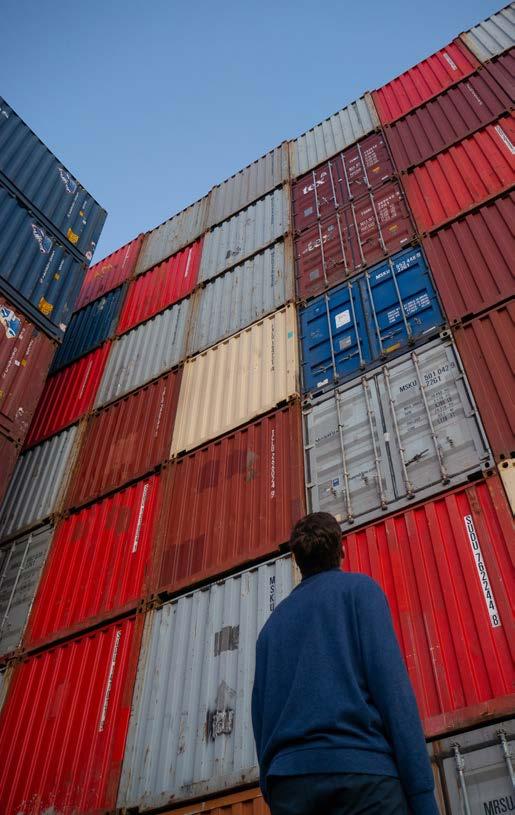
In the ‘Civilisational State’ I referred to my brush with what then went under OBOR (One Belt One Road). At least it made me read in a brand-new volume on ’The Multidimensionality of Regions in World Politics‘ the paper by the editors on ‘China’s global connectivity politics’. (Godehardt, Kohlenberg 2020) The paper offers an overview of Chinese foreign policy under President Xi emphasising what is now called ’Belt-and Road Initiative’ (BRI). What is presumably – I am far from expert on the matter – unique in this paper is the discourse analysis of official translations of Chinese texts. A brief note on the seven pages of results must suffice here. The text presents central corridors, networks, ties and linkages as making up the ‘…discursive con stitution of China’s connectivity politics‘. (202) Key concepts are ‘docking’, being directed against US-centred globalisation and the ‘power to structure’ global networks as a countervailing force. All this is said to reflect ‘Beijing’s growing lack of interest in changing its economic, social or political system in order to link up with the international liberal system… [which is witness to –AF] an awareness of China’s growing ability to bind other actors to itself.’ (203) The means are direct, state-to-state agreements and active participation in regional and international organisa tions and also new Chinese global agencies. So, any transnational economic corridors that planners might be concerned about are part of a wider story.
Very much in the news at present, 5G is another element in this equation. It relates to digital payment systems, global energy interconnection, and satellites and also geographic spaces of all kinds: economic corridors, new transit hubs and transnational supply chains. All this ‘…undergirds a proactive approach of changing globally dominant (liberal) norms, rules and values by means of juxtaposition (with new Chinese initiatives and ideas) in order to create a global system more compatible with China’s authoritarian one-party system.’ (P. 205)
Two lessons: (1) the present ambition of a more ‘global Europe’ requires appreciating what drives other players in the field; (2) initiatives, mainly, but not exclusively – Duisburg is another hub, in this case for rail transport to China – in Eastern and Southern Europe are part of a general strategy. No reason to shun the Chinese, but be aware.
PHP?CURID=41838291
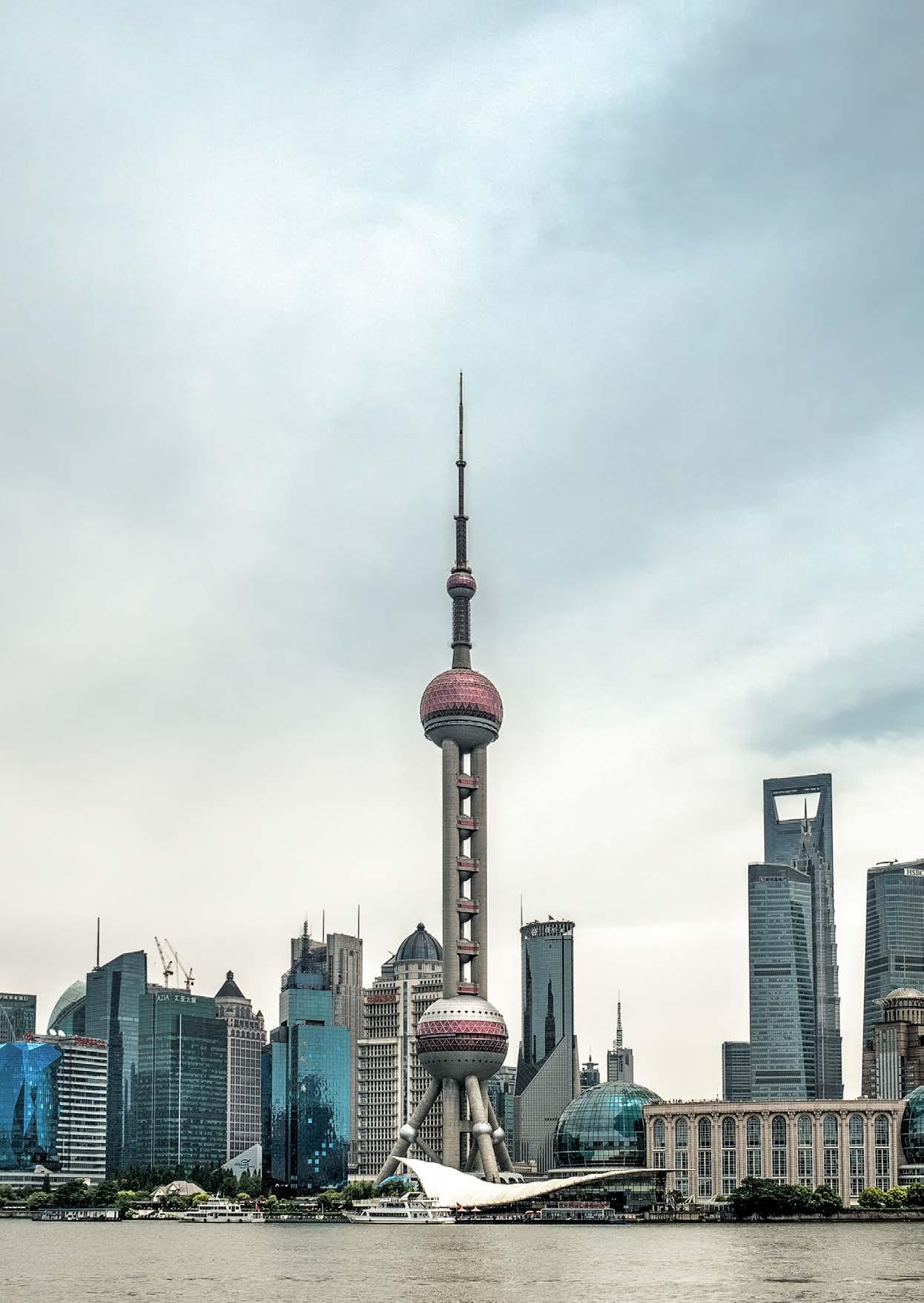 VIEW TOWARDS THE SHANGHAI SKYLINE AND WATERFRONT IN PUDONG WITH THE NEW SHANGHAI TOWER. PHOTO BY ERMELL, PUBLIC DOMAIN. SOURCE: HTTPS://COMMONS.WIKIMEDIA.ORG/W/INDEX.
VIEW TOWARDS THE SHANGHAI SKYLINE AND WATERFRONT IN PUDONG WITH THE NEW SHANGHAI TOWER. PHOTO BY ERMELL, PUBLIC DOMAIN. SOURCE: HTTPS://COMMONS.WIKIMEDIA.ORG/W/INDEX.
CHINA'S BELT AND ROAD INITIATIVE - AN OVERVIEW OF THE MOST IMPORTANT PROJECTS IN ASIA, AFRICA AND EUROPE, AS OF 2018. MAP BY APPENZELLER/HECHER/ SACK - INFRASTRUKTURATLAS 2020, CC BY 4.0. SOURCE: HTTPS://COMMONS.WIKIMEDIA.ORG/W/INDEX.PHP?CU RID=102700434
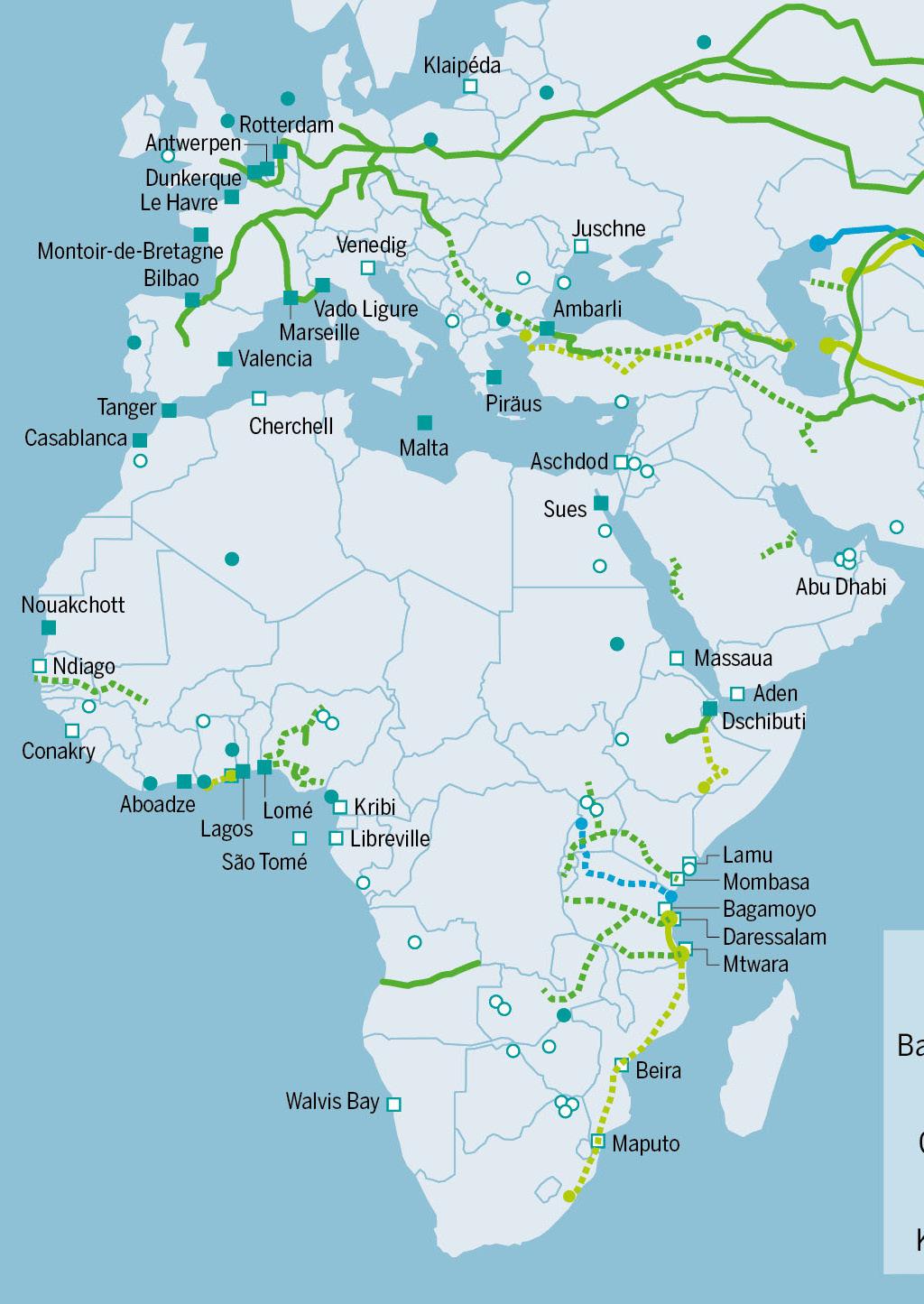
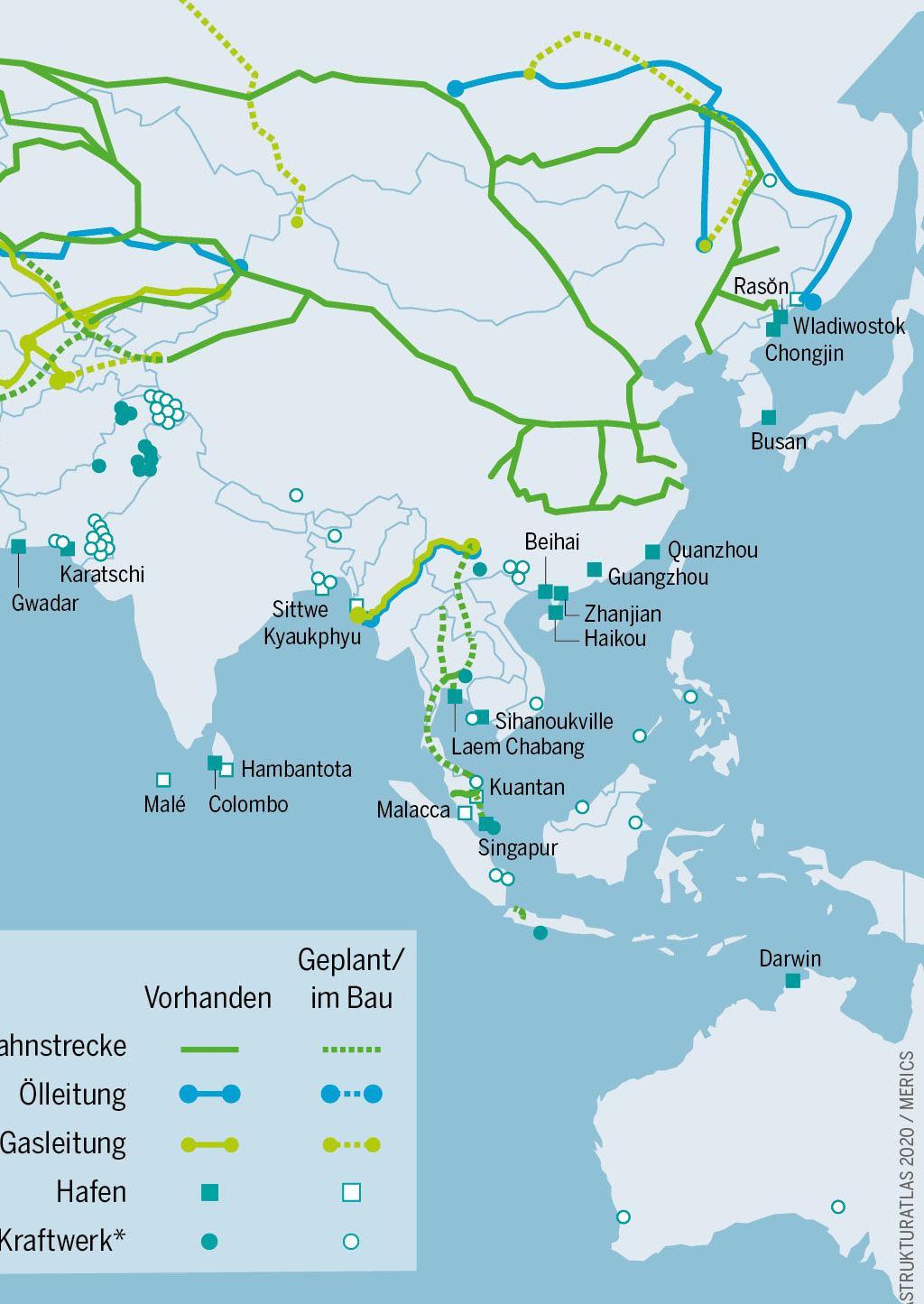
Since publication of ‘The Poverty of Territorialism’ I continue to explore neomedievalism as its alternatives, drawing inspiration, amongst others from maritime spatial planning. Which started after an invitation to a conference at Sopot in Poland about this topic. Significantly, sovereignty is not as prom inent an issue in sea space as on land. ‘New Horizons’ is the blog I wrote. Subsequently I contributed a special issue. Because they ably summarise the spirit in which I look at planning sea space as paradigmatic for (neo-medieval) planning on land, I include what the editors of that special issue had to say about my contribution: ‘Faludi (2019) offers a further, much-needed link between marine and terrestrial space, in a crème de la crème article with very deeply argued thoughts as to how the development of mari time space should inspire its terrestrial counterpart. The approach is an entirely fresh and new one, but Faludi is right. Maritime space teaches us how various limitations may be overcome, and Faludi argues for a functional approach that pays attention to the genuine interactions constituting the space in which we live. His paper raises concerns of importance for spatial planning both maritime and terrestrial. Boundaries have had to be redefined, with the effect being fuller differentiation; while attention now needs to be paid to functional, political and institutional space. The author amasses several arguments against territorialism within precisely-demarcated areas under the control of public authorities, holding that this generates the ‘false consciousness’ which holds that ‘taking back control’ of one’s territory is the solution to today’s problems. On the contrary, Faludi asserts, it is flexible, issue-based and spatially overlapping governance arrangements that may be in a better position to address the complexity characterising modern European space both at sea and land.’ (Zaucha Pardus 2019)
In the next blog included here on ‘My Imperial Roots’ I turn my gaze away from the sea to the Austrian-Hungarian Monarchy as an empire. It is fascinating as empires are for its maintaining medieval features, in any case for its mix of nationalities. Brexit provides another occasion for thinking in ‘neo-me dieval’ terms The blog on it has been written at a time when it was definite in coming but had not yet taken hold. Presently, of course, the Brits – but not only they – are beginning to see the effects, which is maybe why Prime Minister Johnson is seen in a TV spot on BBC World Service imploring viewers: ‘We have to preserve the integrity of the United Kingdom’. Surely, he was
having controlling its borders in mind. The blog points out that the arrangements will be complex, with the famous – or infa mous – border in the Irish Sea one of the issues.
The next two blogs discuss the intriguing work of a young French author, David Djaïz imagining, much as I do, states as islands in an archipelago. He sees each one as operating flood gates against the effects of globalisation, the object of some modest criticism in the next blog about, ‘Slow Démocratie’, being the title of a book of his.
‘Referenda and Citizen Panels Caught Up in Territorialism’ questions the wisdom, not of referenda as such, but of hold ing them per territory. This only invites more feelings in terms of ‘them-and-us’ instead of paying attention to interdepend ences. Recall similar modestly critical comments in ‘The Good Government’ in the section on borders.
‘The EU a Tangle’ applies the same logic to the legal issue (already discussed under Sovereignism) of whether there is European citizenship. Hoeksma compares it to membership in a club. Taking this further, I point out that there is not one, but that there are more EU clubs. Moreover, membership in them is not always restricted to EU members. So, the EU is far from homogeneous which underscores its neomedievalism.
Inspired by a novel ‘A Bullet Misses Its Target in Sarajevo…’ I return to the Austrian-Hungarian Empire. Himself an Austrian, the author envisages its continuing existence as home to many nationalities, but – reckoning this scenario to be too good to be true – he lets a comet explode the globe, and with it the vision of a peaceful future.
‘Wie hältst du es mit der Europäischen Union?‘ is about a European party standing in the Dutch national elections. The EU it has in mind looks decidedly ‘federalist’. Should they have my vote? In ‘The Morning After’ I then invoking a French author saying that member states should share their territories. Food for thought for a European party?
’Grist to the Mill’ expands on the ‘variable geometry’ of the real EU, as against the EU as conceived by its enemies and its dwindling number of enthusiasts alike. ‘The tangle we got ourselves into’ points to Kahn and Richard (the latter one of the reviewers of my ‘The Poverty of Territorialism’, see the Appendix discussing its echo in the literature) being kindred spirits. They present the EU as ‘moulded by a reticularity’ which to my mind amounts to neo-medievalism. They also point to why such ideas meet with little enthusiasm: To associate with a tangle is not easy. An imaginary community fires the imagination more. (For imagined communities see also the section on ‘Sovereignism’ discussing Perry Anderson.)
Finally, ‘Global Order in Turbulent Times’ discusses a work by the historian Niall Ferguson (2021). Although about Corona, it
could also have gone into the section discussing border closures, but I decided to include it here where the critique of territorial ism and its alternative – neomedievalism are – central issues.

Readers may recall my reporting on the first, thankfully posi tive review of the ‘The Poverty of Territorialism’ by Jacek Zaucha. (See under ‘Appendix’). Shortly thereafter I attended a conference on Maritime Spatial Planning co-chaired by him. There were two cakes in the shape of my book, as well as the one he had just co-edited. (Zaucha, Gee 2019) Soon, I got involved in preparing a special issue on ‘Marine and Coastal Space’ of EUROPE XXI, the same journal published by the Polish Academy of Science in which Jacek’s review has appeared. My paper now out starts with an epithet by Jacek’s co-editor, Kyra Gee, writing on p.25 of the volume above: The ocean is the ‘other’, something that is not terra firma and something that is always, to some degree, unknowable. I took inspiration from this and in particular the Law of the Sea dividing ocean space into zones of graduated control, including – fascinating for somebody critical of territorialism –Areas Beyond National Jurisdiction where by definition territo rialism does not apply. In my subsequent paper in EUROPE XXI
I revisit territories as the building blocks of the political order based on the delusion of territorial sovereignty. From there, I also discuss neo-medievalism as an alternative ordering principle for the governance of space. Accordingly, although perhaps sover eign in theory, stand-along territories should be understood as being enmeshed in a web of functional relations. Many of those relations have their own governance arrangements, with over laps galore between them. Which makes imposing an overall order a doubtful enterprise.
1 FIRST PUBLISHED 21 FEBRUARY 2020.
MARE LIBERUM (1609) BY HUGO GROTIUS IS ONE OF THE EARLIEST WORKS ON LAW OF THE SEA. PUBLIC DOMAIN. SOURCE: HTTPS://EN.WIKIPEDIA.ORG/WIKI/MARE_LI BERUM#/MEDIA/FILE:HUGOGROTIUS-MARELIBERUM-1609.JPG
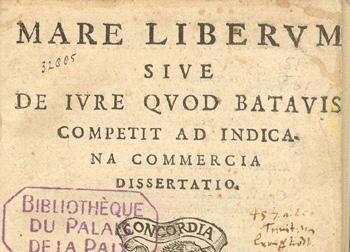
With my father born in Hungary and my mother in Austria, both before 1918, I am second-generation Austro-Hungarian. Born in Budàpest, I spoke German and Hungarian but have unlearned, first my German and then my Hungarian, the latter after my mother, by then widowed, had taken me to Austria in 1946. Tainted by the seven years when, not quite against its will and not quite voluntarily either, Austria had been part of Nazi Germany, Vienna breathed the monarchy and its peoples: A playmate had a Czech name, a school friend was from Ukraine, one youthful love had Polish roots, another had returned from Israel, yet another was from Romania and my lifelong partner is from Austrian and German parents who had left for Palestine in time before World War Two. My grandparents on mother’s side – I never knew those on my father’s side who perished in the Holocaust – were Prague Germans. Which is why my grand father, a former imperial-royal civil servant still spoke enough Czech to hitch a ride with a Russian convoy to join us in Budàpest in 1945. My stepfather, an Austrian theatre critic whose name gave away his lineage to the East of the monarchy helped with my acculturation.
During national service I shared a room with, amongst oth ers a count – the family had given its name to one of the palaces in Vienna – a baron and a labourer whose name betrayed his being from a former Hungarian province of Austria. (The baron once confided in me that, in the monarchy the count would hardly have spoken to him!)
After gaining my Ph.D., we newly-weds left, eventually to settle in the Netherlands. From this vantage point, I maintain and, since focusing on European spatial planning and the EU, have reinvigorated my interest in Central and Eastern Europe. Which is why I read with great interest a book by a talented and committed Dutch journalist, Caroline de Gruyter (2021; see also my blog ‘The Western Balkans in the News’). As a correspond ent, she had picked up the scent of the Habsburg Empire, com paring it with an EU on which she had previously reported from Brussels. I agree with her looking – not as the only one, see for instance the medievalist Wilson (2017) – at the EU as an empire, which is one of the messages also of my book. (Faludi 2018)
Coincidentally, I came also across a ‘Habilitationsschrift’, in many parts of Europe a precondition of attaining a professor ship. It is by Tamara Scheer (2020) and concerns the language regimes of the Habsburg army. It reminded me of the current
2 FIRST PUBLISHED 26 JULY 2021.
internationalism of expats. Of particular interest are the offspring of Habsburg NGOs and officers. Moving around the vast empire with its almost a dozen official and even more spoken languages, they and their offspring often lost any sense of a mono-lingual – hence national – identity.
The Austrian-Hungarian army may have lost the war and the Double Monarchy has disappeared, perhaps in small part due to the ‘inefficiency’ of a language regime that (like the EU) gave each citizen the right to be trained and commanded in his own language. But its demise was also and in particular due to a nationalism that undermined the empire from within, with the Hungarians – better to say the Magyars, being the Hungarian speakers and increasingly vociferous nationalists in the Kingdom of Hungary – playing their part. Anyway, a European army, if there were one, could learn from the Habsburg language regime. Using both German and French as working languages, the FrancoGerman Brigade has seen service in the SFOR operation in Bosnia and Herzegovina. A command structure hailing from Münster, the headquarters of the German/Netherlands Corps under NATO uses English. On that level, the Hapsburg army only used German.

3
So, the UK is heading for the exit. Had fate not smiled on us, we might very well be UK citizens now. Instead, we came to the Netherlands just about when the UK joined what was then the European Economic Community. Upon discovering that, as the Austrian I was at the time, I needed a work permit while two Englishmen coming with me did not, Europe started to have meaning.
As the – now Dutch – student of European spatial planning I am, I regret Brexit for the very reasons that its supporters wel come it: the UK taking back control. (Nigel Farage had declared the day of the referendum the ‘UK Independence Day’!) Rather than returning to the – ostensibly natural – order of a world of sovereign states, Brexit may very well make international gov ernance even more of a puzzle. Even under a ‘no deal Brexit’, there will be arrangements with the EU, itself a conglomerate of overlapping spheres of authority like in the Middle-Ages and –my footnote to the neomedievalism of the likes of Jan Zielonka (2014) – early modernity.
Yes, the arrangements, still to be negotiated before the end of 2020 can only add to the existing complexity. This is true also for the arrangements already in the withdrawal agreement (at the time of writing still to be ratified by the UK Parliament). Much has been written about the border in the Irish Sea – between Northern Ireland and the UK that is – and how it will compli cate their relationship. And there is of course speculation about Scotland seeking independence, one supposes to re-join the Union. What will the Scottish currency be until, one presumes, it will enter the Eurozone? At the last occasion, at least in the interim, Scotland was hoping to keep the Pound, leaving the newly independent country to the tender mercies of the Bank of England. If not, with or without the consent of the EU, Scotland might elect to use the Euro anyhow. Montenegro is after all using it, too. So is Kosovo – and the Vatican – but then with, rather than without prior agreement.
As from 31st January, 2020, UK citizens will no longer be European citizens. (Passports with no mention of the accursed Union are already on issue, and they will return to being blue rather than red.) Still, UK residents of Northern Island also have the right to an Irish (European) passport. With only one grandpar ent of Irish descent, so do UK citizens, irrespective of their place of residence. British expats in Europe pursue other strategies to
become Europeans. So, what will be the outcome? More diffuse loyalties and overlapping arrangements like – indeed – in the Middle Ages! As Michael Keating (2009, 38) has been saying: 'European integration is creating new territorial boundaries for some purposes and not others so that, while states may be los ing their old monopolies, this does not necessarily herald the emergence of an integrated European space to replace them. Europe is not so much suppressing state borders as changing their meaning and impact.' Welcome to the new Europe! Mind you, a close look will teach us that it has been with us already. Gibraltar
RESULTS BY COUNCIL DISTRICT/UNITARY AUTHORITY (GB) & UK PARLIAMENT CONSTI TUENCY (NI). BLUE: LEAVE YELLOW: REMAIN. BY MIRRORME22NILFANIO. CC BY-SA 3.0. SOURCE: HTTPS://COMMONS.WIKIMEDIA.ORG/W/INDEX.PHP?CURID=49679585
‘Under confinement we rediscover the strength of “proxi mate” solidarity in the family and amongst friend; we also redis cover the power of forms of national solidarity. The states, even those at the heart of the Schengen Area brutally close their bor ders in often precipitate and disorderly manner. We must not see this solely as nationalism of the worst kind, but more as a manifestation in times of severe crises of a collective will to sur vive clinging to the most tangible organised reality – the nation.’ (Djaïz 2020, 10; translation from the French original AF)
A friend has drawn my attention to this publication where Djaïz updates his ‘Slow Démocratie’ (Djaïz 2019) and where he discusses the Corona crisis alongside with 9/11 and the subprime crisis, all creating chain reactions with incalculable con sequences showing the need to carefully manage globalisation.
Like I myself, Djaïz figures states are islands in an archipel ago, with each responsible for managing supply chains alongside social provisions in their respective hinterlands. But his hope is that the current drive for national solidarity will not be at the expense of awareness of our being part of a wider world.
At the same time the state is – and continues to be – the insurer of last resort. Echoing a topical theme, Djaïz adds that it ‘…must “assume responsibility” for the temporary decline in activities due to public health measures and protect employ ees much as enterprises from their disastrous long-term con sequences.’ (p. 14) The crises of this century so far have raised concerns about collective security, personal safety, with public health now being thrown into the bargain. What is required is a new architecture, the like of which we have not yet seen before, with state administrations operating the flood gates to regulate the flow of events. Since human, economic and financial flows have sanitary, social and/or economic consequences, in so doing national governments (or a European executive for that matter) can impose controls.
So the point is not to withdraw behind the ramparts but to engage with globalisation by creating safety valves prevent ing the precipitous spread of disturbances. In this, international institutions and international law should not replace the state, but rather complement it in its role of safeguarding global public goods like the environment, air quality, health, financial stability. Indeed, Djaïz talks about an ‘interactive universalism’. He lauds peaceful competition between nation states but utters stark 4 FIRST PUBLISHED 31 MARCH 2020.
warnings against excessive nationalism as always harbouring the danger of ending in a gulf of fire and steel. ‘Neither hyper-glo balisation nor hyper-nationalism is exactly a good thing.‘ (p. 19)
So, he is not against globalisation as such. The point is to democratically decide on what has to be done locally and what globally. One may of course object that this would create ter ritories of different speeds. But those are already upon us. So, what is needed ‘…is a new story-line re-establishing solidarity between highly mobile and locally rooted sectors and where territorial fractures make room for cooperation and comple mentarity.’ (p. 23) The unsavoury alternatives are ultra-localism and ultra-nationalism. The long and the short of it is therefore to re-invigorate public authorities to enable them to reduce the negative consequences of neo-liberalism:
‘Thirty years ago it would have been possible to conceive of globalisation taking an altogether different path based on interdependence and solidarity, but this would have required a starkly different manner of tooling up public power. In its place, we have had interdependence without solidarity. Now we appre ciate that this has made us vulnerable. (p. 25)
Strong states taking account of interdependencies, as Djaïz suggests, is different from the territorialism that I have made the but of my criticisms. But we must also consider the mode of production of democratic legitimacy: elections by territories. This, the productive force of territorialism needs to be looked into. Suggesting trading votes, Blatter and Bauböck (2019) pro vide one conceivably way for dealing with interdependencies.

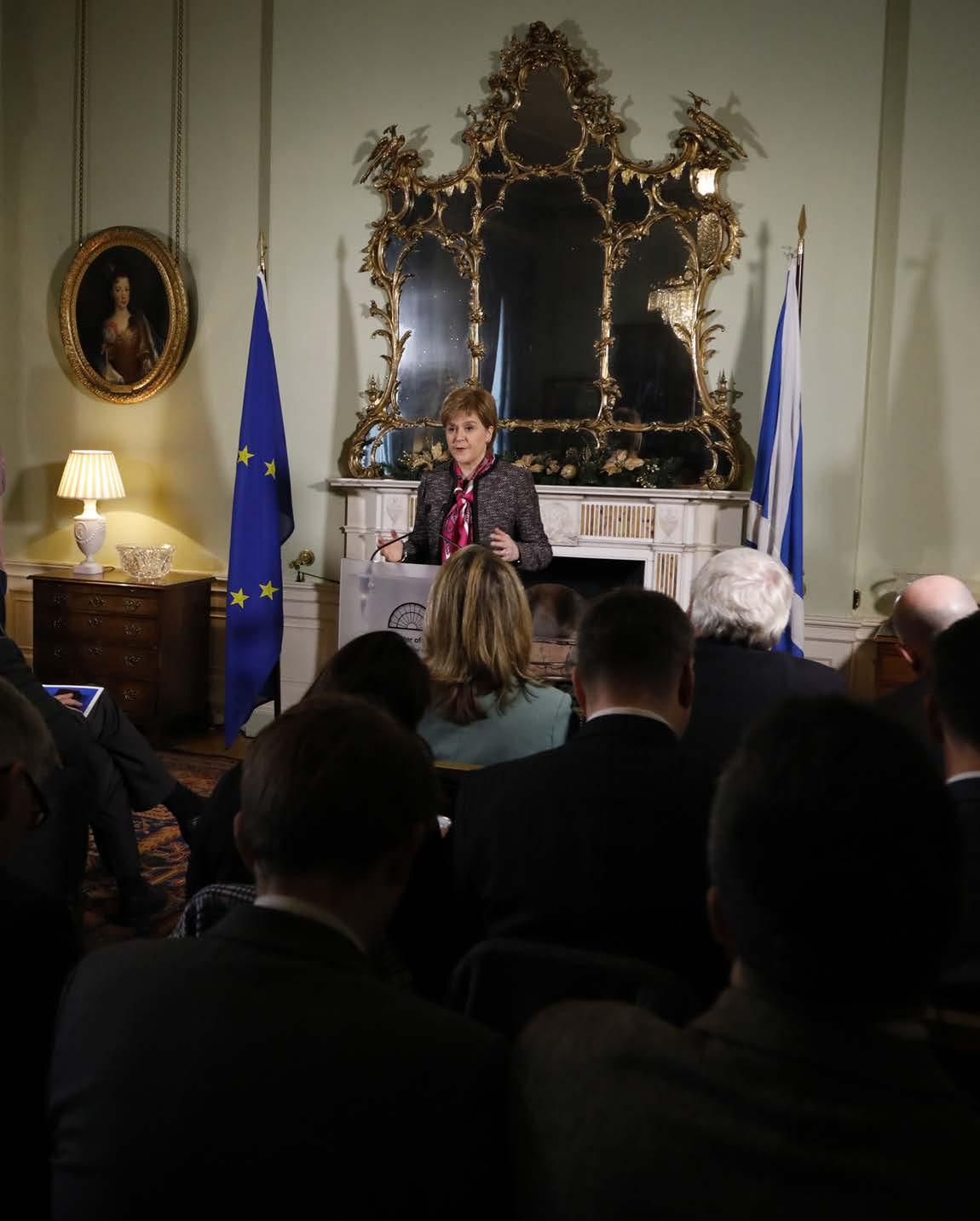
On David Djaïz’s note on the Corona pandemic see ‘Territorialism Type II’ above. Meanwhile, I have read the book (Djaïz 2019) of which the paper discussed there is an update. It, too, underscores the role of the nation-state in modulating globalisation. Neither English nor Dutch are languages of my upbringing, but my wanderings have taught me both. French remained a distant memory until reading a paper from Quebec which seemed American English in the French idiom encouraged me to revisit that language.
‘Slow Démocratie’ is Metropolitan French, but accessible even so. A graduate of the École normale supérieure and now 30 plus, he has already been Inspecteur des finances and is pres ently at the Agence nationale de la cohésion des territoires, on the authority of the same friend who has drawn my attention to Djaïz somewhat like what the French planning agency Datar used to be.
Underscoring the role of nation-states in modulating glo balisation, Djaïz has the French state in mind. I have no difficulty accepting nation-states as gate-keepers as long as it is under stood that, in being that, they share their sovereignty with other institutions.
It is here that I beg to differ with Djaïz. He would rather build a progressive agenda around national democracy, surmis ing it to be possible for nations to take back control of rampant globalisation. At the same time, he strongly rejects the nation being a totem of the extreme right, coining the metaphor instead of states as the ‘insurers of last resort’ operating what he calls flood gates (écluses) at their perimeters.
His defence of the nation-state is based on a shrewd analy sis of the consequences of globalisation in the age of the digital revolution creating a class of highly paid nomads and another one of less-well qualified locals working in, often precarious service jobs. Here, the welfare states is crucial. Not only that, but western nations have also developed a sense of solidarity between their territories. By which he not only means assistance earmarked for, as EU jargon has it, less-favoured regions. Even more significant are equitable services, unemployment benefits and pensions made available – unlike in the EU – throughout the national territory, in so doing accruing disproportionate bene fits to poorer regions. In addition to which, and here comes the idealistic streak in his work, Djaïz argues for a more symbiotic relationship between nomads and locals with emphasis being put on the circular economy. Thus, a grand compromise, no less,
5 FIRST PUBLISHED 12 APRIL 2020.
between capitalism, democracy and ‘système-Terre’ – Earth sys tem science – is what ‘Slow Démocratie’ in the title of the book signifies. Which is like ‘Europe 2000’ by nobody less than Peter Hall (ed. 1977; see Faludi, 2014).

Eulogizing the nation-state, Djaïz clearly has la République with its pedigree reaching back to the French Revolution in mind. Alongside the American Revolution, the French one has been a beacon for the rest of the world. But few are the nationstates that live up to the French example, let alone share its passion for égalité républicaine which Djaïz assumes as a given. One is tempted to draw a comparison with Julien Benda pub lishing ‘An Address to the European Nation’ in 1933. It is ‘...not cleansed of nationalism’, Müller (2006) says, in that Benda held that his rational Europe would naturally choose French as the most rational language!
Since we are not all French, there must be more ways than Djaïz – by no means a nationalist himself – propagates.
A 2016 Dutch referendum advised rejecting the EU-Ukraine Association Treaty. A tad more than 20% of eligible voters against (62% of the 32.28% which was just above the 30% threshold for the outcome to require the government to consider the matter) meant the government had problems giving its approval. But if that approval were not forthcoming, this would derail a treaty affecting all EU members and, of course, Ukraine, possibly with wider ramifications. Which is proof, if one were needed, of the ‘poverty‘ of territorialism privileging a containerised form of democracy.
Contrast this with France now holding a convention of 150 citizens chosen randomly to deliberate on climate change. (Gougou, Persico 2020) Sampling as an alternative to parliamen tary elections has been promoted by Van Reybrouck (2016). But rather than stepping into the shoes of law-makers, the panel –part of President Macron’s way of coping with the ‘Yellow Vests’ – is invited to consider putting its recommendations to a ref erendum and, if so, indicating what the modalities and issues should be.
My concern is neither with the panel nor its recommen dations let alone those modalities. Rather, it is the framing of the exercise by persistent territorialism: Outcomes should thus feed into French climate change policy. However, as the authors themselves observe: ‘…France belonging to the European Union producing a good part of environmental law is not without con sequences. In all probability, certain measures proposed will not concern national law … The competences of territorial authori ties (French for governmental bodies other than the state - AF) will raise similar questions…
In reality, the legitimacy deriving from such a democratic process will be an important resource to draw on in the supraand infra-national negotiations concerning issues of climate change.’ (Translation AF)
No way of denying the benefits of such experiments, but the proposal does not change one iota of the underlying ter ritorialism. This while the environment knows no borders. Or perhaps one had better say: The areas within which to tackle 6 FIRST PUBLISHED 8 JUNE 2020.
intrusions, visual or otherwise, radiation, pollution of rivers let alone the sea, the depletion of the ozone layer and of course cli mate change form a quilt of overlapping spaces. Whether elected by popular vote or nominated by sampling citizens, democratic decision-making as we know it never fits the bill!
Not having a comprehensive solution, I point to whatever small remedies I have learned about: less emphasis being put on the production of democratic legitimacy through elections and more on the right of citizens to be heard (Schönlau, Piattoni 2015); Blatter (2019) proposing states share voting rights and Eichenberger and Frey (2006) on the Swiss practicing demo cratic governance in both territorial and overlapping functional settings and on the implications of same for the EU.
LOGO OF THE CITIZENS' CONVENTION FOR THE CLIMATE, FRANCE. KIT MEDIA. ALL RIGHTS RESERVED. PRINTED WITH PERMISSION. SOURCE: HTTPS://WWW.CONVENTIONCITOYEN NEPOURLECLIMAT.FR

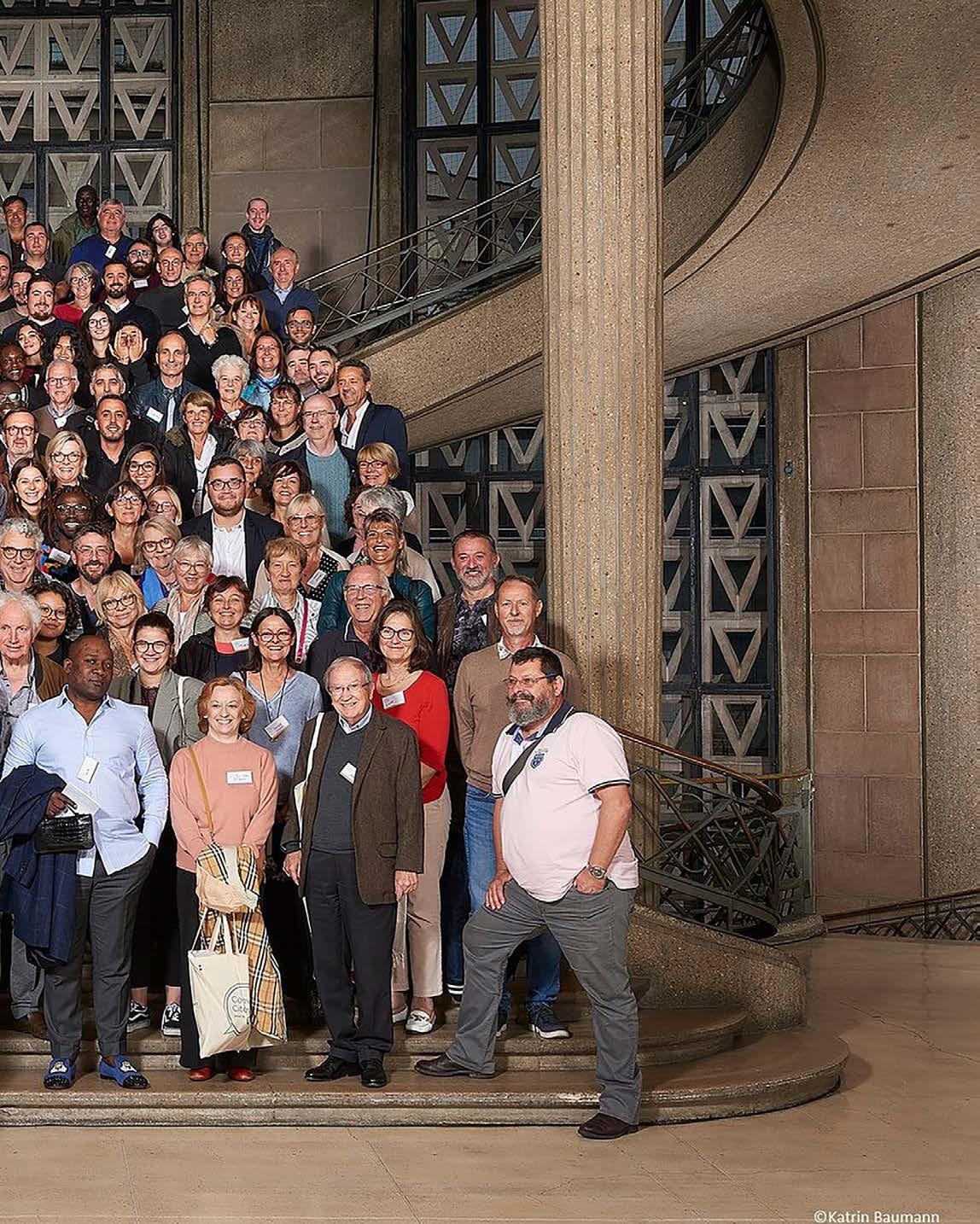
The Portuguese Presidency wants to kick-start the Conference on the Future of Europe promised immediately after the tug-of-war between the European Parliament and the European Council over appointing the President of the European Commission. The underlying issue is whether the EU is an ‘inter governmental’ or a ‘federal’ construct. Dutch philosopher of law Jaap Hoeksma (2020) looks at this from the angle of European citizenship. Is it – as commonly thought – grafted upon citizen ships of the member states or – his preferred option – is it the citizenship of the EU directly? If the latter, then EU citizenship – my interpretation – is like membership in a club, one that is an actor in its own right. So much for a rough summary. But consider now that member states have not created only one club but rather several: Some member states have opted out of Schengen and/or of the Euro as well as from other operations, like the services of an EU Public Prosecutor. Also, new members have been given leeway to prepare for assuming all the powers – and deriving all the benefits – of their being part of the club. So, the EU is a conglomerate of overlapping arrangements, and as such it is also in flux. In (Faludi 2018, pp 132ff) I have invoked a metaphor for thinking about it as an archipelago, with mem ber states like islands in a sea of functional relations. Citizens of each are the subjects and objects of policies of the respec tive islands, but they also interact with citizens of other islands. Some such relations may be bi-lateral and others multi-lateral.
Consider for instance the citizens of islands dependent on fishing, others on servicing offshore industries and still more deriving their livelihood from tourism. They require special reg ulations. Other arrangements concern all citizens of the archi pelago, like the establishment and management of a baseline under the United Nations Convention of the Law of the Sea (UNCLOS) marking its outer limits, a situation comparable to the EU's external borders.
Complicated? Not more so than reality in the EU is: Not all member states have the Euro, but non-members, like mini-states, including the Holy See and also non-member Montenegro have it. Not all EU members are in Schengen, while members of the European Free Trade Association and Switzerland are. A bizarre case, the latter country is in Schengen much as in the Single Market, but not in the Customs Union! Although a candidate member since 1993, presently Turkey has little chance of being admitted any time soon, but she is a member of a watered-down
version of the Customs Union even so.
So, surely, there are regimes beyond the two Hoeksma refers to: that of the member states and that of the EU as such. Indeed, the one-time Legal Council at the European Council, Jean-Claude Piris (2012) highlights a multitude of arrangements. Sometimes, this goes under ‘multi-speed’ EU, as if the end game were a truly united one. But the EU is -and will remain – a tan gle: ‘neo-medieval’ as in the subtitle of my book.
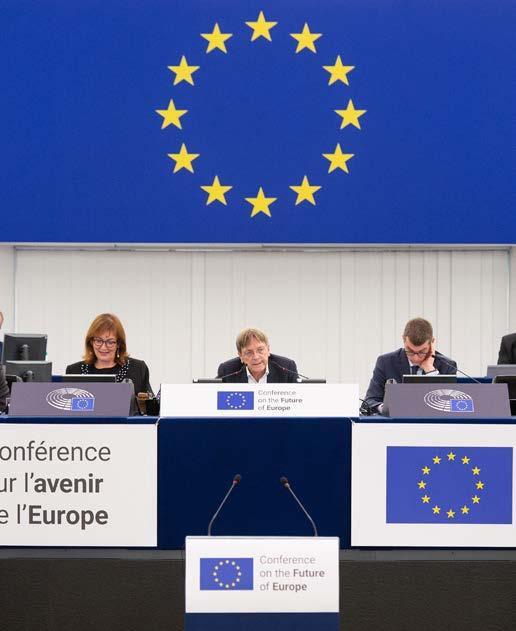
Thus opens the blurb of ‘Altered Pasts’. (Evans 2014) The same counter factual – Arch Duke Franz Ferdinand surviving to succeed Franz Joseph to the Austrian-Hungarian throne – is what ‘Der Komet’ (The Comet; Stein 2013) is about. Engaging in our friendly barter, Klaus Kunzmann has made me read this scenario of cultural and linguistic communities cohabiting in a Habsburg Empire that has anything but disappeared. Indeed, such had been Karl Renner’s vision, topic of another blog (‘The Nation: Myth or Reality?’). With his original work from the late-19th century now available in English, his model of national-cultural autonomy has drawn international attention. (Nimni ed. 2015)
Never mind Stein’s plot. It is merely the vehicle for convey ing his Utopian vision. With my Austrian upbringing and being a history buff, I enjoyed the idea of the former empire persisting as a truly multi-ethnic and polyglot polity where Jews had made their mark in all walks of life. Even in his Utopia, this caused some resentment, but never to boiling point. And, of course, Austrian culture continued, is the assumption: not the sugar-coated rep lica which it is now, but its original.
How did Stein think this was possible? By drawing on his toric sources showing that the pretender to the throne, Arch Duke Franz Ferdinand, have been inspired, amongst others by a Romanian lawyer, Aurel Popovic, proposing in 1908 to turn the double monarchy into a veritable federation of 15 member states, but with strong minority rights for all that did not share in the dominant cultures of each. I have seen such a map in a museum depicting the division of Austria-Hungary into a federal state.
One of the fortes of Stein is that, a historian, in the foot notes he painstakingly relates reality to what could have been. His sources allow inspire him to say that the Emperor could continue to carry amongst his titles the minor one of Duke of Auschwitz, and that Theresienstadt would remain the sleepy garrison town that it has been before gaining notoriety as the location of a Nazi death camp.
Austrian born, the author also pokes fun with his, pre sumably mainly German readership. I have some sympathy for the Austrian penchant for putting their ever-so-serious neigh bours into their place. A – surely apocryphal – story told is about German front line reports in the waning days of the Great War describing the situation as serious, but not catastrophic – while
the Austrians said it was catastrophic, but not serious! In the end, of course, the really catastrophic reports came from the 1918 German Spring Offensive. Famished German troopers may have been more interested, as Erich Maria Remark (1929) writes in his famous novel ‘All Quiet on the Western Front’, in the corned beef plentiful in the trenches of their opponents than in forc ing a breakthrough.
Be that as it may, Stein’s message that, if only rampant nationalism had been checked and if only extant ideas about cohabitation in multi-ethnic polities had been given a chance, history would have been less gruesome than it actually has. Alas, this is Utopia: maybe the reason why Stein lets his dream literally speaking explode: Astronomers on the moon – a German colony, entry to which required showing your passport upon leaving the moon rocket – discover a comet due to hit the earth. The thought of a peaceful future was too good to be true.
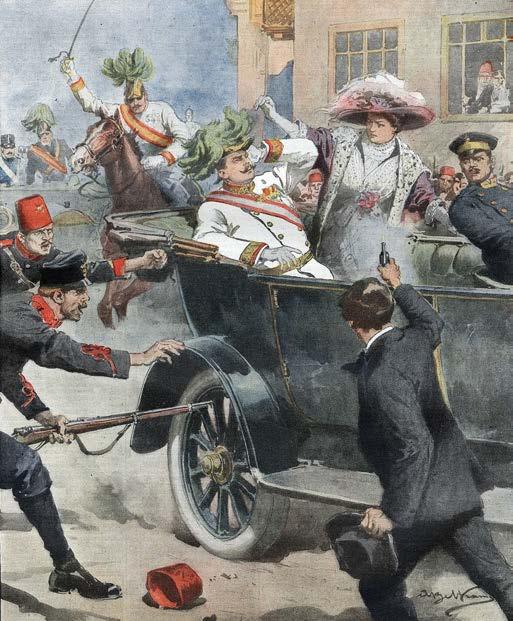
9
German speakers will recognise the allusion to the Gretchenfrage: one of the characters in Johann Wolfgang Goethe‘s ‘Faust’, an innocent young woman seduced by the chief protagonist secretly in league with the devil asking: Wie hast du's mit der Religion?10 (How do you feel about religion?) This occurred to me when reading a campaign folder of one of the 31 parties vying for votes in the Dutch general elections – uncer tain though they may be under COVID-19 – calling itself Volt. Its programme in Dutch11 says many right things. There is a whiff of En Marche – or is it some of the spirit of the Obama campaign? (Obama 2020) Be that as it may, what I am reminded of are students a quarter of a century or so ago when my inter est in European spatial planning was budding and when I was for integration, full stop. The students were in some European youth movement and I arranged for them to join me at some conference. Should Volt be my electoral choice?
I am not going to answer. (As yet, I don’t know.) What I am willing to do is to share my considerations:
(1) Strictly proportional representation means that, with 1 in 150 valid votes – 150 being the number of seats in parliament – you have one MP in the Netherlands. So, there are many par ties, some of them small. Not beyond the imagination that Volt might get in! Based on the one-and-only election they fought, the last one to the European Parliament, they might have three12
(2) Most of the time I vote for one and the same party hav ing a very real chance to be in – or at least being listened to by – the government. Why change horses?
(3) The answer of course depends on whether Volt caters more to my preferences than my habitual choice, in fact so much more that it’s worth the risk of my vote getting lost.
Answering comes down to the Gretchenfrage as above: To the extent of being for a strong Union at the expense of member states, Volt is ‘federalist’. That at least I am willing to buy. But,
FIRST PUBLISHED 10 FEBRUARY 2021.
10 HTTPS://EN.WIKTIONARY.ORG/WIKI/GRETCHENFRAGE. LAST ACCESSED 29122021.
11 HTTPS://VOLTNEDERLAND.ORG/POLITIEKE-STANDPUNTEN-PARTIJ#STANDPUNT_6.
LAST ACCESSED 29122021
12 LO AND BEHOLD, AFTER THE ELECTIONS, VOLT INDEED HELD THREE SEATS IN THE DUTCH PARLIAMENT.
critical of it though as I am, should I endorse what smacks of state territorialism – thinking more or less exclusively in terms of inside and outside the area for which the state is responsible, respectively for the people living in it – on the level of the Union?
If I remain true to my belief that the future will be – should be – a ‘neo-medieval’ one, then the answer should be no! But, if I let the youthful optimism of the, apparently well-informed pro ponents identifying many things that are wrong at present and nudging us away from state territorialism prevail, it should be yes. Worth the risk of wasting my vote?
Don’t hold your breath. Even if I knew it, I would not be telling.

In my blog concerning the ‘Gretchenfrage’, I abstained to say whether or not I myself would cast my vote for Volt. The new kid on the block would have to gain at least one out of every 150 votes cast and, anyhow, should I change horses midway? And does Volt suit my preferences? Am I still as 'EU-minded' as I used to be? In fact, I am wondering about where the EU is heading.
Having gained a whooping three seats, Volt receives much acclaim now. There is even talk about their joining a government coalition that might be short of votes14. But my purpose here is not to discuss the conundrum this would pose for them, if indeed being asked, but rather to discuss their electoral platform. This in view of evolving ideas about the EU as neither intergovernmen tal, as many want it to be, nor federalist as a dwindling group of enthusiasts (Volt included?) wishes to have it. So, what is the EU?
Doing away with national vetoes, one of Volt's planks, is rele vant here. Vetoes have been the bane of federalists ever since the 'Empty Chairs' crisis of the early 1960s when De Gaulle blocked all business until, not only France, but all member states retained their veto. Later, this would be known as the unanimity rule valid for all important issues. Abolishing it, as Volt as the European party – but now with a national branch in the Netherlands –would have it, could mean going from the frying pan into the fire. It would replace state sovereignty and territorialism with EU sovereignty. If I am exaggerating, then only a little! Whenever talking about the EU having to act forcefully – also on a global scale – this is precisely the imagery. Instead, what is needed is a rethinking the meaning of sovereignty.
French philosopher Jean-Marc Ferry (2020) tells us that sovereignty can – and should – be shared. I have learned about him from Nicolas Leron (2021) reviewing his latest book on 'La vie des idées', the website promoted by Pierre Rosanvallon. The argument rests on Ferry's ‘cosmopolitan hypothesis’ coming from no less than Immanuel Kant. Applied to Europe, it leads to thinking, not about federation, but about a cosmopolitan or transnational union where sovereignty is shared, for instance by networking the European Parliament with the parliaments of the member states, much as the latter between themselves. They, too, should form networks. I am reminded of Blatter (2019)
13 FIRST PUBLISHED 21 MARCH 2021.
14 IT HAS NOT JOINED THE COALITION FORMED NO LESS THAN NINE MONTHS LATER. IN FACT, IT MAY NEVER HAVE BEEN ASKED TO. ELECTORAL ARITHMETIC MEANT THAT THEIR 3 SEATS WERE NOT ENOUGH TO FORM A COALITION. WHAT WAS NEEDED WAS A SMALL (FOURTH) PARTNER WITH AT LEAST 4 SEATS IN PARLIAMENT, SO ONE WITH 5 SEATS HAS JOINED, SAVING THE NETHERLANDS THE TROUBLE OF HOLDING ANOTHER ELECTION.
proposing for self-styled ‘associated citizens’ to become mem bers of ‘associated parliaments’ dealing with issues common to two or more countries, an idea which he also applies to the gov ernance of the Eurozone.
Which is why Leron exonerates Ferry from the charge of advancing a supranationalism detrimental to the European pro ject. (See also Zielonka 2014) If this sounds far removed from planning, then see Sylvain Kahn (2014) on ‘The nation state as a territorial myth of European construction’. Invoking amongst others an earlier book by Ferry, he says about the EU: 'Each state willingly participates in the sovereignty that is enacted on other territories …. European construction therefore introduces a new concept of territorial sovereignty.' (224) Even more poignantly, Kahn concludes that in the minds of Europeans '…the nationstate … becomes the keystone of the narrative behind the Europe they are really constructing: a voluntary co-operative process of mutual sharing of their national territories and of the sover eignty embodied in each of them.' (227) Volt might thus see its task, not as promoting more Europe, but as making such shar ing a reality. If so, there would be planning implications galore!

At the occasion of the on-going ‘Conference on the Future of Europe’16, Koert Debeuf, chief editor of EUObserver proposes recreating the European Community as an add-on to the EU as is. Quite the opposite of a doomsday scenario, Debeuf pre sents this as a realistic alternative to the ever larger, ever closer and ever more problematic Union. Even if we were to succeed in keeping it together after absorbing those promised member ship and those with plausible claims to it, my point would be: would this not simply replicate the model of the nation-state at a larger scale? Is this not what truly supranational Europeans ask for: a state with a President, a Government, a Parliament directly elected by European citizens – and a common external border to defend? In Faludi (2018) I disapprove of the ‘territorialism’ of nation-states, each seeing itself as the home to a, purportedly homogeneous people, in so doing inviting closure, egotism and populism. Why replicate it on a larger scale?
Having observed the Arab Spring, in his earlier book on trib alization, the author of the comment on EUObserver explains first what the term means in Arabic: going back to your own tribe where ’…faces are familiar, rules are clear, expectations well-known. The enemy is easily identifiable, in the sense of everything and everyone outside the tribe.’ (Debeuf 2018) This is what we may expect if we go back to a simpler past in Europe. Should we counter this with tribalization at a larger scale, a ‘for tress Europe’? But one could also think of the Middle-Ages, more precisely the Holy Roman Empire (800-1806) featuring a jumble of overlapping spheres of authority as a model for the EU. In his commentary, Debeuf in fact alludes to something similar: a ’mul ti-speed’ Europe, one with a ‘variable geometry’.
But this is not so much about the future as it is about lived reality: For whoever wants to see, a multi-speed, or better to say pluriform Europe is already upon us. Debeuf merely proposes to add to the extant pluriformity by creating a new circle of European membership in the form of a new European Community ’…for those countries who want to join the EU, but probably never will.’ He gives Turkey and Maghreb countries and Georgia as exam ples but fails to mention the Western Balkans. Instead, he dis cusses a UK rejoining, if not the Union, then at least a European Community ‘Mark 2’, a safety net also for countries like Hungary. Falling ‘…under the necessary percentage of democracy and rule of law’, she would be able to ‘…automatically fall back into the
15 FIRST PUBLISHED 6 JULY 2021. 16 HTTPS://FUTUREU.EUROPA.EU/ (LAST ACCESSED 27122021).
European Community, and out of the European Union’.

I am not aware of that threshold ever having been spelled out, nor of any mechanism for making member states fall out of the EU and into a new European Community. But, the very men tion of alternatives to EU membership is welcome. And there are also extant vehicles for differential integration: the – overlap ping – areas of cooperation on scales as varied as cross-border areas to macro-regions. Not only that, even EU flagship projects like Schengen and the Euro, while extending to some non-mem ber states, do not include all existing members. Not to speak of international treaties managing, by hook or by crook, air space, sea space, outer space, climate change, world trade, care for refugees, and so forth.
Not the real thing? Not what we need: halfway houses to full integration? But why this reluctance of accepting a variety of arrangements? Because we invoke a meta-spatial planning theory that privileges absolute spaces, each owned by a single people – a tribe - with personality, having a history and expect ing to have a future. In so doing, one forgets about functional spaces, much as about the emotional spaces of belonging we call places rather than territories. In short, one falls into the ter ritorialist/tribalist trap!
At the 2018 conferences of CIST (Collège International des Sciences Territoriale) my paper (Faludi 2018a) was one of only two offered in English. Not to worry: I met exciting people and my extended paper went into the Dossier des Annales de Droit. (Faludi 2019) Like me, Kahn and Richard (2020) under score the EU being – my term – a ‘neo-medieval’ construct and as such lacking a supreme, sovereign authority. So, its territory is no identifier but, sharing their sovereignty and territoriality as they do, the same goes for its members: As the empire it is, the EU distinguishes itself by the mutualisation of policies. Besides, many of those policies apply, not to the whole, but only to some of its parts. In addition to which ‘…some policies, standards and regulations are exported and applied in third countries, which implies the integration of those territories…’ (Kahn and Richard 2020, p 129). Which comes down to ‘… a form of statehood … not covered by the classical idea of the territorial state’ (p 130).
Think of monetary policy giving as it does the EU statehood, but one that extends ‘…into states that use the Euro but are not in the eurozone or even in the EU…’ (p 131).
This imperial construct is neither fixed nor mono-scalar, but an ‘auto-empire’ where ‘…each nation runs its territory jointly with the other nations, while also participating in the produc tion of the territories of the other nation states … through the implementation of regulations that have been co-produced … This … means that any immediate all-encompassing perception … of a clear link between sovereignty and territory at EU level is unpredictable’ (ibid). So conceived, European territorial sov ereignty is not superimposed. It rather merges national juris dictions. But, this ‘…makes it all the harder to encompass it in a simple representation’ making for ‘…the elusiveness of a com mon territorial referent’ (p 132).
In fact, the authors identify, not one but four forms of ter ritoriality: state-nationhood; imperiality; local statehood (which they do not discuss) and 'reticularity' standing for ‘…the process by which networks produce territory’ (p 134). The latter alludes to the involvement of civil society. After all, historically speaking, ’…the production of Europeanness had little to do with political society and statehood … Europeanness only became a matter of political society, statehood and ultimately of politics with the advent of what became the European Union‘ (ibid).
The downside is that the EU being moulded by reticularity makes it difficult ‘… to construct a territorial culture that can serve as a shared referent … and which could be linked to a simple spa tial representation’ (p 135). But, although neither sovereign nor a state, the EU can still have coherence and territoriality through its being governed by means of ‘…flexible, fluid and negotiable relations…’ (ibid). The outcome is an unintended, collectively con structed quasi-territory linked to European sovereignty. Which is why it is difficult for people to develop a sense of ownership and to treat the EU as a reference point. ’Delimitation is also problematic, because it is very hard to say where the bounda ries of the EU lie. These things together represent a major issue for supporters of the EU, if they want to relaunch the European project’ (ibid). It is after all a ‘…fuzzy, complex and not always hierarchical territorial post-modernity [which is – AF] problem atic for the establishment of a political community‘ (p 137).
Which can only mean that much debate about the EU –including the one about to break loose at the Conference on the Future of Europe – in terms of ‘them’ at Brussels and ‘us’ in the member states is bound to be sterile. Look first at the tangle we are already in, I would say!
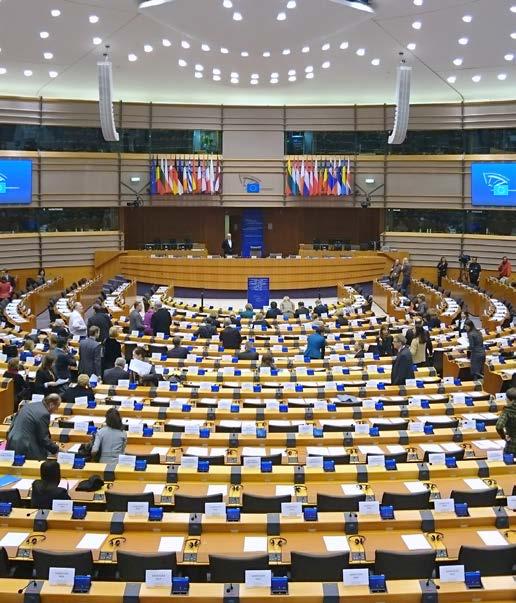
It ‘…is surely a category error to expect nation-states to behave like humans — like trying to extrapolate the incidence of pileups on highways from an understanding of the inter nal combustion engine.’ Still, the analogy is one ‘…of the oldest ideas in Western political thought’. By way of illustration, Niall Ferguson (2021) invokes the frontispiece for Thomas Hobbes’ Leviathan with a gigantic torso standing for the state made up of three hundred men.
Now, if committing the category error of personalising what cannot be personalised is true for states, how much more so with regional or global institutions? But what should come in their place? In Faludi (2018, 112-113) I invoke Parag Khanna (2011) saying that the world order is ‘neo-medieval’ and make the same claim about Europe and European planning. In ‘Grand Challenges of Planetary Governance’, Young (2021) eschews using this trope. But his expecting the future to be one of dif fuse arrangements might equally be described as neo-medieval.
The standard belief, he says, is to think of the international order as consisting of sovereign states ‘…in the sense that they have full authority over their internal affairs and are not subject to external or superordinate standards to which they have not given their explicit consent.’ (2021, 130) Which is also the stand ard view of the order prevailing in the EU. But in the Middle-Ages there were no sovereign states, and Young gives three reasons for thinking that, once again, they are not the dominant building blocks for an international order. The reasons are (1) the spread of globalisation, (2) the rise of non state actors and (3) the onset of the cyber age. Between them, these developments make for fundamental change, which of course also applies to the EU.
But, surely, states are not going to go away! Fortunately, my neo-medieval view of Europe and European planning does not imply anything of the kind. But do expect states, as the human constructs they are to change their feathers. They can do that, precisely because they are unlike humans. Rather, they are conglomerates of arrangements. Causal logic does not nec essarily apply.
Which also means that, however much we would like to, we cannot apportion praise and criticise failure in the same way as with human actors. Which in turn makes for arrangements for managing inter-state relations being complex: ’Systems featuring considerable heterogeneity (…) prevailed
over long periods of time in Europe to the middle of the 17th century (…). This suggests we should guard against the adoption of simple assumptions regarding the homogeneity of the actors in systems of public order reflecting nothing more than the fact that we have grown up in international society treaties as a social system in which all the members are sovereign states.’ (Young 2021, 153) The reason why is that each of the three modes of globalisation will give rise – in fact is already giving rise — to the emergence of new, powerful actors that operate next to and beyond the bounds of nation states.
Young ends his book on the challenges of global governance with what I would enlist as one of my famous last sentences: ‘It is time to turn our attention (…) to enhancing our understand ing of the dynamics of alternative forms of order that may arise on a global scale during the coming decades.’ The game changer should be the acceptance of the need to end the sterile debates about the nature of the EU – whether a collection of sovereign states within some loose common framework or a superstate aspiring to world power status. To provoke such a rethink has been the intention behind my invoking, certainly not as the only one, the notion of neo-medievalism.

STARI MOST IN MOSTAR, A UNESCO WORLD HERITAGE SITE SINCE 2005. PHOTO BY RAMIREZ, CC BY-SA 4.0. SOURCE: HTTPS://COMMONS.WIKIMEDIA.ORG/WIKI/FILE:MOSTAR_ OLD_TOWN_PANORAMA_2007.JPG.
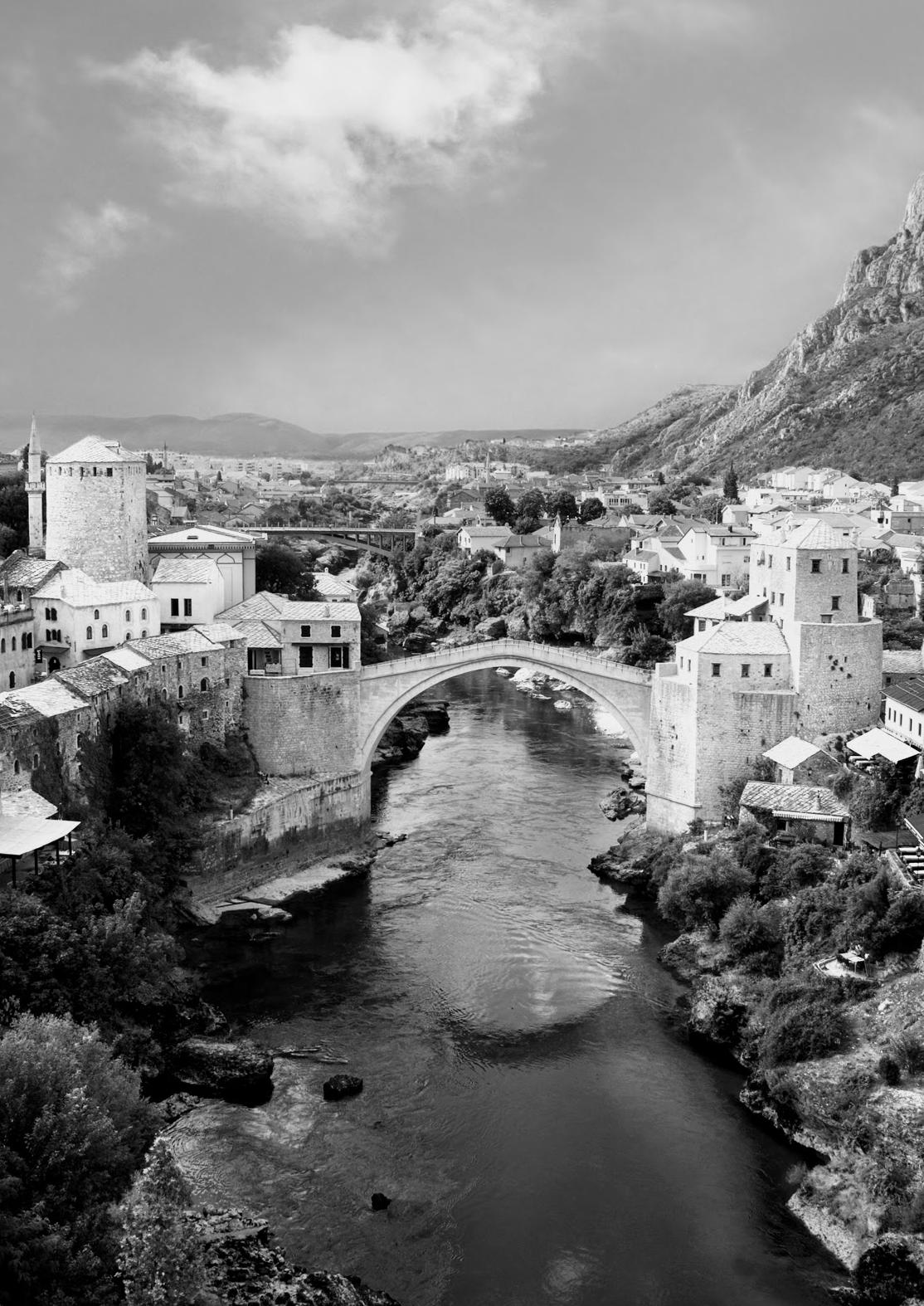
Ihave reasons for watching the Western Balkans. Although away from Vienna for longer than I care to remember, having spent my formative years there, I can claim a measure of understanding of their geog raphy and history. Not only that Austria feels close to, and has been greatly affected by, the Balkans — think only of the fateful murder at Sarajevo, on June 28, 1914, of the AustrianHungarian pretender to the throne which ultimately led to the demise of its old empire — mentally speaking to Austrians the Balkans were closer than our next-door neighbour, the country of my birth, Hungary, a Soviet satellite at the time. (I revisited once, in 1960, but that is a different story.)
With the Balkans — which to us were identical to what at that time was Yugoslavia — the links were manifold: There were guest workers in the country whom we summarily called Yugoslavs and, when visa requirements were lifted, one of my summer jobs was accompanying tourist buses travelling over night to the resorts on the Adriatic coast. I still remember the exchange rate: 1 Schilling to 300 plus Dinars! (The experience also led to my getting a good idea of the life and work and cama raderie of bus drivers.)
I also went on student field trips to Yugoslavia and, from my new position at the Oxford Polytechnic joined an AmericanYugoslav Summer School sponsored by the Ford Foundation in 1968. When in the Netherlands, I went sailing from near Zadar in the 1980s. I recall having been puzzled by the attendant look ing after our boat volunteering that he did not mind Serbs using Cyrillic script. Knowing from my short career as a stamp collec tor that Yugoslavia used both Latin and Cyrillic script, I thought: what was the big deal? Now I know.
More recently, I resumed my interest in the Western Balkans. This was when I was invited to celebrate Europe Day – 9 May — in Tirana. At that time I had already started blogging, mainly to announce progress on writing, publishing and getting attention for ‘The Poverty of Territorialism’ (Faludi 2018), the topic also of my lecture (See ‘Andreas Faludi at Polis University’). It was at that point that I widened the scope of my blogging activities with observations as to the relevance of territorialism – and increas ingly also populism – for understanding European politics. (For first example see: ‘Europe Day in Tirana -- Postscript’.)
This was because what had struck me at Tirana was the fervent hope for Albania in due course to become an EU mem ber. By that time a keen follower of the development of the EU,
I was aware that, after Croatia’s accession in 2013, enlargement seemed to have ground to a halt. So I began to take an interest, reflected in the blogs in this section in the issues and attitudes concerning this vital matter.
More importantly, of course, as I write these lines, to rekin dle the process, the Slovenian Presidency of the Council of Ministers has just held a conference on enlargement to include the Western Balkans. Prior to it, no less than the President of the European Commission, Ursula van der Leyen, has travelled the Western Balkans reassuring candidates Serbia and Montenegro and would-be candidates Albania, North Macedonia, Kosovo and Bosnia-Herzegovina that enlargement will continue – a sure sign that it is in trouble. There is, after all, little appetite in North-west Europe for further enlargement. France and the Netherlands still rail from losing the referenda held in 2005 con cerning ratification of the ‘Treaty establishing a Constitution for Europe’. At least as far as France is concerned, scaremongering over Turkey, having been a candidate since 1999 joining — an event that is now even more remote than at that time — appears to have played a role. Meanwhile, popular, not to say populist resistance to enlargement makes for even more problems. Never mind that one out of every four Albanians already lives abroad, many of them in the EU. Never mind that Russian and Chinese influence in the Western Balkans seems to be growing. Never mind that Turkish President Erdogan rallies his countrymen liv ing throughout Europe in Bosnia where he is welcome to spread Neo-Ottomanism1. Geopolitics is not a vote catcher.
Not only that, for reasons explained in ‘Balkan Ghosts’, new EU member Bulgaria throws another spanner into the works. She insists that its language and nationality issues with North Macedonia must be sorted out first. History is ever so important in these parts of the world! The issue of Kosovo — the dispute at the time of writing concerning car number plates seems to be serious enough to warrant the mobilisation of some forces — stems from the then Kingdom of Serbia having made territo rial gains during the Second Balkans War in 1912, adding what is now Kosovo with its many Albanians to its territory.
Indeed, as I comment in ‘A Non-Paper’, Albanians were, and still are, spread over a much larger area than that of what is presently Albania. The spectre of their uniting in a ‘Greater Albania’ – one such existed, albeit briefly, under Italian tutelage during World War II — is floating around. But how did Albania come into existence in the first instance?
To prevent Austria-Hungary’s long-term rival and thorn in the flesh, Serbia, gaining access to the sea, she sponsored its establishment on a stroke of land along the coast between the Kingdom of Montenegro — another Austrian-Hungarian
1 HTTP://EN.WIKIPEDIA/WIKI/NEO-OTTOMANISM.
protégée — and Greece. Typically, there was as yet nothing like an Albanian nation. Instead, its very construction started under Austrian tutelage and continued even during the Great War. (See: ‘Late Victims of Territorialism’)
To return to the present, there is, to reiterate, no real pros pect for enlargement to happen any time soon. This so much so that there is discussion, not only in the Netherlands, as to whether to forget about the promise given at Thessaloniki in 2003 that all states of the Western Balkans would eventually be admitted. ‘The people of the Western Balkans are overall pro-EU, but they also feel offended by what looks like a series of broken prom ises, egoism and hypocrisy on the EU part. Russia and China, and Turkey in the case of Bosnia and Albania, appear to them as more honest, or at least straightforward, partners’, writes the long-standing commentator from Bulgaria Georgi Gotlev (2021). Planners from the Western Balkans, many of them trained in the EU and/or the US are concerned about lack of progress in the accession talks. There is a Western Balkans network exploring relevant issues. I had the pleasure of contributing a paper (Faludi 2020) to one of their publications where I propose that, whilst waiting for the gaping hole in the body of the EU on the Western Balkans to be closed, there is nothing to prevent cross-border and intergovernmental cooperation to be strengthened. (See ‘The Western Balkans Pioneering’) The outcome would amount to a jumble of overlapping areas which, hopefully, would miti gate unhelpful nationalism-cum-territorialism. It may even bring the situation closer to the ‘neo-medievalism’ I propagate in ‘The Poverty of Territorialism’. (Faludi 2018; see also Faludi 2021 and the blog ‘The EU is Not Eternal’) Interestingly, on the Western Balkans themselves, similar ideas are emerging. There is the idea of a ‘mini-Schengen’ including Serbia, North Macedonia and Albania (not Kosovo!) and, in the absence of any realistic pros pect of the process leading to accession to start, prime minister Rama of Albania has proposed to strengthen functional coop eration. Which is what Eichenberger and Frey (2006) reiterating what Frey and Eichenberger (1999) have said (see Faludi 2016; 2021) have recommended: Skip the cumbersome process of accession and go for functional integration case-by-case instead.

Polis University and Co-PLAN Institute are an international university annex consultancy at Tirana in Albania. Having heard me speak about ‘The Poverty of Territorialism’ in Vienna, Rudina Toto invited me to speak there on Europe Day – 9 May – com memorating the Schuman Declaration of 1950 vintage leading to the European Coal and Steel Community, predecessor of the European Union: An occasion to reflect on the divergent ideas of participants from (Western) Europe (for the occasion including Italy) starting with Winston Churchill’s call for a United States of Europe (apparently without the United Kingdom) having led to no more, but also no less than the Council of Europe going strong, as it does, on human rights. As against this, the Schuman Plan stood for functional integration, of eminent importance so shortly after the war. Subjecting coal and steel production in Germany and France and in the four other member states to the control of an international ‘High Authority? – with Jean Monnet the President – would – and did! – make their re-tooling for another round of the European civil war impossible. From there, European integration took its twisted course remaining, as we know, hotly debated. My book suggests – not as the only one –that this would take us into a more ‘neo-medieval’ future, with the Western Balkans a possible test bed. This is not meant to be pejorative or even ironic. While the – belated – emergence of nation-states on the Western Balkans seems to be evidence of territorialism at work, I sense the re-emergence and re-asser tion of mixed and fuzzy identities.
2 FIRST PUBLISHED 14 MAY 2019.
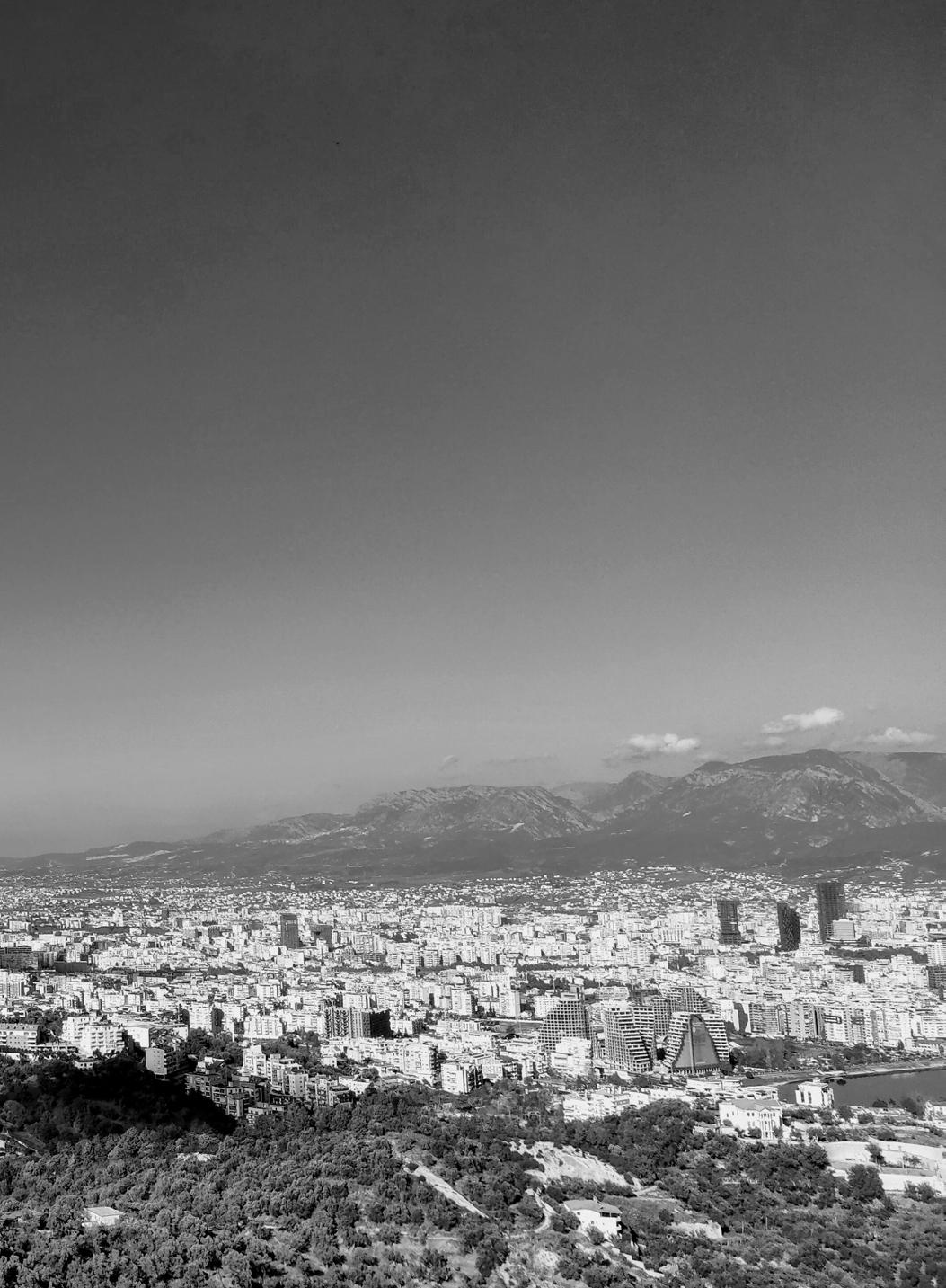
At the ESPON seminar in Vienna held in 2018, I was very kindly invited to give a talk at Polis University and Co-PLAN Institute, an international university annex consultancy at Tirana in Albania. The occasion was Europe Day on May 9, 2019. As is well known, on that date we commemorate the Schuman Declaration leading to the European Coal and Steel Community (ECSC), pre decessor of the European Union. I used the opportunity to reflect on the different ideas of members of the ECSC hailing from northwest Europe and Italy. There was of course also no less than Winston Churchill calling for a United States of Europe. Apparently he did not, however, intend for the United Kingdom to become part of it. But Churchill has been at the 1948 Amsterdam con ference leading to the establishment of the Council of Europe.
Leaving a European federation for what it was, the Schuman Plan itself meant functional integration, important as it was at a time when the productive capacity of the Ruhr Area was under Allied control. Mobilising this capacity —and with it (West) Germany — in the contest with the Soviet Block seemed a neces sity. What Schuman proposed was a joint ‘High Authority’ to reg ulate coal and steel production. The intellectual power behind this was Jean Monet (Cohen 2012) who subsequently became the first President. All of which made the re-tooling of Germany and France for another round of the European civil war that has raged since the French-Prussian war of 1870 inconceivable. From there, European integration took its course, always hotly contested as it was. In ‘The Poverty of Territorialism’ I argue — not as the only one — that this will take us, not to a formation like a (super-)state, but into a more 'new-medieval’ future, with the Western Balkans a possible test bed. This is not meant to be pejorative or even ironic. While the — belated — emergence of nation states (Albania itself only in 1912) seems to be ongoing, with Kosovo the latest additions on the Western Balkans, there seems evidence galore of territorialism at work. But I also sense the re-emergence and re-assertion of some mixed and fuzzy identities. True, for understandable reasons the focus in Albania as a future candidate country is now on preparing for becom ing an EU member state proper. But I hope that there will also be reflection on existing relations and networks in the Western Balkans. If this raises the hackles of national leaders focused on their territories and borders, then so be it. The aim should be as much functional integration across borders as possible.
North-west Europeans objecting to Western Balkans enlargement had better not turn up their noses: With effects well-known, they have exported their territorialism, not only thereto, but worldwide. (Badie 2018)
It all started in with some late-18th century fake-news, the discovery of works ascribed to a mythical Gaelic bard Ossian singing the song of his homeland. Contemporaries already ques tioned these alleged discoveries made by one James MacPherson. Nonetheless, the reception was enthusiastic. (Loriaux 2008) Discovering — better to say concocting — ancient traditions and blood lines suited the yearnings of Romantics for authenticity. There was the example also of the French Revolution identifying, as it did, the people with their state and vice-versa. Which implied different peoples each occupying their own territory. It was for instance then and there decided that the Rhine was a ‘natural’ border between France and Germany – the latter still a jumble of principalities with Prussia and Austria vying for dominance.
The search was also on for national languages and traditions in the arts and music. (Thiesse 1999) Where none could be found, one was constructed from such fragments as could be discovered.
The Balkans, though, were uncharted territory. There was no idea of national identity. The Ottoman Empire had no time for this. It levied a special tax on non-Muslim subjects, but respected diversity, allowing religious communities to run their own affairs. So, there was no need for heavy-handed administration. Loose arrangements sufficed, outsourcing many tasks to local chiefs. Even military power was often in their hands, with Albanian war riors excelling as fighters and chieftains. (Lord Byron gives an enthusiastic description of one such.) The upshot was, as an ear ly-twentieth century Austrian source to be discussed comments, there were no systematic surveys, no population registers and no accurate maps, none of the marks of a developed nation-state.
But in the early-19th century, Serbia, followed shortly by Greece (which is when Lord Byron taking up the cause of the Greeks paid with his life, dying from a fever) became budding nation states. Also and in particular, as the grip of the Ottomans weakened, other powers at the time began to take an active interest, gobbling up chunks of territory and promoting client states. Here I focus on the attempt to reshape part of the Western
Balkans, present-day Montenegro and in particular Albania, as Austrian-Hungarian client states and the roles of administrators, surveyors and also geographers in this. My source is a long report published in the waning days of the Austrian-Hungarian monar chy. As part of a much larger delegation, the author by the name of Oberhumer had been travelling to those parts by courtesy of the Austrian-Hungarian Army. This was in 1917.
Oberhumer gives a detailed account, reporting on their means of transport, on the military brass they were meeting, the officers’ messes where they were no doubt receiving bet ter fare than in Vienna where people were on hunger rations at the time, but also on the lay of the land, the infrastructure, such as it was, the few maps that were available and who amongst his geographer colleagues had made them to which scale and using what types of symbols. It was clear that he perceived the Balkans as virgin territory inhabited by a mixture of religious groups, tribes and remnants of Ottoman structures. There had never been proper censuses, he reports, and what censuses had been were unreliable. At the same time, Oberhumer excelled the work of the military administration, both in Montenegro, a kingdom created only shortly before the war and by then under Austrian administration, and in Albania, an Austrian creation and during the Great War divided into an Austrian occupation zone, with the remainder shared variously between the Greeks, Italians and even the French.
Our source expands on the beneficial effects of the Austrian occupation creating a common language, insisting on a new — Latin — alphabet in a form adapted to Albanian, developing school curricula and attempting to unify the tribal structures, all with out for a minute reflecting on whether a modern nation with a modern administration of a clearly defined territory suited the situation on the ground. The benefits were considered evident.
The Austrians of course soon had to leave the Balkans, with Albania becoming part of the Italian sphere of influence and soon its virtual colony (and as such the launch pad for Mussolini’s hap less invasion of Greece in 1941). Once again, the underlying force was territorialism: the unquestioning belief that cutting up the surface of the earth into homogeneous units with an identifia ble shape with hard borders, each country inhabited by a unique people meant progress.
In this, not only the Austrians at the time, but all powers have been singularly unsuccessful on the Balkans. To remain with the example of Albania: There are, sometimes large Albanian minor ities in all neighbouring countries and beyond, and the country itself is linguistically and religiously diverse. Nothing wrong with either! There is probably only one Balkan state, Slovenia, with its two million inhabitants similar in size to Albania that is homoge neous. All others are constructs.
In ‘The Poverty of Territorialism’ (Faludi 2018) I show the ter ritorial nation-state to be a modernist construct imposed on a fluid and complex reality. Which was particularly true for the Balkans. Thanks to the role of an, often small, literate elite inspired by the same fervour to identify ancient roots and forebears that had engulfed Europe (Loriaux 2008; Thiesse 1999), nationalism created nations and nation-states where none such existed before. Which did not simply amount to undoing the, once menacing Ottoman Empire meanwhile dubbed the ‘sick man of Europe’. No, it meant replacing one form of spatial organisation not based on ethnic lines with another one that was. In their efforts to legitimate their rule, emergent Balkan states – or rather their proponents amongst the elites – thus created the very ethnicities meant to justify the existence of nation-states.
Take this example from the Balkan Wars, functionally part of the Great War. Under Ottoman rule what had counted were reli gious affiliations: Non-Muslims had to pay a special tax but were otherwise free to practice their faith, the marker of their identity. So, the propagators of nationalism — more often than not coming from the diaspora — were met with indifference from their sup posed compatriots. Borodziej and Górny (2018) report for instance on peasants in present North Macedonia being asked whether they felt more Greek or Bulgarian (Greece and Bulgaria having been the two contenders for their territory at the time). In lieu of an answer, the peasants made the sign of the cross to show they were Christians. Rather than the language they spoke – most likely a local vernacular – or their ethnicity, this was their identifier. So, they showed little interest in reviving supposedly ancient national traditions, let alone in embracing modernist reforms. For them to become aware of whatever nationality they were supposed to have, according to Borodziej and Górny, their religious identity needed to be superseded with another one defined by a national language (which they hardly spoke) a history and culture (which they did not share) and by attachment to new territorial borders (which were the, more or less incidental outcome of the latest war).
The reader might note the irony of nationalism, now consid ered to be a defender of national identity against global elites, itself being the product of a global ideology imposed on unaware locals. Indeed, nationalism was a global movement, with its proponents in various countries helping and inspiring each other. Anne-Marie
TERRITORIAL CHANGES AS A RESULT OF THE FIRST BALKAN WAR, AS OF APRIL 1913 SHOWING THE PREWAR AGREED LINE OF EXPANSION BETWEEN SERBIA AND BULGARIA. SOURCE: ENDOWMENT FOR INTERNATIONAL PEACE. (1914). REPORT OF THE INTERNATIONAL COMMISSION TO INQUIRE INTO THE CAUSES AND CONDUCT OF THE BALKAN WARS. WASHINGTON: THE CARNEGIE ENDOWMENT. PUBLIC DOMAIN. SOURCE: HTTPS://EN.WIKIPEDIA.ORG/WIKI/BALKAN_WARS#/MEDIA/ FILE:BALKAN_BELLIGERANTS_1914.JPG
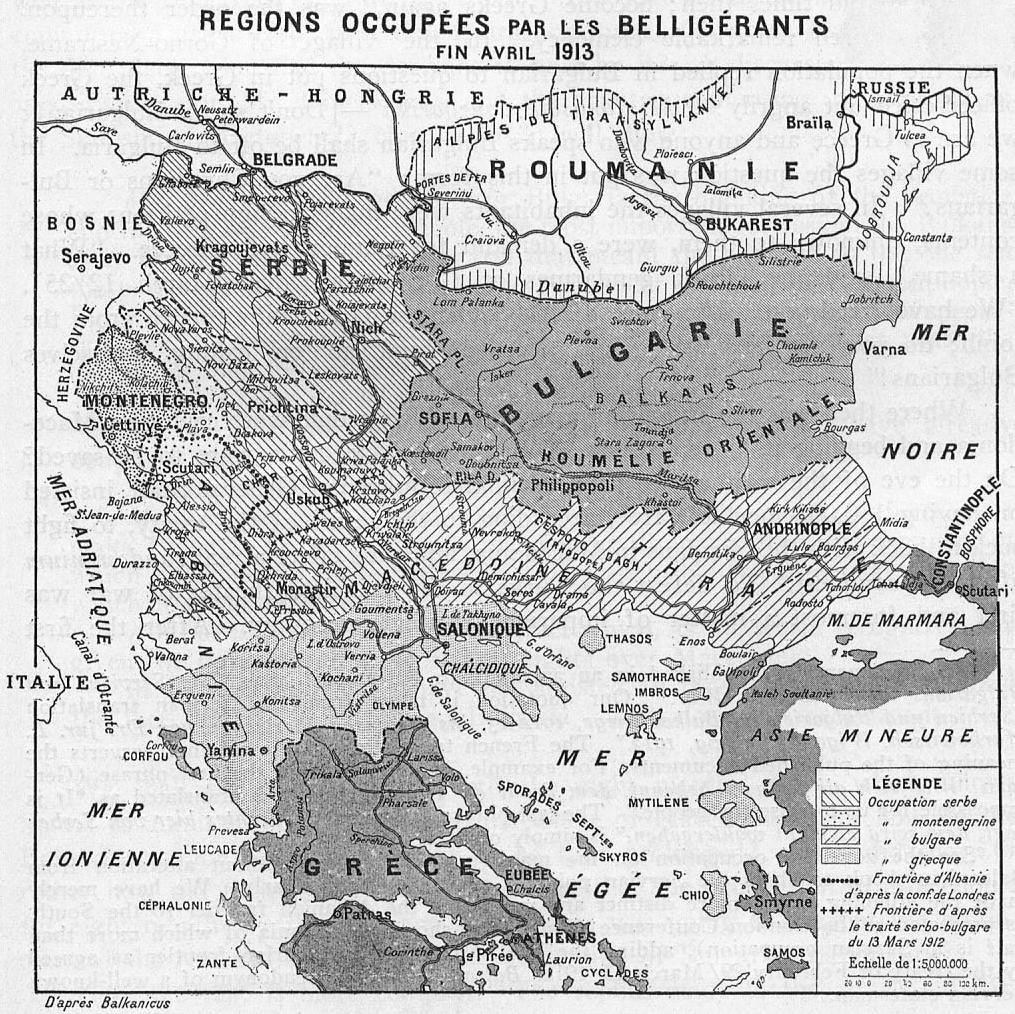
Thiesse writes for instance about German and Czech nationalists happily supporting each other’s efforts to establish their ancient roots. At least this was the case until the idea took hold the each cultural and linguistic community needed its own homeland. ‘The universality of the national’, Thiesse writes, ‘passes by the particu lar, by the total restructuring of space into discrete and equivalent units. However, the novel organisation of the world and the inter national societies for adjudicating between nations are incapable of preventing bloody confrontations. Because no one definition of the nation carries within it an uncontestable answer to a fun damental question: how to define the territory of the nation…’ (Thiesse 1999; translation AF)
Having succeeded – just about – in creating new states, their advocates were therefore convinced that minorities were a prob lem. Under the Ottomans, minorities had been loyal subjects of the Sublime Port ever since the conquest of Constantinople and the Balkans. But nineteenth-century territorialism wanted the purification of the bodies of states; not a Balkan speciality by any means! In the Balkans, population exchange, together with the more or less forceful reshaping of the identities of the population in place, merely started late and lasted – lasts – longer.
To focus on Albania, the immediate cause of my delving some what into Balkan history, established by the great powers, the country was allocated lands to which Montenegro, Serbia and Greece also had claims. And by no means all lands inhabited by Albanians were included. Before this could erupt into conflict, the Great War nipped the emergence of an Albanian state in the bud: Opposing forces occupied sections of the country. After a spell of independent existence under a brutal regime, eventually styled as a kingdom, during the interbellum, Albania became an Italian col ony, only to regain its, still shaky independence after World War Two. Ironically, it took the subsequent Communist dictatorship of Enver Hoxha to really make Albania. He unified the language and created central institutions, all at the expense of, amongst others, the mainly Greek minorities.
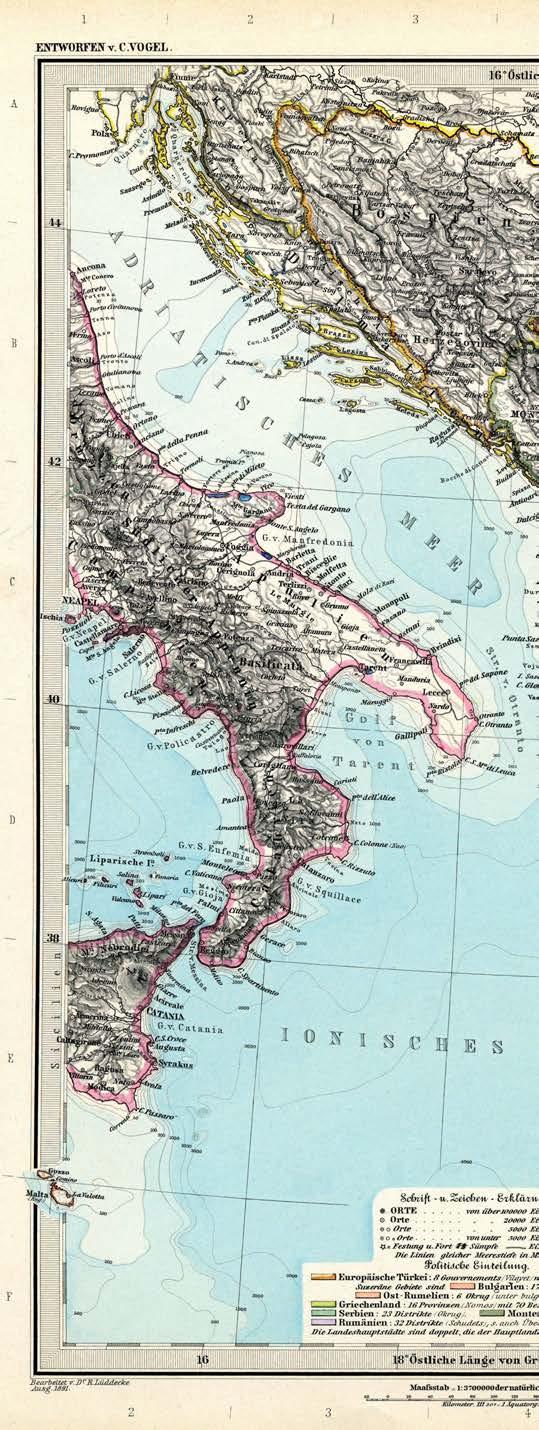
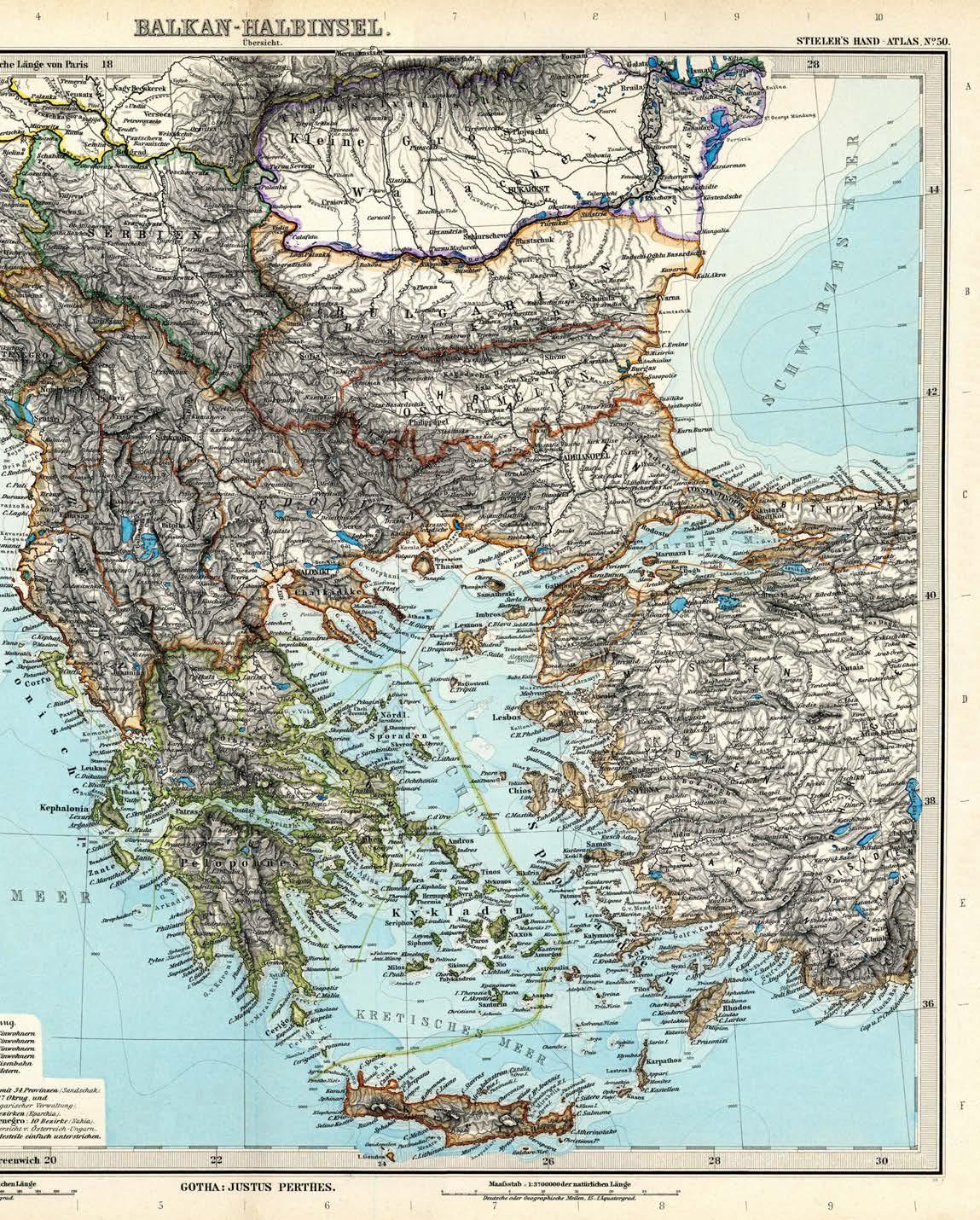
At loggerheads over their claims to Gotse Delchev7, will Bulgaria derail the start of negotiations over EU accession of North Macedonia8? But who is Delchev? A Bulgarian national, he had been campaigning for Macedonian independence when it was still under the Ottomans. For this he was killed by Ottoman troops in 1903. The end of the Great War saw Macedonia as part of the new Kingdom of Serbs, Croatians and Slovenes. So Delchev was posthumously declared a Macedonian. He changed his identity again when, albeit briefly, collaborating with the Germans, Bulgaria regained possession of those lands. Not to be outdone, after World War Two, the new Yugoslavia declared Delchev — whose remains by that time were in Sofia — a hun dred percent Macedonian. Otherwise on friendly terms with present-day North Macedonia, Bulgaria still thinks of North Macedonians as Bulgarians and of their language a Bulgarian dialect. So, Bulgarians continue to think of Delchev, too, as hav ing been a Bulgarian. See here the legacy of importing European 19th-century nationalism.
In post-war Austria and fed on its own version of history — Gabriel Princip’s murder of the pretender to the AustrianHungarian throne instigating the Great War — the Balkans were a near, yet foreign neighbour. As a student in Vienna, I had ful some Balkan meals at a place probably in the informal economy behind shutters half-closed. Amongst Balkan migrants, Yugoslavs were prominent, but we did not distinguish between their sep arate ethnicities. Nor did we when vacationing in a Yugoslavia closer to — and cheaper — than Italy. I recall being amazed when hearing complaints at Ljubljana about internal migration from the south. About Kosovo, we did not know the first thing. (It had been added to the then Kingdom of Serbia only after the Second Balkan War. During the interbellum, briefly, it was part of an Italian puppet state Greater Albania!)
History is important, and on the Balkans even more so. Fulfilling past dreams, the Serbian King had turned the Kingdom of Serbs, Croatians and Slovenes into Serb-dominated Yugoslavia. This was in 1929. In 1941, the kingdom had met its end at the hands of invading Germans and Italians. A much enlarged German vassal state, Croatia, including amongst others Bosnia Herzegovina had viciously persecuted other ethnicities and
6 FIRST PUBLISHED 12 MAY 2020. 7 HTTPS://EN.WIKIPEDIA.ORG/WIKI/GOTSE_DELCHEV 8 HTTPS://WWW.EURACTIV.COM/SECTION/ALL/SHORT_NEWS/BULGARIA-COULD-BLO CK-NORTH-MACEDONIAS-EU-PATH-OVER-COMMON-HISTORY-INTERPRETATION/
non-Catholics. A — hesitant — German ally, Bulgaria had retaken Macedonia from Yugoslavia and the Thracian coast from Greece. Both had been its prizes already during one or the other of the Balkan Wars heralding the Great War.
The Balkans have thus had their share of territorial con flicts. Not only has Europe exported nationalism, to start with by supporting Greek independence in the early-1800s, reactions to Tito’s parting reflected — and reflects — the same thinking in terms of, supposedly historic claims to territories. Now that the successor states are more or less on the map, the EU is dangling before their noses the prospect of membership.

But this EU is itself under the spell of nationalism-cum-ter ritorialism. Before joining, the Western Balkans must become proper nation-states, seems to be the thinking.
In the latter days of the Soviet Empire, for what was happen ing behind the ideological façade, scholars invoked the concept of ‘real socialism’. There is also a ‘real EU’. Far from a unified entity, it is one of partial and overlapping arrangements, exceptions and there are also joint policies and projects at infra-national level. Some, including myself, have invoked the term neo-medievalism for this. This ‘real EU’ stretches across its outer borders, includ ing to the Western Balkans. If this were to be accepted as the model, enlargement would be more relaxed, leaving the many Delchevs to the historians. ASSASSINATION
A PUNCH CARTOON BY ENGLISH CARTOONIST LEONARD RAVEN-HILL DEPICTING BRITAIN, FRANCE, GERMANY, AUSTRIA-HUNGARY, AND RUSSIA SITTING ON A LID ON TOP OF A POT MARKED "BALKAN TROUBLES", SATIRIZING THE SITUATION IN THE BALKANS LEADING UP TO THE FIRST BALKAN WAR, BY LEONARD RAVEN-HILL, CORNELSEN - KURSBUCH GESCHICHTE - NORDRHE IN-WESTFALEN, PUBLIC DOMAIN. SOURCE: HTTPS:// COMMONS.WIKIMEDIA.ORG/W/INDEX.PHP?CU RID=7707964
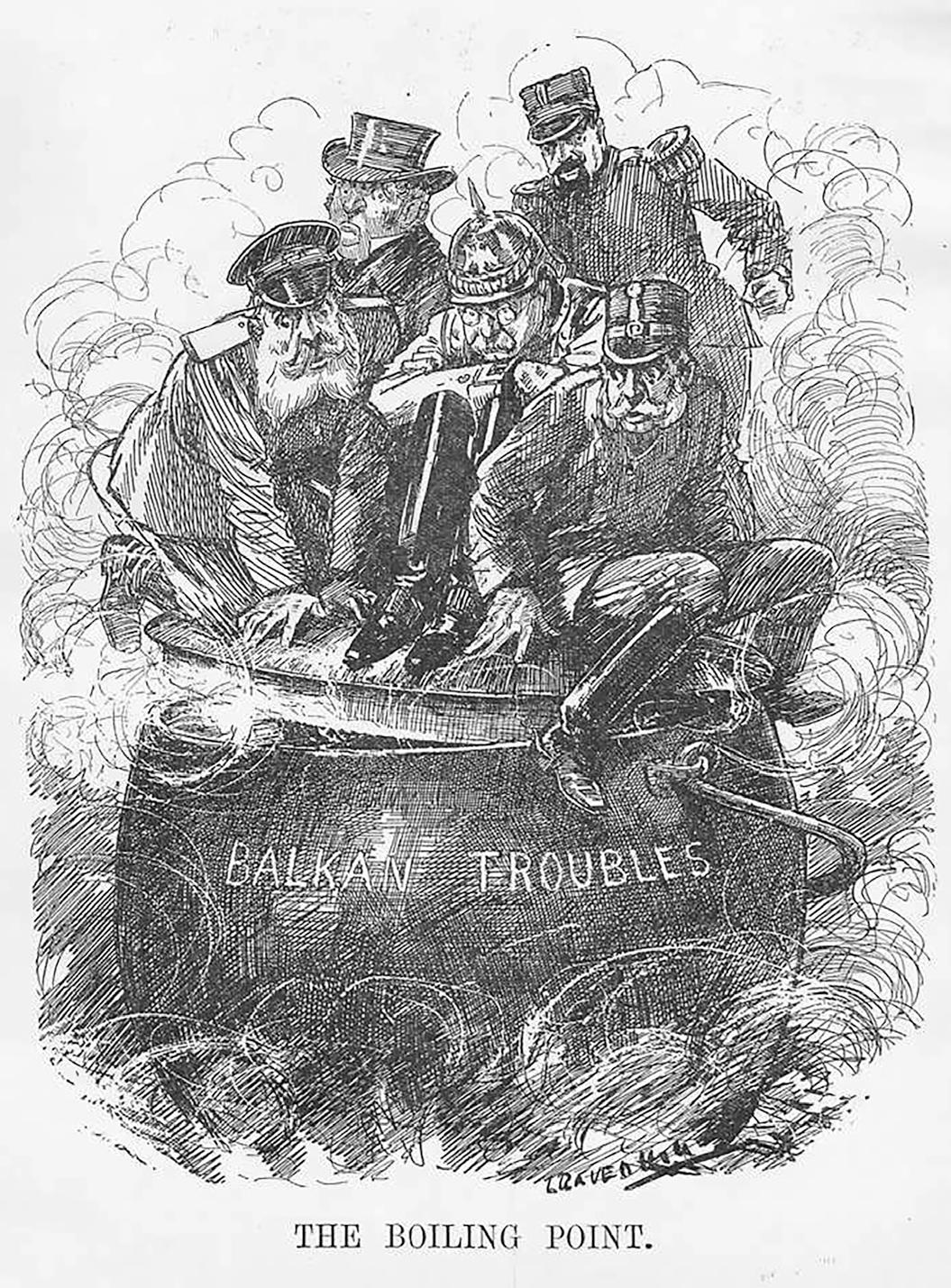
Many a youthful German speaker has been reading Karl May. The first six of many dozens of his volumes of adventure stories recount the travels of one Kara ben Nemsi and his indefatigable servant-companion Hadschi Halef Omar Ben Hadschi Abul Abbas Ibn Hadschi Dawud al Gossarah. (My stepfather could still recite the full name decades after he had read the books.) Their adven tures in the Middle East of the late-19th century ended in the land of the Skipetary, but they had met Skiptars al along the way. Ethnic mixing has been the norm in the Ottoman Empire.
I have pointed to local elites with exposure to the idea of national identity wishing to do away with same ethics mixing before. On the Balkans, the consequences have been murderous, but to this day the idea that peace presumes ethnic homogeneity is alive and kicking. This only adds to the concerns of an EU caught between enlargement fatigue and worrying about Russian and Chinese influ ence in the Western Balkans. At a meeting of EU foreign ministers on 10 May, 2021, EU foreign affairs chief Josep Borrell has com plained about lack of urgency given to the matter10. There is the reluctance of some member states to even consider enlargement. New EU members on the other hand seem keen on yet more of their kind sharing their aspirations of strengthening national identity and what I call ‘territorialism’ (Faludi 2018).
The latest manifestation of this has been a ‘non-paper’ (jar gon for documents easily disowned). It proposed no less than the redrawing, once and for all (all such proposals are for settlements once and for all!) of the Western Balkans map. Rumoured to have come from the president of Slovenia, now edging into the Orbán camp, it seems to have reached its destination Brussels. Dressed up as a solution to the conundrum of Bosnia Herzegovina, the non-pa per is said to propose satisfying the Republika Srpska‘s wish to join Serbia (a candidate for EU membership) and for good measure to also separate lands inhabited by Croatians from those of the Bosniaks within the present State of Bosnia and Herzegovina. Doing so would leave Muslim Bosniaks – descendants of locals having converted to Islam – to remain a bridgehead for old Turkish and new Saudi ambi tions in an area which, formally speaking until 1908 (when its occu pier Austria-Hungary has annexed it) part of the Ottoman Empire.
The non-paper seems to go further, proposing Kosovo and Albania to merge, with areas in North Macedonia inhabited by eth nic Albanians thrown into the bargain. (A short-lived Greater Albania has existed, albeit briefly, as an Italian vassal state during World War
II; see Gooch 2020). Maybe the idea behind it was for Serbia, once it had received Republika Srpska, to swallow its pride and give up Kosovo. This on condition, of course, that Mitrovica be reunited with Serbia, the land swap that has already been mooted – and rejected by the EU – by no less than the former Trump administration.
One can only guess the reasoning behind this, but it is wellknown – to return to the thinking behind the keenness on Western Balkans enlargement of Central and Eastern European EU members — to strengthen, rather than to soften national identities. Maybe they are looking for allies, the likes of Serbia joining. The Commissioner for Neighbourhood and Enlargement overseeing the accession pro cess of prospective new member states and relations with those bordering the European Union, Olivér Várhelyi, has been proposed for the job – as is his right – by Hungarian Prime Minister Orbán.
All this while the Conference on the Future of Europe gets under way, officially as from 9 May, 2021 – Europe Day – in the midst of great uncertainty about what European integration is, and should be.
MAP OF
OF
IN EUROPE, MAP BY JOHN BATHOLOMEW AND CO. EDINBURGH, 1912. PUBLIC DOMAIN. SOURCE: HTTPS://COMMONS.WIKIMEDIA.ORG/WIKI/ FILE:TURKEY_IN_EUROPE_AND_GREECE.JPG
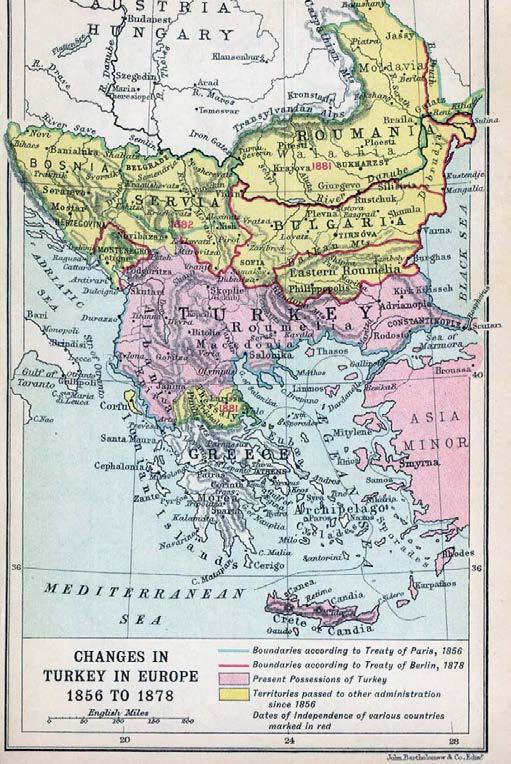
See here an astute comment from Slovenia made at the occasion of the announcement of a ‘mini-Schengen’ embracing EU-hopeful Serbia together with Albania and North Macedonia, the latter two still not admitted even into the waiting room reserved for candidates. Commentators from Bulgaria and Italy agree: a ‘Balkan alliance’ outside the EU is in the making. Blame it on delays in membership negotiations, on broken promises and rampant disillusion. However, the Ljubljana daily Dnevnik argues that the EU itself is splitting up. My own gloss on the matter would be that the EU is pursuing the scenario of a ‘multi-speed Europe’, the one which allegedly had the backing of then Commission President Jean-Claude Juncker12. Indeed, a multi-speed Europe is not only ‘…already a reality, it is also the most promising way for Europe to move forward’, says Jacqueline Sirotová13
Now, suggesting, as it does, an end-state only to be achieved at different dates, a multi-speed EU may still be too optimis tic a scenario. From its vantage point as the linchpin between Central Europe and the Balkans, going under the name of Krain at the time, present-day Slovenia has once been a Crown Land of the Austrian-Hungarian Empire. That was until it joined the Kingdom of the Serbs, Croatians and Slovenes in 1918. Later, Slovenia was the first to split after a brief shooting war. This was during the breakup of what in the meantime had become the post-Tito Yugoslavia14.
Slovenes thus occupy a unique vantage point from where to observe what to Northern Europeans seems a wild, unruly and dangerous part of the world. Even if their governments might appreciate the dangers of the Western Balkan attracting interest from the likes of Russia, China and the former imperial master of the Balkans, Turkey (perhaps with money from the Gulf thrown into the bargain), electorates do not. Which democratic leader looking at his or her prospects of being re-elected dares to say that it is in our best interest to close this hole in the body of the
11
FIRST PUBLISHED 2 SEPTEMBER 2021.
12 HTTPS://WWW.EURACTIV.COM/SECTION/FUTURE-EU/NEWS/JUNCKERS-REAL-SCENA RIO-IS-MULTI-SPEED-EUROPE/ 13 HTTPS://WWW.GLOBSEC.ORG/PUBLICATIONS/IS-EUROPES-FUTURE-MULTI-SPEEDTODAY-SEEMS-LIKE-NOTHING-BUT-SCHENGEN-TYPE-OF-COOPERATION-MATTERS/ WHY IS IT THAT THE NAMES OF SO MANY INTERESTING COMMENTATORS ON MATTERS EUROPEAN SEEM TO SUGGEST THE AUTHORS’ ROOTS TO BE IN A CENTRAL AND EASTERN EUROPE?
14 BORN TO A SLOVENE MOTHER AND A CROATIAN FATHER, JOSIP TITO HAD BEEN THE YOUNGEST SERGEANT MAJOR IN THE AUSTRIAN-HUNGARIAN ARMY.
EU? Many voters seem to think that supporting Schengen and Euroland member Greece has been bad enough, so why let in those hordes?
No way of denying, there are huge, maybe insurmountable differences between us and ‘them’ on the Western Balkans. But we had better heed the other warning of Dnevnik where that Slovene daily points out that the EU itself has begun to split up. It identifies ‘…a Bulgarian-Romanian EU and a German EU. In addition, comprising Poland, the Czech Republic, Slovakia and Hungary, a Visegrád Union has been formed to the west of Serbia. A union with its own values, different from those of Brussels which does not recognise all European laws and courts. ... In the West, the old EU countries are gradually building up their Northern Europe and only think of the South in the holidays.
... The European Union seemed eternal. But then it turned out that it was just as temporary as all other forms of aggregation15.’
Fair enough, but having lasted for a tad more than 1000 years, the Holy Roman Empire is good enough for me as a model to aspire to. Only, the EU would have to be even more tolerant of diversity than it is. And, rather than aspiring to a definite order –as if it were an aspiring state – the EU would have to accept that its position and identity are, and will remain a matter of debate.
Which is why concerning the Western Balkans where nation states have not yet fully crystallised, I have ventured to propose that, rather than putting the remaining states not yet members at the back of the queue until they have become nation-states proper, we should appreciate the Western Balkans as an exper imental field for flexible responses to situations on the ground. I hold that the conclusions of the paper of mine where I posit this still stand: The predominant model of neatly formed nation states with coherent territories, homes each of clearly identifia ble nations ‘…never really fitted the situation in Europe anyway, leading to much needless (and senseless!) conflict, not only in the Western Balkans, but throughout the continent and beyond…’ (Faludi 2020, 23). So why impose this model?
DEPICTION OF EUROPA REGINA ('QUEEN EUROPE') IN 1582, BY HEINRICH BÜNTING - SOURCE: RARE MAPS, HTTPS://COM MONS.WIKIMEDIA.ORG/W/ INDEX.PHP?CURID=18408884
PUBLIC DOMAIN.
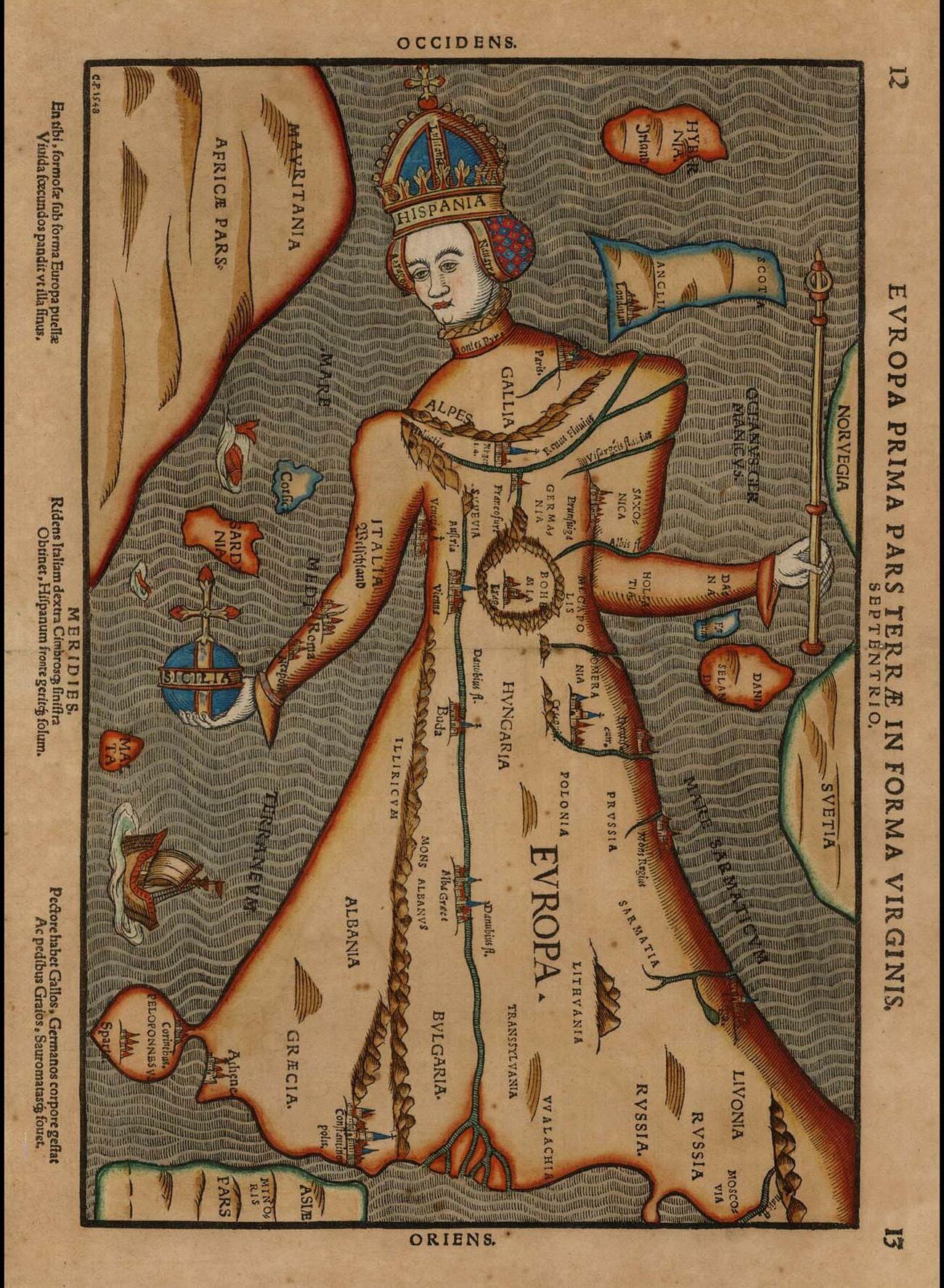
The reader learns about the Western Balkans, but how about Ukraine? So asks one of the review ers looking at the manuscript of this book before it has gone into publication. Well, how about it?
Let me say, nothing in this Postscript can justify Russia – Putin – mounting his ‘special military operation,’ let alone any war crimes alleged to be committed. However, two sources – one German (2022) and one French (Salacs 2022) –remind us that encirclement of Russia is a stated aim of American policy.
I first recall my own experiences during and after World War Two in a Budapest, the siege of which was one of the bloodiest in an already bloody war, and thereafter in post-war Austria divided into four occupation zones.
No, I have not seen Russian soldiers on the rampage. The one and only occasion they were bonking at the door of the shelter which we shared with others we may have been lucky: An elderly man spoke to them in Russian and they left. Later, a Russian sol dier bought me a cake sold by a peasant woman in the heart of war-torn Budapest. But I remember overhearing my mother saying – you don’t share such stories with your young ones – that they were prone to be violent.
We moved to Vienna, first to the American and then the British occupation zone. Even when they were drunk, at least you could talk to their soldiers, my mother once said within my earshot. By that time, common soldiers in the Russian zone were confined to their quarters, so plundering and rape had ended, but the Russians shipped civilians deemed to be hostile to Siberia from where the survivors only returned after the signing of the treaty re-establishing Austria as an independent, but neutral country.
An event I have vivid memories of as a fifteen-year-old, this was greeted with jubilation. Very shortly, an Austrian army seemed to fall from the sky: In their zone of occupation, the Americans had set up an auxiliary, military-style gendarmerie.
I was not totally surprised. At home, we had read the dailies from all sides, so I remembered the Communist paper featuring – as the only one of the lot – pictures of Austrian light tanks on manoeuvre with the Americans. Indeed, the Western powers and above all the Americans pursued a policy of containment of the Soviet Union and, before becoming neutral, Austrian occupation zones of the Western Allies were part of this.
When it came to dealing with the Russian Federation, if only without neutral Austria, containment continued. Emulating British geographer Halford Mackinder having identified the ‘pivot of his tory’ in the interior of Asia, Zbigniew Brzezinski, former adviser to President Johnson, identified Ukraine as being where the battle would be won or lost. Which has never ceased to be the US posi tion. Already quoted, Salacs mentions a 2019 Rand Corporation
Report ‘Overextending and Unbalancing Russia’ saying that sup plying lethal weapons to Ukraine will exploit Russia’s most impor tant zone of external vulnerability. Many hold Putin to be para noid, the same author says, ‘…but phrases like this one are not of the nature of softening his stance.’ (My own translation from the French original)
Needless to say, this does not mean to condone the ‘Mother Russia’ trope justifying the aggression against Ukraine. Apparently, this call of destiny is so strongly felt as to override treaties rec ognising Ukrainian sovereignty within borders that include the Donbas and Crimea. This so much so that Russia declared a ‘state of exception’ Carl Schmitt-style justifying putting such legal nice ties as international law aside.
No more deliberation about balance of power and geo-strat egy. The reviewer mentioned at the beginning may have wanted to prompt me to reflect, neither on America’s nor on Russia’s stance but on Ukraine‘s resistance and what this could mean for my thesis of ‘The Poverty of Territorialism.’ (Faludi 2018) Does the Ukraine invalidate my critique of territorialism and sovereignism? Maybe so, but before continuing I convey impressions gained during two visits.
One such visit took us from Kyiv down the Dnjepr to experi ence magnificent dams and visit a time capsule of what a Stalinist ideal city, Zaporizhzhia (the location also of Europe’s largest nuclear power station now apparently under Russian control) had been like.
There were lonely soldiers guarding the huge locks. I once got up early in the morning and joined fellow-travellers on Deck to experience a drop by 36 meters. Eventually we docked at Kherson and finally ended up at Odessa.
The extremely competent guide, a former Russian correspond ent and author of his moving family history now unfortunately passed away was Alexander Münninghoff. He is the author of the history of his family, including his own, closely interwoven with that of Europe and Russia. (Münninghoff 2014). Having observed him speaking what seemed to be Russian with the locals, when asked, he said that Russian seemed perfectly acceptable. Maybe this was because he was after all a foreigner, but I think the plain truth is that Russian is the second – in many cases the first – lan guage. And why not?
We could no longer do Sevastopol, so this visit must have been well after 2014. For somebody with Austrian-Hungarian roots, the second visit to Lviv – Lwów – Lemberg – was even more revealing.
Salasc (2022) gives an account of the story of the lands now going under Ukraine: Large swathes of it had been part of the Polish-Lithuanian Empire and Catherine the Great had enjoined the Black Sea Coast to Russia. And don’t forget that Ukraine was part of the 20th-century ‘Bloodlands’ (Snyder 2010) where amongst others the Holocaust took place, but also where Stalin had engi neered a famine costing millions of Ukrainian peasants – Kulaks
– their lives, in the process allowing Russians to take their lands, amongst others in the Donbas.
At Lviv, Russian seemed less common, but a language teacher taking us on a tour of confirmed what I had suspected: Polish was close to Ukrainian. Why not? From 1919 to 1939, Poland had called the shots. Even before then, in Austrian Galicia, the Polish upper class had been dominant. (Just north of Lviv is where Jan Sobieski, the Polish King later to command an international coalition lifting the Turkish siege of Vienna in 1683 has been born.)
On the first evening at Lviv I came across a monument to the Western Ukrainian People’s Republic. Later, we visited the Lviv cemetery with the graves of soldiers from a former regiment of the Austrian-Hungarian army, the Sich Riflemen with what used to be called ‘Ruthenian’ recruits. Right opposite were the graves of soldiers from the Polish Legion. They, too, had served before, in their case not in one, but in three different – and opposing –armies in the Great War: German, Austrian-Hungarian and Russian. There was a monument also to the memory of three American flyers, I assume with Polish roots who had paid with their lives for Poland gaining large areas in Western Ukraine. Many of them former comrades in arm, they had slugged it out over control of Western Ukraine.
Ukrainians – and also Belarussians – returned to their previ ous position as the underclass in what became Eastern Poland. This until the Soviet Union made its infamous pact with Nazi Germany in 1939 moving its border west to where it stayed – with an inter ruption after the German attack on the Soviet Union in 1941 until the reconquest of Ukraine by in 1944 – until 1989. Point is, surely, much of what is happening now has its roots in late-19th and early 20th century nationalism. Which was part of the European drive for national liberation, reverberations of which in the Western Balkans have shocked us in the 1990s. They are hitting us again now, and not only in the Western Balkans.
I cannot even begin to unravel the sordid story. Suffice it to say: When still Lemberg, there had already been tensions in the city that, like Vienna (of which it reminds the visitor) had many minorities. In fact, there is still an active Armenian church, and you can taste Georgian food there. But World War One leading to the demise of empires – perhaps wrongly denigrated as ‘prisons of nations’ – had been decisive. The first to go was the Russian Empire. We all know, this led to the formation of the Soviet Union. But are we in the know about what happened in the interim? My best source is the German translation of a book by young Polish historians. (Borodziej, Górny 2018) Having ousted the Tsar, the new Kerensky government mounted another offensive. Meanwhile, much as with the Austrian-Hungarian army, there had been an awakening of nationalism in the Russian one, too. As with the Sich Riflemen in the Austrian, units in the Russian army identified
themselves as Ukrainian. Anyhow, the offensive collapsed, and the Kerensky government was ousted by Lenin, according to the Orthodox calendar in October, hence ‘October Revolution’.
Here comes a kernel of truth in Putin’s story: to preserve his hold on power, Lenin did give away Ukraine, mainly to the Germans who shared their profit with the Austrians and Romanians. This was when huge areas (including what are now the Baltic States) were given away. The, mainly German, military administration’s hold on the lands was tenuous. The strategic objective was to get access to Ukraine, then – and now! – Europe’s food basket. Details elude me, but already then, attempts to form what amounted to a Ukrainian puppet regime were under way. Eventually, a Ukrainian army was sucked into the maelstrom of the Polish-Soviet war, another complicated story told by Norman Davies (1972) later to become famous for writing about Europe (Davies 1996) from his unique perspective informed by knowledge of Central and Eastern Europe and more in particular Poland.
So, as with so many other countries, Ukraine has a chequered history. That it is home of a distinct, historic people, is a myth. Much as with territories, nations, too, are constructs. The irony is, though, that Putin may be bringing Ukraine closer to resembling the myth. So, if and when Ukraine gets closer to the EU, what will be its stance? Member states having joined after the collapse of the Soviet Union, some more, and some less, wish above all to preserve their national identity. They do not buy ‘The Poverty of Territorialism’ as per my book and my writings since, including this volume. As always, the future remains open.
Borodziej, W., Górny, M. (2018) Der vergessene Weltkrieg: Nationen 1917-1923, Wissenschaftliche Buchgesellschaft, Darmstadt.
Faludi, A. (2018) The Poverty of Territorialism: Towards a Neo-medieval View of Europe and of European Planning, Edgar Elgar, Cheltenham.
Davies, N. (1972) White Eagle, Red Star: The Polish-Soviet War 191920, Vintage Books, London.
Davies, N. (1996) Europe: A History, Oxford University Press, Oxford. Dohanyi, K. van (2022) Nationale Interessen: Orientierung für deutsche und europäische Politik in Zeiten globaler Umbrüche, Siedler, München.
Münninghoff, A. (2014) De stamhouder, een familiekroniek, Prometheus, Amsterdam
Salacs, J.-L. (2022) ‘Les quarter circles du conflict’, L'Émissaire: L'actualité commentée à l'aide de la pensée de René Girard et la théorie mimétique, available at: https://wp.me/p88OkM-Xu.
Snyder, Th. D. (2010) Bloodlands: Europe Between Hitler and Stalin, Basic Books, New York.
THE STELE REPRESENTING THE WAVE OF NATIONAL REVIVAL AT THE MONUMENT TO TARAS SHEVCHENKO ON PROSPEKT SVO BODY IN LVIV. IN CELEBRATION OF THE REBIRTH OF THEIR COUNTRY OF ORIGIN, UKRAINIAN IMMIGRANTS TO ARGENTINA DONATED THIS COLOSSAL MONUMENT TO THE CITY OF LVIV. THE SCULPTORS: ANDRIY AND VOLODYMYR SUKHORSKI, THE ARCHITECTS: YURIY DYBA AND YURIY KROMEY. THE STELE IS A LATER ADDITION OF 1996. PICTURE BY VIBEKE KUENEN-BOUMEESTER (DELFT). PRINTED WITH PERMISSION.
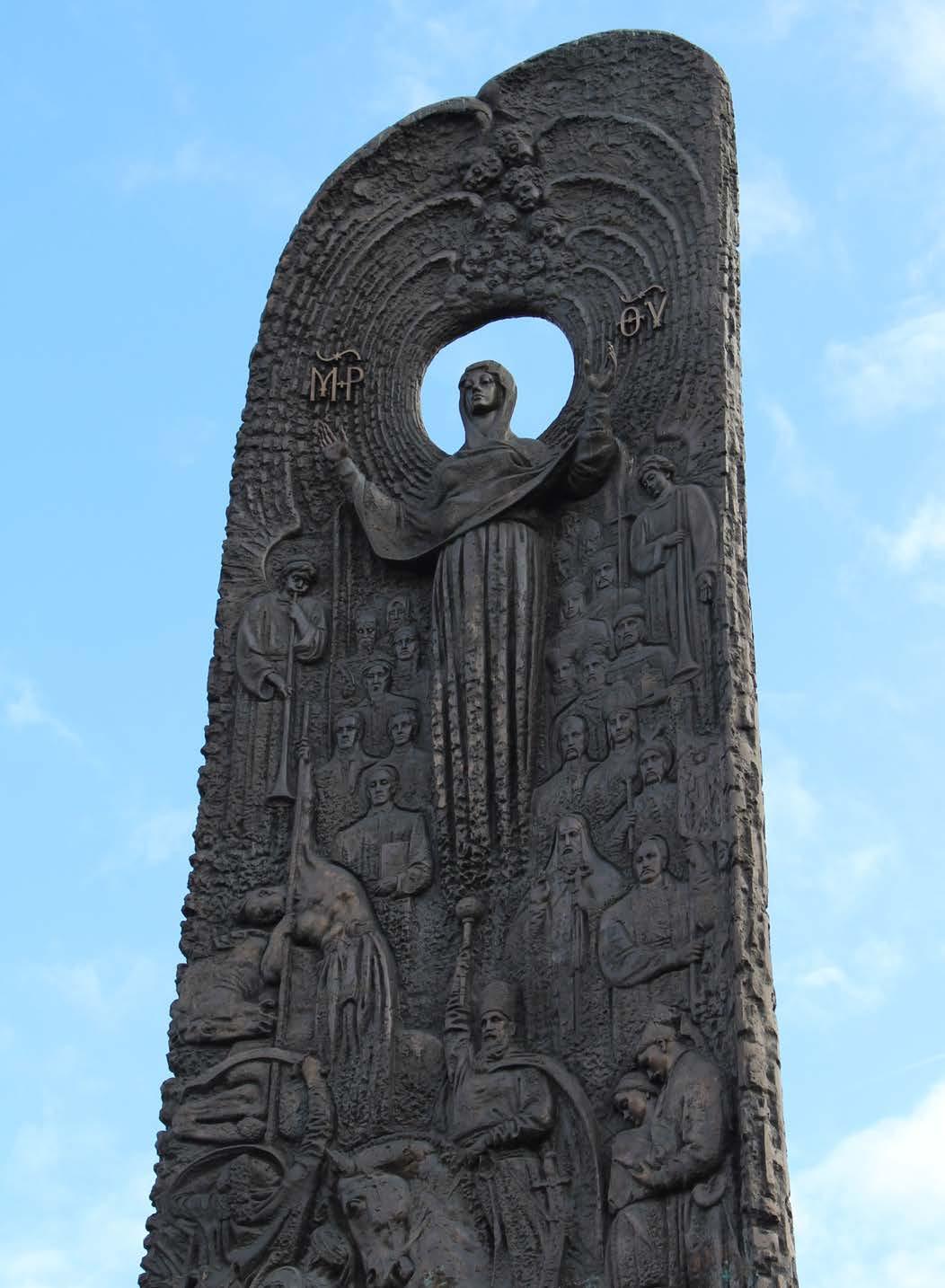
Agnew, J. (1994) 'The territorial trap: The geographical assump tions of international relations theory, Review of International Political Economy, 1(1), 53-80.
Agnew, J. (2020) ‘The contingency of sovereignty’, in: Storey, D. (Ed) Edgar Elgar, Cheltenham, 43-60.
Alexander, E.A., Faludi, A. (1996) ‘Planning doctrine: Its uses and implications’, Planning Theory, 16, 11-61.
Albert, H. (2nd edition 1975) Konstruktion und Kritik: Aufsätze zur Philosophie des Kritischen Rationalismus, Hoffman und Campe, Hamburg.
Anderson, B. (2006, [1983]) Imagined Communities (Revised 3rd edition) Verso, London, New York.
Ash, T.G. (2004) Free World: Why the Crisis of the West Reveals the Opportunity of the Time, Penguin Press, London.
Badie, B. (1995), La fin des territoires. Fayard, Paris.
Badie, Bertrand (2018) Quand le Sud réinvente le monde: Essai sur la puissance de la faiblesse. La Découverte, Paris.
Balibar, E. (2009) ‘Europe as borderland’, Environment and Planning D: Planning and Society, 27, 190-2015.
Barnes, T.J., Minca, Cl. (2013) ‘Nazi spatial theory: The dark geo graphies of Carl Schmitt and Walter Christaller, Annals of the Association of American Geographers , 103(3) 669-687.
Bauböck, R. (2005) ‘Political autonomy or cultural minority rights?’, chapter. 6 in: Nimni, E. (Ed) National-cultural Autonomy and its Contemporary Critics, Routledge, London.
Berisha (2018) ‘The evolution of spatial planning systems in the Western Balkan Region: Between international influences and domestic actors’, PhD, Politecnico di Torino, Turin.
Blatter, J.(2019).Kick-off contribution. Let me vote in your coun try, and I let you vote in mine. A proposal for transnational democracy. In: J. Blatter, R. Bauböck (Eds.) EUI working paper RSCAS 2019/25, Florence: European University Institute, Robert Schuman Centre for Advanced Studies, 1-6.
Blatter, J., Bauböck, R. (Eds) (2019) Let me vote in your country, and l let you vote in mine. A proposal for transnational democracy, EUI Working Paper RSCAS 2019/25, Robert Schuman Centre for Advanced Studies Global Governance Programme.
Boffey, D. (2019) ‘Majority of Europeans expect end of EU within 20 years’, The Guardian. Available at: https://www.the guardian.com/world/2019/may/15/majority-of-euro peans-expect-end-of-eu-within-20-years.
Borrel J. (2021) EU should prepare for the next crises. Available at: https://www.euractiv.com/section/global-europe/ news/borrell-eu-should-prepare-for-the-next-crises -iraq-sahel/?utm_source=piano&utm_medium=emai
l&utm_campaign=9707&pnespid=0uJo9OJUWlaNxiTs
JVHnZuS5MJ49OQO7uA8Dj13YBw (Last accessed 21 December 2021)
Borodziej, W., Górny, M. (2018) Der vergessene Weltkrieg: Imperien 1912–1916, wgb (Wissenschaftliche Buchgesellschaft), Darmstadt. (Aus dem polnischen von Bernhard Hartmann).
Braun, M. (2021) The Politics of Regional Cooperation and the Impact on the European Union, Edgar Elgar, Cheltenham. Budina, K., Kain Hart, L. (2010) ‘Northern Epiros: The Greek Minority in Southern Albania’, Cultural Survival Quarterly, 19(2). (Available at: https://www.cultural survival.org/publications/cultural-survival-quarterly/ northern-epiros-greek-minority-southern-albania) Cardoso, R. V. (2018): Book review: The Poverty of Territorialism. In: Planning Theory and Practice 20, 4, 622-624. Coatleven, L., Hublet, F., Rospars, Th. (2020) Covid-19 et ges tion de crise subsidiaire. Perspectives transfrontalières à la lumière du fédéralisme allemand, Groupe d’étu des géopolitiques, Rapport. Available at: Coatleven, L., Hublet, F., Rospars, Th. (2020) Covid-19 et gestion de crise subsidiaire. Perspectives transfrontalières à la lumière du fédéralisme allemand, Groupe d’études géo politiques, Rapport. Available at: https://legrandcontinent. eu/fr/2020/12/07/gestion-de-crise-subsidiaire/. (Last accessed: 04012022) For English see: Subsidiary Crisis Management in the COVID-19 Pandemic: Germany’s Federalist Experiment in Transporder Perspective: For English see: Subsidiary Crisis Management in the COVID-19 Pandemic: Germany’s Federalist Experiment in Transporder Perspective: https://legrandcontinent.eu/ fr/evenements/subsidiary-crisis-management-in-the-co vid-19-pandemic/. (Last accessed: 04012022)
Cotella, G.; Purkarthofer, E.; Faludi, A. (2020): Symposium: The poverty of territorialism and the future of European spa tial integration. In: Regional Studies, 54(7), 999-1003.
Crichton, M. (2004) State of Fear, Avon Books, London.
Cohen, A. (2012) De Vichy á la Communauté Européenne, Presses Universitaires de France, Paris.
Cooper (2021) The Ambassadors: Thinking about Diplomacy from Machiavelli to Modern Times, Weidenfeld & Nicholson, London.
Davies, N. (2004) Rising ‘44: The Battle for Warsaw, Macmillan, London.
Debeuf, K. (2018) Tribalization: Why War is Coming, Academic and Scientific Publishers, Brussels.
Djaïz, D. (2019) Slow démocratie : comment maîtriser la mondia lisation et reprendre notre destin en main, Allary, Paris.
Djaïz, D. (2020) Coronavirus - La mondialisation malade de ses
crises, Le Grand Continent, 23 March.
Dijkstra, L., Poelman, H., Rodríguez-Pose, A. (2019): The geogra phy of EU discontent, Regional Studies, 54(6) 737-753.
D’Orazio (2019) ‘Semestrale di Studi e Ricerche di Geografia’ 21(2, 207-209).
Duchêne, F. (1994) Jean Monnet: The First Statesman of Interdependence, W.W.Norton & Company, New York, London.
Dühr, S., Belof, M. (2020) ‘Social learning in transnational spatial planning processes: An analysis of the ‘V4+2’ cooperation on spatial development’, Planning Practice & Research, 35(2) 148-168.
Dühr, S., Zonneveld, W. (2012) ‘Images of Europe, images for Europe’, in: W. Zonneveld, J. De Vries, L. JanssenJansen (eds) European Territorial Governance, IOS Press, Amsterdam, 281-316.
Eichenberger, R, Frey, B.S. (2006) ‘Functional overlapping and competing jurisdictions (FOIC): A complement and alter native to today’s federalism’, in: E. Ahmad, G. Brosssio (eds) Handbook of Fiscal Federalism, Edward Elgar, Cheltenham UK, 154-181.
Engl, A., Evrard, E. (2019) ‘Agenda-setting dynamics in the Post2020 Cohesion Policy Reform: The pathway towards the European Cross-Border Mechanism as possible policy change’, Journal of European Integration (7): 1–19.
ESPON (2019) A Territorial Reference Framework for Europe (Synthesis Report) Available at: at: https://www.espon. eu/sites/default/files/attachments/ESPON_ETRF_Final_ Report_Synthesis_Report.pdf (Last accessed 17 December 2021)
European Commission (2021) Rule of Law Report. Available at: https://ec.europa.eu/info/policies/justice-and-fundamen tal-rights/upholding-rule-law/rule-law/rule-law-mecha nism/2021-rule-law-report_en#:~:text=The%202021%20 Rule%20of%20Law%20Report%2C%20including%20 its%2027%20country,related%20to%20checks%20 and%20balances. (Last accessed: 13 December 2021.)
Evans, R. (2014) Altered Pasts: Counterfactuals in History, Little Brown, London.
Evrard, E. (2020) ‘Comment le droit européen déplace les fron tières ? La proposition de règlement visant à lever les obstacles juridiques et administratifs à la coopération transfrontalière‘, in L. Bony, M. Mellac (eds.) Le droit : ses espaces et ses échelles (Special Issue) Annales de Géographie, No 733-734.
Evrard, E. (2021) ‘Reading European borderlands under the pers pective of legal geography and spatial justice’, European Planning Studies, https://doi.org/10.1080/09654313.20
21.1928044. (Last accessed 21 December 2021)
Fabbrini, S. (2019) ‘Europe’s Future: Decoupling and Reforming’, Cambridge University Press, Cambridge.
Faludi, A. (1978 [1973]) Planning Theory, Pergamon, Oxford.
Faludi, A. (1986) Critical Rationalism and Planning Methodology, Pion, London.
Faludi, A. (1987) A Decision-centred View of Planning, Pergamon, Oxford.
Faludi, A. (1998) ‘From planning theory mark 1 to planning theory mark 3’, Environment and Planning B: Planning and Design Anniversary Issue, 110-117.
Faludi, A. (2013) 'Territorial cohesion, territorialism, territoriality, and soft planning: A critical review', Environment and Planning A, 45(6), 1302-1317.
Faludi, A. (2014) 'Europe 2000: A pioneering work', in: M. TewdwrJones, N.A. Phelps, and R. Freestone (Eds.) (2014), The Planning Imagination: Peter Hall and the Study of Urban and Regional Planning, Routledge, London, 240-251.
Faludi, A. (2016) 'The territoriality of EU Cohesion Policy', in: S. Piattoni, L. Polverari (Eds.), Handbook on Cohesion Policy in the EU, Edward Elgar, Cheltenham UK, Northampton, MA, USA, 491-505.
Faludi, A. (2018) The Poverty of Territorialism, A Neo-medieval View of Europe and European Planning (Elgar Studies in Planning Theory, Policy and Practice), Edgar Elgar Publishing, Cheltenham, UK and Northampton, MA, USA.
Faludi, A. (2018a) 'Cross-border cooperation: Subverting sove reignty?', in: J.W. Scott (ed.) Cross-Border Review Year Book 2018, Central-European Service for Cross-Border Initiatives, Budapest, 7-29.
Faludi, A. (2018b) ‘Beyond territorialism: Europe as an archipe lago’, CIST2018 proceedings: Représenter les territoires // Representing territories, https://hal.archives-ouvertes. fr/hal-01854529/document. (Last accessed 28122021)
Faludi, A. (2019) ‘New horizons: Beyond Territorialism’, Europa XXI, 36, 35-44. Available at: https://europa21.igipz.pan. pl/volume/item/36_.html. (Last accessed 110120220
Faludi, A. (2019a) 'Au-delá du territorialism: la métaphore de l'archipel', in: S. Brunet, L. Lebon, Yann, R. (eds.) Les dossiers des Annales de Droit, Prolifération des terri toires et représentatons territoriales de l'Union euro péenne, Presses Universitaires de Rouen et du Havre, Mont-Saint-Aignan,161-174.
Faludi, A. (2020a) ‘Policy debate: Government and governance on the Western Balkans’, Journal of Western Balkan Network on Territorial Governance: Annual Review of Territorial Governance in the Western Balkans, II, 2020, 19-23. ISSN 2707-9384.
Faludi, A. (2020b) European Spatial Planning Beyond Sovereignty. Transactions of the Association of European Schools of Planning, 4(2), 99-110. Available at: https://doi. org/10.24306/TrAESOP.2020.02.002 (Last accessed 15 December 2021)
Faludi, A. (2021a) ‘Revisiting the European Spatial Development Perspective’, eds. M. Neuman, W. Zonneveld, The Routledge Handbook of Regional Design, Routledge, London, 33-47.
Faludi, A. (2021b) Declaration of Interdependence (Debates and Reflections) Planning Theory & Practice, Published online 08 Oct, https://doi.org/10.1080/14649357.2021.1981 661 (Last accesses 5 December 2021)
Faludi, A., Waterhout, B. (2002) The Making of the European Spatial Development Perspective: Routledge, London.
Fassman H, Rauhut, D. Marques da Costa, E., Humer, A. (Eds.) (2015) Services of General Interest and Territorial Cohesion: European Perspectives and National Insights, Vienna University Press, Vienna.
Ferguson, N. (2021) Doom: The Politics of Catastrophe, Penguin, London.
Ferry, J.-M. (2020) Comment peut-on être européen ? Éléments pour une philosophie de l’Europe. Calmann-Lévy, Paris.
Frey, B. S., & Eichenberger, R. (1999).The New Democratic Federalism for Europe: Functional, Overlapping and Competing Jurisdictions. Edgar Elgar, Cheltenham.
Friedrich, C.J. (1957) Totalitäre Diktatur, W. Kohlhammer Verlag, Stuttgart.
Friend, J.K., Jessop, W.N. (1977; 1st.edition 1969) *Local Government and Strategic Choice*, Pergamon, Oxford.
Furedi, F. (2018) Populism and the European Culture Wars, Routledge, London.
Furedi, G. (2021) Why Borders Matter, Routledge, London.
Gallo, M. (1998) De Gaulle 2: La solitude du combattant, Rober Lafont, Paris.
Giacometti, A., Meijer, M.W. (2021) Closed border and divided communities: Status report and lessons from Covid-19 in cross-border areas, Nordregio Report, Stokholm. Available at: http://pub.nordregio.org/r-2021-6-crossborder-co vid/# (Last accessed 10 January 2022)
Godehardt, N., Kohlenberg, P. J. (2020) ‘China’s global connectivity politics: A meta-geography in the making’, in: Kohlenberg, P.J., Godehardt, N. (eds) The Multidimensionality of Regions in World Politics, Routledge, London, 191-214.
Gotev, G. (2021) ‘The enlargement train stops at Brdo,’ EuroActive. (Available at: https://www.euractiv.com/section/enlarge ment/opinion/the-brief-powered-by-the-greens-efa -the-enlargement-train-stops-at-brdo/?utm_source=
piano&utm_medium=email&utm_campaign=14147&p nespid=7rh2CyhOMLlHxP7ApzqpDM6WpwytS4kq MePs3vp0vABmWMK54mHLvgdfrTpqctpWX.9RUNu pPQ (Last accessed 8 December 2021)
Gougou, F., Persico, S. (2020) Décider ensemble: La convention citoyenne pour le climat et le défi démocratique. Available at: https://laviedesidees.fr/Decider-ensemble.html.Last Accessed 271221
Gruyter, C. de (2021) Beter wordt het niet: Een reis door de Europese Unie en hat Habsburgse Rijk, De Geus, Amsterdam.
Gruyter, C. de (2021a) Werd in Oostenrijk echt 1,2 miljoen euro belastingsgeld gebruikt om burgers met fake news to foppen? NRC, 8 October.
Guérot, U. (2019) Why Europe Should Become a Republic: A Political Utopia (translated from German edition), J.H.W. Dietz, Bonn.
Gyelnik, T. (2019 ‘Andreas Faludi (2018): The Poverty of Territorialism: a Neo-Medieval View of Europe and European Planning, Edward Elgar Publishing’, in: CrossBorder Review, J.W. Scott, (Ed.) Central European Service for Cross-border Initiatives (CESCI), Budapest, 171-178.
Gyelnik, T. (2020) Review of ‘Why Borders Matter’, in: CrossBorder Review, J.W. Scott, J.W. (Ed.) Central European Service for Cross-border Initiatives (CESCI), Budapest, 143-148.
Gyelnik, T., Ocskay, Gy. (2021) ’Systems error: Reflections on the permanent failure of territoriality in the European cohe sion policy, EUROPA XXI, 39, 5-25. Available at: https:// doi.org/10.7163/Eu21.2020.39.7 Last Accessed 160122. Hall, P. (Ed) (1977) Europe 2000, Duckworth, London. Hardt, M., Negri, A. (2000) Empire, Harvard University Press, Cambridge MA. Hastings, Ch. (2016) Mail on Sunday. Available at: https://www. dailymail.co.uk/debate/article-3478563/I-m-Downton -TV-writer-Julian-Fellowes-claims-EU-like-Austro-Hunga rian-empire-look-ended.html Last accessed: 13 December 2021.
Hoeksma, J. (2020) The Case Bundesvefassungsgericht versus EU Court of Justice: Can the EU function as a democracy without forming a State? Available at: https://www.wol fpublishers.eu/_downloads/51433248. (Last accessed 26 January 2021.
Humer (2020) ‘Book Review: Faludi, Andreas (2018): The Poverty of Territorialism. A Neo-Medieval View of Europe and European Planning Cheltenham: Edward Elgar Publishing. 179 Seiten’ Raumforschung und Raumordnung - Spatial Research and Planning, 78(5): 1–3.
Hwang, H., Höllerer, H. (2020) ‘The COVID-19 crisis and Its con sequences: Ruptures and transformations in the global institutional fabric. The Journal of Applied Behavioral Science 2020, Vol. 56(3).
Jainchill, A., Moyn, S. (2004) ‘French democracy between tota litarianism and solidarity: Pierre Rosanvallon and revi sionist historiography’, The Journal of Modern History, 76 (1) 107–154.
Jessop, B. (2018) ‘The TPSN schematic: moving beyond territo ries and regions’ in: A. Paasi, J. Harrison, M. Jones (eds.) Handbook on the Geographies of Regions and Territories, Edgar Elgar, Cheltenham, UK, Northampton, MA, USA, 89-101.
Kahn, S. (2014) 'The nation-state as a territorial myth of European construction', Espace géographique, 43(3), 240-250.
Kahn, S., Richard, Y. (2020) ‘Unthought and unrepresentable? The European territorial paradox’, European Journal of Geography, 11(1), 124 – 139. Available at: https://doi. org/10.48088/ejg.s.kah.11.1.124.139 Last accessed 27122021
Kann, R.A. (1951) ‘Karl Renner (December 14, 1870-December 31, 1950)’, The Journal of Modern History, 23(3) 243-249.
Khanna, P. (2011) How to Run the World. Charting the Course to the Next Renaissance, Random House, New York.
Keane, J. (2018) Power and Humility: The Future of Monitory Democracy, Cambridge University Press, Cambridge.
Keating, M. (2009) ’Rescaling Europe’, Perspectives on European Politics and Society, 10(1) 34-50.
Keating, M. (2019) ‘Brexit and the nation’, The Political Science Quarterly, 40(52), 167-176.
Kiesewetter, H., Lenz, H. (eds.) (2002) Karl Popper’s Beiträge zur Ethik, Mohr Siebeck, Tübingen.
Kirchick, J. (2017) The End of Europe: Dictators, Demagogues, and the Coming Dark Age, Yale University Press, New Haven, London.
Kogon, E. (1946) Der SS Staat: Das System der Deutschen Konzentrationslager, Europäische Verlagsanstalt, Frankfurt a.M.
Krastev, I. (2017) After Europe, University of Pennsylvania Press, Philadelphia.
Kübler, A. (2007) Chronik Bau und Raum: Geschichte und Vorgeschichte des Bundesamtes für Bauwesen und Raumordnung, Wasmuth & Zohlen, Tübingen
Labbé, M. (2018) ‘Eugene Romer’s 1916 Atlas of Poland: Creating a new nation state, Imago Mundi, 70:1, 94-113.
Leron, N. (2021) L’épiphanie cosmopolitique: À propos de : Jean-Marc Ferry, Comment peut-on être européen ? Éléments pour une philosophie de l’Europe. https://
laviedesidees.fr/L-epiphanie-cosmopolitique.html Last Accessed 27122021
Loriaux, M. (2008) European Union and the Deconstruction of the Rhineland Frontier, Cambridge University Press, Cambridge.
Mäding, H., Strubelt, W. (Eds.) (2008) Vom Dritten Reich zur Bundesrepublik: Beiträge einer Tagung zur Geschichte von Raumforschung und Raumplanung. Akademie für Raumforschung und Landesplanung – Bundesamt für Bauwesen und Raumordnung, Hanover.
Mälksoo, M. (2019) ‘The normative threat of subtle subversion: The return of “Eastern Europe” as an ontological security Thorpe’, Cambridge Review of International Affairs, 32(3), 265-383.
Mau St. (2021): Sortiermaschinen. Die Neuerfindung der Grenze im 21. Jahrhundert., C.H. Beck, München.
MacMillan, M. (2001) Paris 1919: Six Months that Changed the World, Random House, New York, NY.
McPherson, J.M. (1988) Battle Cry for Freedom: The Civil War Era, Ballantine Books, New York.
Medeiros, E. (ed) (2018): European Territorial Cooperation. Theoretical and Empirical Approaches to the Process and Impacts of Cross-Border and Transnational Cooperation in Europe. Springer. Cham, Medeiros, E. (2019): Book Review: The Poverty of Territorialism. In: Planning Theory and Practice 20, 4, 619-624.
Meek, J. (2020) London Review of Books Blog. See: https://www. lrb.co.uk/blog/2020/march/worldwide. (Last accessed 04012022)
Metzger, J. (2019): Book review: The Poverty of Territorialism: A Neo-Medieval View of Europe and European Planning. In: Planning Theory. Meyerson, M., Banfield, E.C. (1955) Politics, Planning and the Public Interest, Free Press, Glencoe Ill.
Minca, C., Vaughan-Williams, N. (2012) ’Carl Schmitt and the concept of the border’, Geopolitics, 17, 752-772.
Monnet, J. (1976) Mémoires, Fayard, Paris.
Müller, J.-W. (2006) ‘Julien Benda’s anti-passionate Europe’, European Journal of Political Theory, 5(2), 125-137.
Müller, J.W. (2017) What is Populism? - With a New Afterword, Penguin Press, London.
Murphy, A.J. (2020) ‘The history and persistence of territory’, in: Storey, D. (Ed) A Research Agenda for territory and Territoriality, Edgar Elgar, Cheltenham, 43-60.
Neuman, M. (2020): Book review: The poverty of territorialism: neo-medieval view of Europe and European planning. In: European Planning Studies 28, 4, 850-852.
Nimni, E. (Ed) (2015) National-cultural Autonomy and its
Contemporary Critics, Routledge, London.
Obama, B. (2020) A Promised Land, Crown Publishing Group, New York.
Oberhummer, E. (1918) 'Montenegro und Albanien unter öster reichisch-ungarischer Verwaltung', Mitteilungen der K.K. Geografischen Gesellschaft in Wien, 61, 7, 31346.
Ocskay, G. (2019), Review of: Eduardo Medeiros (ed) (2018): European Territorial Cooperation. Theoretical and Empirical Approaches to the Process and Impacts of Cross-Border and Transnational Cooperation in Europe, in: Scott, J. W. (ed.) Cross-Border Review, European Institute of Cross-Border Studies - Central European Service for Cross-border Initiatives (CESCI), Budapest, 179-186.
Peŝalj, J. (2019) Monitoring Migration: The Habsburg-Ottoman Border in the Eighteenth Century, PhD., University of Leiden, Leiden.
Peyrony, J. (2021) ‘Grand format - Sortir du territorialisme: une vision de l’Europe et de son aménagement’, L’espace Géographique, …
Piattoni, S., Schönlau, J. (2015). ’Towards a multilevel European democracy’, in:Shaping EU Policy From Below: EU Democracy and the Committee of the Regions, Edgar Elgar, Cheltenham, 7-31. Roberts, A. (2014) Napoleon the Great: A Life, Penguin, London.
Piris, J.-C. (2012) The Future of Europe: Towards a Two-Speed EU? Cambridge University Press, Cambridge.
Popescu, G. (2008) 'The conflicting logics of cross-border reterri torialization: Geopolitics of Euregions in Eastern Europe', Political Geography, 27, 418-438.
Popescu, G. (2012) Bordering and Ordering in the Twenty-first Century: Understanding Borders, Rowman Littlefield, Lanham - Boulder - New York - Toronto - Plymoth UK.
Pressman, J.L. and Wildavsky, A. (1973) Implementation: How Great Expectations in Washington are Dashed in Oakland, University of California Press, Berkeley, CA.
Remark, E.M. (1929) All Quiet on the Western Front, Little, Brown and Company, New York.
Renner, K. (1964) Die Nation: Mythos und Wirklichkeit, Manuskript aus dem Nachlaß. Herausgegeben von Jacques Hannah, Europa Verlag, Wien 1964.
Reybrouck, D. Van (2016) Against Elections: The Case for Democracy, Bodley Head, London.
Richard, Y. (2021) ‘Faludi Andreas: The Poverty of Territorialism. A Neo-Medieval View of Europe and European Planning’, Annales de Géographie, No 739/740
Rodríguez-Pose, A. (2018). The revenge of the places that don’t matter (and what to do about it). Cambridge Journal of Regions, Economy and Society, 11(1), 189–209.
Rogan, E. (2014) The Fall of the Ottomans, Penguin, London.
Rosanvallon P. (1998) Le peuple introuvable, Histoire de la repré sentation démocratique en France, Gallimard, Paris.
Rosanvallon, P. (2008) La légitimité démocratique: Impartialité, réflexivité, proximité, Éditions du Seuil, Paris. (English: Democratic Legitimacy: Impartiality, Reflexivity, Proximity, Princeton University Press, 2011)
Rosanvallon, P. (2015) Le bon gouvernement, Édition du Seuil, Paris. (English: Good Government: Democracy beyond Elections, Harvard University Press, 2018)
Rosanvallon, P. (2018) Good government: democracy beyond elections, Harvard University Press, Cambridge MA.
Rosanvallon, P. (2020) Le siècle du populisme: Histoire, théorie, critique, éditions du seuil; Paris.
Sack, R.D. (1986) Human Territoriality: Its Theory and History, Cambridge University Press, Cambridge.
Sánchez Nicolás, E. (2021) ‘MEPs win battle for bigger citizen’s voice at Conference'. Available at: https://euobserver.com/ democracy/151802. Last accessed: 13 December 2021.
Sayarer, J. (2021) ‘Turkey’s borders’, London Review of Books, 21 August.
Scheer. T. (2020) Language Diversity and Loyalty in the Habsburg Army, 1868-1918. Available at: https://www.academia. edu/44915028/Language_Diversity_and_Loyalty_in_ the_Habsburg_Army_1868_1918_Habilitation_Thesis_ (Last accessed 110122)
Scheuplein, Ch. (2009) ‘Wirtschaftliches Maximum, völkis ches Optimun: Raumwirtschaftstheorie und -politiek bei Andreas Predöhl’, in: H. Mäding, W. Strubelt (Hsg.) Vom Dritten Reich zur Bundesrepublik, Akademie für Raumforschung und Landesplanung, Hannover, 84-105. Schönlau, J., Piattoni, S. (2015) Towards a multilevel European democracy, in: Shaping EU Policy from Below: EU Democracy and the Committee of the Regions, Edgar Elgar, Cheltenham, 7-31
Scholte, J. (2000) Globalization: A Critical Introduction, Palgrave, Basingstoke.
Shachar, A. (2020) The shifting border: Legal cartographies of migration and mobility, Manchester University Press, Manchester.
Sheikh, H. (2011) Embedding Technopolis, PhD Thesis, Vrije Universiteit Amsterdam. Available at: https://research. vu.nl/en/publications/embedding-technopolis-moder nity-amp-tradition-in-the-human-condit, last accessed 23 August 2020.
Shirer, W.J. (1960) The Rise and Fall of the Third Reich: A History of Nazi Germany, Simon and Schuster, New York.
Smeltzer. J. (2018) ’“Germany’s salvation”: Carl Schmitt’s
teleological history of the Second Reich’. History of European Ideas, 44(5) 590–604.
Smith, A. (2000) The Nation in History: Historiogeographical Debates about Ethnicity and Nationalism, University Press of New England, New Haven.
Stein, H. (2014) Der Komet, Galiani, Berlin.
Storey D. (2020) ‘Territory and territoriality: Retrospect and prospect’, in: Storey, D. (Ed) A Research Agenda for ter ritory and Territoriality, Edgar Elgar, Cheltenham, 1-24.
Strong, G.V. (1992) ‘Review of: The Habsburg Legacy: National Identity in Historical Perspective, Austrian Studies
Territorial Agenda (2007) Territorial Agenda of the European Union: Towards a More Competitive and Sustainable Europe of Diverse Regions. Agreed on the occasion of the Informal Ministerial Meeting on Urban Development and Territorial Cohesion in Leipzig on 24 / 25 May 2007. Available at: https://ec.europa.eu/regional_policy/en/ information/publications/communications/2007/terri torial-agenda-of-the-european-union-towards-a-more -competitive-and-sustainable-europe-of-diverse-regions (Last accessed 15 December 2021)
Territorial Agenda 2030 (2020) Territorial Agenda 2030 : A Future for all Places. Available at: https://territorialagenda.eu/. (Last accessed 15 December 2021)
Thiesse, A.-M. (1999) La Création des identités nationales, Édition Seuil, Paris.
Timsit, A. (2019) ‘The European Union’s future members are losing patience’, Quartz, 13 May. Available at: https://qz. com/1610705/western-balkan-nations-are-tired-of-wai ting-to-join-the-eu/ (Last accessed: 8 December 2021)
Varga, J. (2021) ‘Blurred lines - the case of the 'political EU Commission'. Available at: https://euobserver.com/opi nion/152601utm_source=euobs&utm_medium=email. Last accessed: 13 December 2021.
Vink, J. (1966) ‘Niederlande’, Akademie für Raumforschung und Landesplanung, Handwörterbuch der Raumforschung und Raumordnung, Gebrüder Jänecke Verlag, Hannover, 1203-1219.
Wassenberg B. (2020) ’”Return of Mental Borders”: A Diary of COVID-19 Closures between Kehl, Germany, and Strasbourg, France’, Borders in Globalization Review, 2(1) 114-120.
Wassenberg, B., Reitel, B. in collaboration with Peyrony, J., Rubio, J. (Eds.) (2020) Critical Dictionary on Borders, CrossBorder Cooperation and European Integration, Peter Lang, Brussels.
Weichhart, P. (2005) 'On paradigms and doctrines: The `Euroregio of Salzburg' as a bordered space', in: Houtum, H. van,
Kramsch, O., Zierhofer, W. (eds.) B/ordering Space, Ashgate, Aldershot, Hants., 93-108.
Weichhart, P. (2018) ‘Grenzen, Territorien und Identitäten’, in: Heintel, M., Musil, R., Weixlbeumer, N. (Eds.) Grenzen: Theoretische, konzeptionelle und praxisbezogene Fragenstellungen yu Grenzen und deren Überschreitungen, Springer Fachmedien, Wiesbaden, 43-63.
Weichhart P. (2020) Review of ‘The Poverty of Territorialism’, Mitteilungen der Österreichischen Geografischen Gesellschaft, 563-565
Wilson, P.H. (2017) The Holy Roman Empire: A Thousand Years of European History, Penguin, London.
Witsen, J. (1991) ‘Five decades – Five director: The National Phyiscal Planning Agency 1941-1991 – A personal view’, in: A. Faludi (ed) Fifty Years of Dutch National Physical Planning, Built Environme 17(1), 61-68.
Young, O.R. (2021) Challenges of Global Governance, Edgar Elgar, Cheltenham.
Xidias, J. (2017) An Analysis of Benedict Anderson’s Imagined Communities, Macat International, London.
Zakhour, S. (2020a) Democracy and Planning: Contested Meanings in Theory and Practice, Doctoral Thesis in Planning and Decision Analysis, KTH Royal Institute of Technology, Stockholm.
Zakhour, S. (2020b). The democratic legitimacy of public par ticipation in planning: Contrasting optimistic, critical, and agnostic understandings. Planning Theory. Available at: https://doi.org/10.1177/1473095219897404 (Last accessed 11 December 2021)
Zaucha, J. (2018): Book review: The poverty of territorialism. A neo- medieval view of Europe and European planning. In: Europa XXI 35, 127-131. Available at: http://rcin.org.pl/ igipz/dlibra/docmetadata?id=72536&from=publication (Last accessed 11 January 2022.
Zaucha, J., Gee, K. (eds.) (2019) Maritime Spatia Planning Past, Present, Future, Palgrave Macmillan, Cham, Switzerland.
Zaucha, J., Pardus, J. (2019). Editorial: Sea dragons. Europa XXI, 36. Available at: https://europa21.igipz.pan.pl/volume/ item/36_.html (Last accessed 11 January 2022).
Zhang Weiwei (2012) The China Wave: Rise of a Civilizational State, World Century Publishing Corporation, Hackensack, NJ.
Zhang Weiwei (2017) ‘The China wave: The rise of the civi lisational state’, EIR, August 18. Available at: https:// pdfs.semanticscholar.org/f62d/f5fec0325ee73195f 869831c6066da699208.pdf (Last accessed 23 August 2020).
Zielonka, J. (2014) Is the EU Doomed? Polity Press, Cambridge.
Zielonka, J. (2018) Counter-Revolution: Liberal Europe in Retreat, Oxford University Press, Oxford.
Zonneveld, W. (2018) CRONWE: first attempts to institutiona lize European spatial planning, Planning Perspectives, 33:4, 523-542.
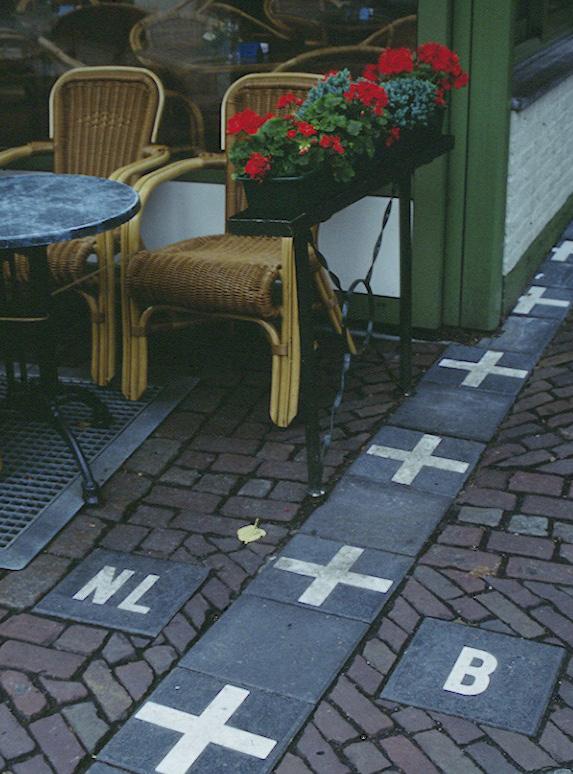 JÉRÔME CC BY-SA 3.0. SOURCE: HTTPS://COMMONS.WIKI MEDIA.ORG/W/INDEX.PHP?CURID=1564073
JÉRÔME CC BY-SA 3.0. SOURCE: HTTPS://COMMONS.WIKI MEDIA.ORG/W/INDEX.PHP?CURID=1564073
My blogging career started with an announcement on ResearchGate that I was considering doing a book deal ing with what by that time I had already dubbed ‘territorialism’, for the first time I seem to remember, in ‘Environment and Planning’. (Faludi 2013)
To say that I was considering it was a bit cheeky: I already had nine chapters in draft form. But I needed to convince myself first that there was another book ‘in me’. You need this kind of reassurance, like when, having seen my lecture notes for my planning theory course at the Oxford Polytechnic, Ray Pahl, Professor of Sociology at the University of Kent at the time – I myself must have been in my early-thirties – had said: Andreas, there is a book in you! He suggested Penguin, but their reply was that this was not the book that the average reader would read on the train from Birmingham to London. Fortunately, Pergamon Press was more accommodating. (See: Faludi 1973)
On and off, that first blog announcing the coming of ‘The Poverty of Territorialism’ (Faludi 2018) was followed by more reporting on progress until, on 11 May, 2018, I could report that the manuscript was with the publisher. From then onwards, I informed readers of my blogs about successive developments until, at the tail end of my last spell as a visiting professor at my alma mater Vienna University of Technology, I could give visual proof of its existence.
My concern from that moment onwards was to get the book with its — so I thought — provocative message reviewed. No complaints about the response! Meanwhile, reviews have come in four languages.
A Review Forum at the 2019 Congress of the Association of European Schools of Planning at Venice more or less started the process. (‘AESOP Round Table on The Poverty of Territorialism’). But by that time, Jacek Zaucha (2018) had already done a review in the Polish journal EUROPA XXI published by the Polish Academy of Science. Still uncertain about how to go about blog ging, I made do with a simple announcement that my waiting eagerly for the first review had not been disappointed with pub lication of his long and thoughtful, and gratefully (very) posi tive comment. Reading it, I was gasping: Jacek had succeeded in summing it all up, referring also to the dilemmas my analysis of territorialism poses, and well in a way which I doubted I could
have done myself! (A few months later, we would celebrate the publication of the volume co-edited by Jacek and my own book at Sopot; see: 'New Horizons’ in the section on Neomedievalism.)
To return to the AESOP Round Table, eventually the three speakers not only submitted their reviews to Regional Studies, they also invited me to respond. (‘Review Forum in Regional Studies’) By the time this had come out, ‘Planning Theory and Practice’ had published, not one but two reviews by Eduardo Medeiros (2019) respectively Rodrigo V. Cardoso (2019). The next one was the, perhaps most searching — and for that mat ter critical — review by another participant of the AESOP Round Table, Jonathan Metzger (2019) in ‘Planning Theory’ followed shortly by Michael Neuman (2020) doing one for European Planning Studies.
This more of less ended the reactions in English-speaking planning journal. Reviews in languages other than English took longer, with Angela D’Orazio (2019) writing in Italian the glaring exception. Later came two in German-language jour nals, ‘Raumforschung und Raumordnung’ by Alois Humer (2020; ‘A German Review’) and one in the ‘Mitteilungen der Österreichischen Geografischen Gesellschaft’ by Peter Weichhart (2020; ‘I Could Not Have Said it Any Better’)
My readers know of my ambition to also absorb to the best of my ability literature in French. Which is why I was pleased about reviews in that language. One is by Yann Richard whom I know from the 2018 Conference of the Collège international des sciences territoriales (CIST) at Rouen. We have corresponded since over publishing an extended French version of the paper I had offered at that conference. (Faludi 2019b) Yann did a review (Richard 2020) summarising my argument in such concise terms that I ventured to translate the gist of it into English. (‘The Future is for the Brave’)
Another review in French by my good friend Jean Peyrony (2021) came too late to receive a mention in my blogs so far. Which should not prevent me from expressing my appreciation for our long-standing exchange of ideas. Actually, these go back to when I started studying European spatial planning and con tinue ever since.
What deserves special mention is a long and thorough essay on my book by Teodor Gyelnik (2019). It has come out in the annual Cross-Border Review of the Central European Service for Cross-border Initiatives (CESCI), a Budapest think tank. (‘Review of ‘The Poverty’ by Budapest Think Tank’) Cross-border cooper ation receives much attention from the Hungarian government, and as far as this is concerned, the EU is very much with her.
What I have been hoping for, so far in vain, is for my delib erate provocations leading to a rethink of European integration. After all, the prevailing territorialism leaves us with only two,
equally unattractive options: Either accept the emasculation of the EU by insisting that member states are supreme, or reduce the role of member states in favour of a strong administration at Brussels: the ‘United States of Europe’ line of thought. Now, since neither is realistic, why not abandon a territorialism that casts the issue in terms of territories and their, purportedly sov ereign governments? Carving up the surface of the earth – and increasingly also the Oceans — into self-contained parcels does not work. So, why not have a fundamental rethink?
The exception to what I call my ‘deliberate provocation’ pro voking no real debate so far is to be found, not in a review but in a brilliant paper co-authored by authors from the Budapest think tank CESCI just mentioned: Teodor Gyelnik and Gyula Ocskay (2021). Jan Zielonka (2018, 115) vouches to his drawing inspiration from ‘‘...intellectuals born in my native part of Europe between Hanover, Vienna and Riga. I have in mind Hannah Arendt, Isaiah Berlin, and Karl Popper.’ It just happens that it is my native part of Europe, too and, low and behold, I have been inspired by at least one of the three, Karl Popper, to be writing in Faludi (1986) neither about Europe nor about territorialism but about planning methodology.
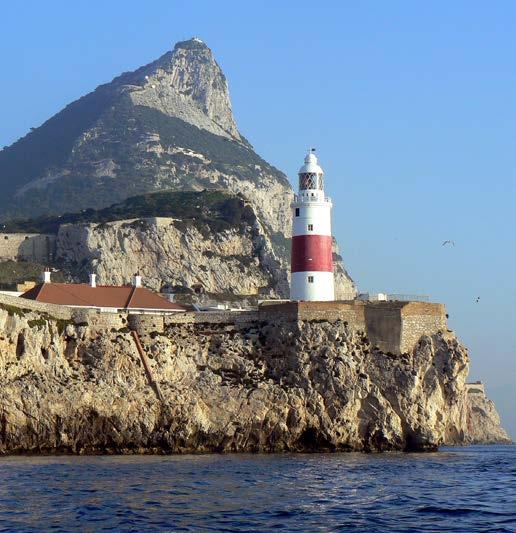
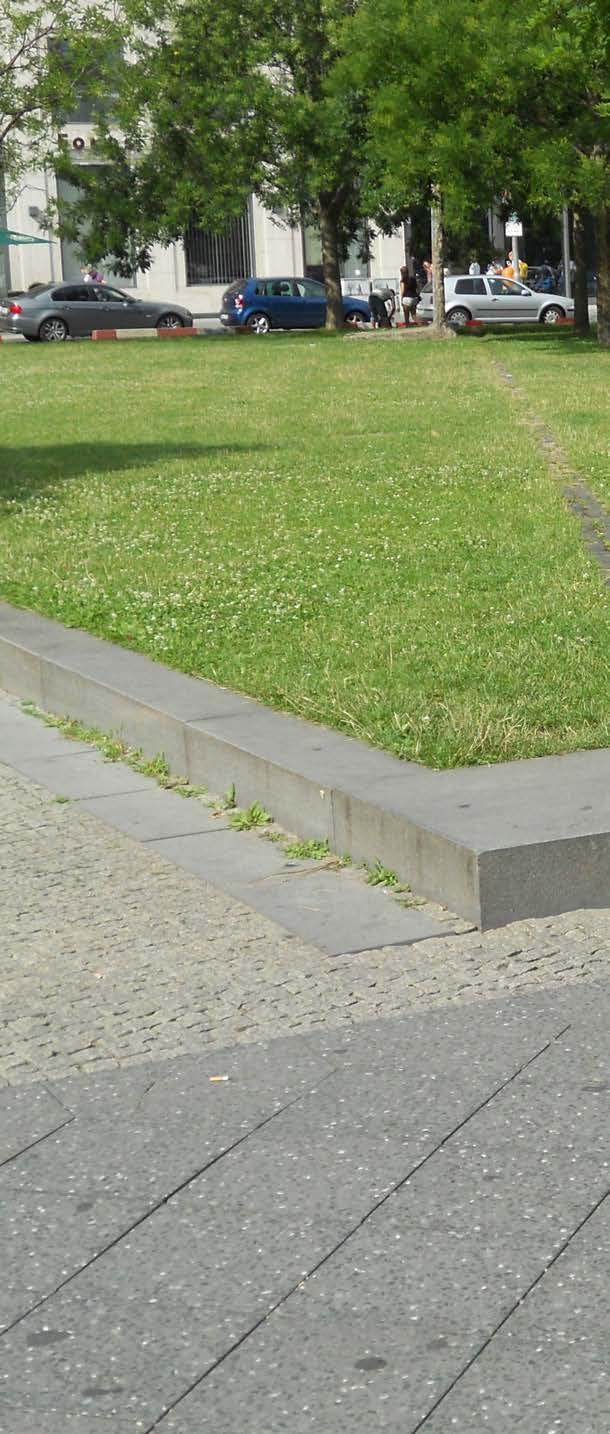
At the Annual Congress of the Association of European Schools of Planning AESOP (Venice, 9 – 13 July, 2019), Giancarlo Cotella (Politecnico di Torino) convened a Round Table on my book. I briefly defined (state) territorialism, making the case for and against, including the part it has in the EU crisis. With Jan Zielonka (2014) I juxtaposed a ‘neo-medieval’ EU to the ‘ever closer Union’ often equated with a superstate. Rather than states filling European space to the rim, I offered three alternatives: states as islands in an archipelago (as per the cover of my book); states as, by their nature unstable ice floats; states floating in a cloud of EU institutions. Each puts paid to claims to the pri mordial right of states to their sovereignty. But I admitted to the production of democratic legitimacy much as practicing spatial planning being problematic under neo-medievalism.
The participants were Jonathan Metzger (KTH Royal Institute of Technology, Stockholm), Eva Purkarthofer (Aalto University, Helsinki), Dominic Stead (Delft Technical University) and Oliver Sykes (Liverpool University). Jonathan pointed out that the book leaves issues concerning the relation between plan ning, democracy and equality unanswered. He identified contem porary capitalism as the elephant in the room. Eva pointed out that, uniquely among academic books, the author’s – mine – life story was interwoven with the argument offered. She pointed out the parallels with a growing interest in the phenomenon of multi-locality. Dominic focused on the concept of meta-govern ance in the book, drawing parallels with recent literature striking a positive note about the possibility of planners exerting their influence through designing networks. Inspired by a visual which I used in my presentation showing a fish trap symbolising ter ritorialism, Olivier drew parallels with Brexit which he thought paradoxical in a UK harbouring English, Scottish, Welsh and Northern Irish nations.
There was also participation from the audience. As an impromptu survey unsurprisingly showed, it was itself witness to the academic planning community being transnational and trans-territorial. But Olivier was quick to point out that in this we were not unique. As he claimed my book also shows, these are features applying in equal measure to the growing number of itinerant workers and migrants of all denominations.

Jonathan Metzger (2019) has published the, so far most challenging review of ‘The Poverty of Territorialism’. No, he is not in the least unfair. In fact he is full of praise to a point which makes me blush. I am particularly grateful that he commends - not as the only one - my interweaving anecdotes of personal experiences and observations with reflections as helpful.
As to the serious business, Jonathan takes me up on my, for the sake of brevity sometimes cavalier use of the work of others. A fair point! I wanted to write a short book and may have cut some corners. Also, I commit the sin - I say this in my own terms - of jumping from observing that the world does not lend itself to being parcelled out into territories to saying, not only that one should not even try, but that, in ‘cutting the cake’ of statehood, planners should actively challenge bordered ter ritories. Invoking the philosopher David Hume on the ‘is-ought’ problem, Jonathan points out that one does not follow from the other. It is decades since I have engaged with such issues, most notable Popper’s philosophy of science (in Faludi 1986). One of Popper’s German followers, Hans Albert has his own take on the ‘is-ought’ problem: ‘Sollen impliziert Können’ (Ought Implies Can). The opposite he posits is also the case: 'Nicht-Können impliziert Nicht-Sollen. (In Kiesewetter, Zenz, eds. 2002, p.63) Which to me suggests that, if carving up the world into self-containedand self-governing - territories is a vain effort, we should give up trying - and actively confront whoever continues to do so.
But, if we reject territorialism and cast doubt also on the production of democratic legitimacy by way of organising elec tions per territory, what is the alternative? As Jonathan fairly states, I have no conclusive answers, nor it seems is there one ready-made available.
Finally, how about the ‘elephant in the book’ (Jonathan’s term) - capitalism? My not talking about it may be due to my ‘lib eral cosmopolitanism’. Am I, then, dangerously close to helping and abetting ‘neo-liberalism’? Once again, his invoking at this point Hardt and Negri (2000) hailed as the heirs apparent of Karl Marx is only fair: I myself have referred to them. But I have disclaimed any ambition or, indeed, ability of saying anything about their work as the Communist Manifesto of our times. If that is a shortcoming, so be it. I have my work cut out for me challenging territorialism.
But let me say this: framing democracy in a particular way, territorialism is no check on capitalism. Citizenship can be bought - is being bought. Parties can be bought - are being bought. Politicians (some of them anyhow) can be bought - are being
bought. And even the honest ones have to play to the gallery of voters vulnerable to being bought themselves. In fact, whole territorial states, small - and even large ones it seems - can fall prey to a rogue capitalist. No, if you want to do something about international capitalism, you must confront it, not within the con fines of the territorial state but in the networks where it blossoms.

Readers of this blog may remember my ‘The Poverty of Territorialism’ having been the object of a forum discussion at the 2019 AESOP conference. Meanwhile, one of the speakers, Jonathan Metzger has done a review of his own. (See ‘Another Review’ just above.) Recently, Regional Studies has also pub lished a Review Forum with the convenor at Venice, Giancarlo Cotella, Eva Purkarthofer and myself exchanging views. (Cotella, Purkarthofer, Faludi 2020) Cotella opens by referring to my source of inspiration in invoking the concept of neo-medievalism, Jan Zielonka, and how this has influenced me in excelling the role of decentralised functional networks. Purkarthofer points out that European spatial planning is shaped, not only by territory, but also by agency. Like Jonathan in his review, she names themes I do not discuss in sufficient depth, or not at all: capitalism, meta-governance and Brexit. And I overemphasise the role of the state at the expense of the good work done by planners on the ground where they move in a fluid space rather than in the nested territories which are the butt of my criticism.
True, and in the ‘Epilogue’ I urge planners to keep up the good work. But the hold of states on their territories hampers them in doing it. Which is also true for European integration generally. This is why Zielonka (2014) and others saying that the future will be ’neo-medieval’ seems hopeful. I the Review Forum, I thus point out that, looked at through neo-medieval lenses, the jumble of overlapping arrangements in the EU, rather than being a sign of weakness, is to be seen as positive. It will be clear, therefore, that the neo-medievalism of the EU is not meant as a criticism.
'Globalization marks daily life, of which this audience needs no reminder. On one hand, the title "The Poverty of Territorialism" rings in synch with globalism, yet on the other, its subtitle "A Neo-Medieval View" seems out of step.'
The above quote is from the recent review of my book by Michael Neuman (2019) of the University of Westminster. It starts and ends with this, what he calls a riddle. Quoting other literature, he points out ―quite rightly― that the claim of the 'poverty' of territorialism is not new. But according to him linking it to spatial planning, and more in particular to European spatial planning is. They need to be remade to better fit an interdepend ent world. I could not have said it any more clearly.
The riddle which this poses, Neuman says, I seek '…to resolve with coalitions of overlapping functional (sectoral) and territorial agencies. While it may reflect actual complexities and interde pendencies, "fuzzy" governance and planning do not suffice. It is unfathomably messy, particularly at the European scale. Rather than ordering, as governing must, it points to chaos…' Which is why Neuman ends his review by saying that '…spatial planning and governing without territoriality is as yet a bridge too far even as cross it'd we must, as Faludi believes. This far-sighted book takes us to the gate.'
How to open it? I think that what we need to look at is what I call ―and Neuman quotes me on this― the production of democratic legitimacy: invariably by territories defined by their borders. But as Popescu (2012, 153) says, as the functions of borders change, the configurations of territories, too, have to be de- and re-territorialised. If so, then the de- and re-territo rialisation of how we 'do' democracy, too, figures prominently on the agenda of reform: no longer by districts, precincts, cities, regions and national territories! But, then, how?
I cannot complain about ‘The Poverty of Territorialism’ (Faludi 2018) not receiving enough attention. More than two years after its publication, there is another review in the French Journal Annales de Géographie by Yann Richard (2021) who has been instrumental also in getting an extended version of my paper given at Rouen in 2018: ‘Au delà du territorialism’ being published in `Les Dossiers des Annales de Droit'. (Faludi 2019b)
After a crisp and accurate summary of my book, Richard points out that the hybridisation of territorial governance which my diagnosis implies means a break with conventional notions of ordering space and spatial development. See below for what Richard himself says in his concluding paragraph about what my signalling this break means to him:
“[It] is painful because it challenges classic representations of political space. [Faludi’s] book highlights several challenges, the difficulties of which he does not seek to deny. To begin with, in order to be able to act in and on a world that is fluid, there is the need for preserving flexible planning methods and tools. Secondly, one must ensure planning to be legitimate, meaning accepted by the target populations. The efficacy of planning thus needs to draw a fine line between democratic requirements and demagogic and populist passions. Thirdly, a non-territorial rep resentation of the EU poses two problems: How to ensure that such a fluid and complex construct impossible to catch in one simple spatial representation is perceived and appropriated by European citizens themselves? How to lay the foundations of a political community and a joint spatial project without invok ing a hierarchical and narrow territorial order? This stimulating and disconcerting book derives from combining geographical research concerning notions of territory and territoriality, those of political scientists concerning multi-level governance and of legal theorists concerning soft law. Perceiving and accepting this break will be no easy thing. As far as this is concerned, Andreas Faludi predicts the need to cross a valley of tears. Ad augusta per angusta. Never having had Latin, I had to look it up myself. For my own rendering of this saying see the title of this blog.
The ’meta-review’ of ‘The Poverty of Territorialism’ by Alois Humer (2020) in Raumforschung und Raumordnung deserves a ‘meta-answer’ starting with observing the coincidence of its being reviewed in a journal once implicated in the Third Reich (Kübler 2007; Mädling, Strubelt eds. 2009) with my father one of its victims. Concerning the review itself, its recounting that my work has been reviewed - thank you very much – extensively in English-language journals provides the occasion for saying thank you to the reviewers, rising stars amongst them. They have undertaken to debate my work when universities expect more tangible ‘output’ relevant for the citation index.
Not the least among them, the author of this one of the Austrian Academy of Science I happen to know since I was a guest at the University of Vienna where he was preparing for his Ph.D. We have kept in touch when he was at Aalto Universitynot the least amongst academic institutions - and from our joint contribution, with Dominic Stead, to a book Alois co-edited. (Fassman, Rauhut, Marques da Costa, Humer eds. 2105) And, yes, I appreciated his being the discussant at the ‘Urban Book Series‘ event in Vienna in December, 2019.
A ‘thank you’ is also due to the journals, ever so concerned about their ranking based on citations, for continuing to publish reviews, including this one of a work that is, reviewers testify, out of the ordinary. More an extended essay, it cocks a snook at the drift towards hefty, multi-authored, sumptuously refer enced volumes.
Alois in this review senses my change of mood as regards ‘European spatial planning’, shorthand for EU members plan ning with - and against! - a Commission trying to knock sense into the development of the EU and its territory, in so doing never being averse to also playing its own power games. Which took me from seeking out whatever opportunities I perceived for mutual learning to identifying a ‘territorialism’ carving up of the land surface of the earth into state realms as a fundamen tal issue. Which implies thinking about - and for the most part rejecting - European integration as forming a federation: territo rialism writ large. Alois duly reports on my trying to think in terms of figures of speech other than an integrated territory: states as island forming an archipelago, states as ice floats drifting in the sea, and the EU as a cloud of overlapping arrangements. With
others, he remains unconvinced but eager to see me working on some realistic alternative to the current discredited, because unrealistic scenario of a united Europe.
With details unbeknown to me, exactly how to articulate this, the reviewer’s wish seems to have been discussed with the journal editor. Now, unlike with a similar promise to myself after ‘Cohesion, Coherence, Cooperation’ related in the ’Preface’ to ‘The Poverty of Territorialism’, I will not break this one: There will be no other book-size fulfilment of Alois’ wish, not from me anyhow.

This one arrived kind of late on my virtual desk but was nonetheless highly welcome: The latest review of ‘The Poverty of Territorialism’ by Teodor Gyelnik of the Central European Service for Cross-border Initiatives (CESCI). CESCI is a Budapest-based think-tank on cross-border issues established in 2009 following the model of the French Mission Opérationnelle Transfrontalière (MOT). Readers should know that I am somewhat loosely con nected, not only to MOT where my long-standing contact in matters of European integration and, I might add, good friend Jean Peyrony is Director-general, but also to CESCI. Not only was I thus allowed to address one of its earlier conferences, I was also kindly invited to participate in the celebration of its 10th anniversary, in either case a welcome opportunity to reconnect with Budapest, the place of my birth which I left at the tender age of six. Finally, I have published a paper in an earlier edition of their CESCI Yearbook (Faludi 2018).
As an aside, one of the first reviews of ’The Poverty’ by Eduardo Medeiros from Lisbon has his own edited volume on European Territorial Cooperation (Medeiros ed. 2018) reviewed in the same volume of the CESCI Yearbook, with its Secretary General Gyula Ocskay (2019) the reviewer.
About the review of mine by Teodor Gyelnik I can be short: Much better versed in some of the background literature than I, he has apparently done all the reading that maybe I should have done to ground my book in social and political theory. Mind you, had I had the grounding in - and the intention of referring to - all of this literature, I would have written a different book than the one I had the ambition of writing. Which makes me the more relieved to learn that I seem not to have misunderstood what I knew about all this literature, and that Gyelnik does not contra dict my understanding of other parts of the background literature which I did take into account. Thank you Teodor!


Andreas Faludi received his PhD from Vienna University of Technology. In the UK he taught and published on planning theory. With a chair at Delft University of Technology, he initiated a English-Dutch comparison. At the University of Amsterdam he researched the success of 20th-cen tury Dutch national spatial planning and the begin nings of European planning, pursuing this further at Radbout University Nijmegen and Delft University of Technology, presently as a guest researcher.
Amongst others, Andreas has published: ‘A Reader in Planning Theory’ and ‘Planning Theory’, both in1973); ‘Rule and Order: Dutch Planning Doctrine in the 20th Century’ with Arnold van der Valk in 1994); ‘No Masterplan: The Making of the European Spatial Development Perspective’ with Bas Waterhout, in 2002; ‘Cohesion, Coherence, Cooperation: European Spatial Planning Coming of Age?’ in 2010; and ‘The Poverty of Territorialism: Towards a Neo-Medieval View of Europe and of European Planning’ in 2018.
International assignments included a Fulbright Scholarship at Berkeley and one at Harvard, Blekinge Institute of Technology, Vienna University of Technology and Vienna University. Blekinge awarded him an honorary doctorate in 2008 and the University of Groningen one in 2014. He is Honorary Member of the Royal Town Planning Institute and the Association of European Schools of Planning. He lives at Delft in the Netherlands.
Roberto Rocco is an Associate Professor of Spatial Planning and Strategy at Bouwkunde, the Faculty of Architecture and the Built Environment of the TU Delft. Roberto is trained as an architect and spatial planner with a master’s in planning by the University of São Paulo, a specialisation in urban management tools by the Ecole d’Urbanisme de Paris (former Institut Français d’Urbanisme) and a Ph.D. by TU Delft.
Roberto specialises on governance for the built environment and social sustainability, as well as issues of governance in regional planning and design. This includes issues of spatial justice as a crucial dimen sion of sustainability transitions.
Roberto has also published extensively about informal urbanisation in the Global South and he does research on how informal institutions influence and shape planning at the local level.
He is a consultant for the Union for the Mediterranean and has recently drafted the UfM Action Plan for Sustainable Urbanisation 2040. https://ufmsecretariat.org/urban-agenda/
 EDITED BY ANDREAS FALUDI & ROBERTO ROCCO
EDITED BY ANDREAS FALUDI & ROBERTO ROCCO
ISBN: 978-94-6366-577-3